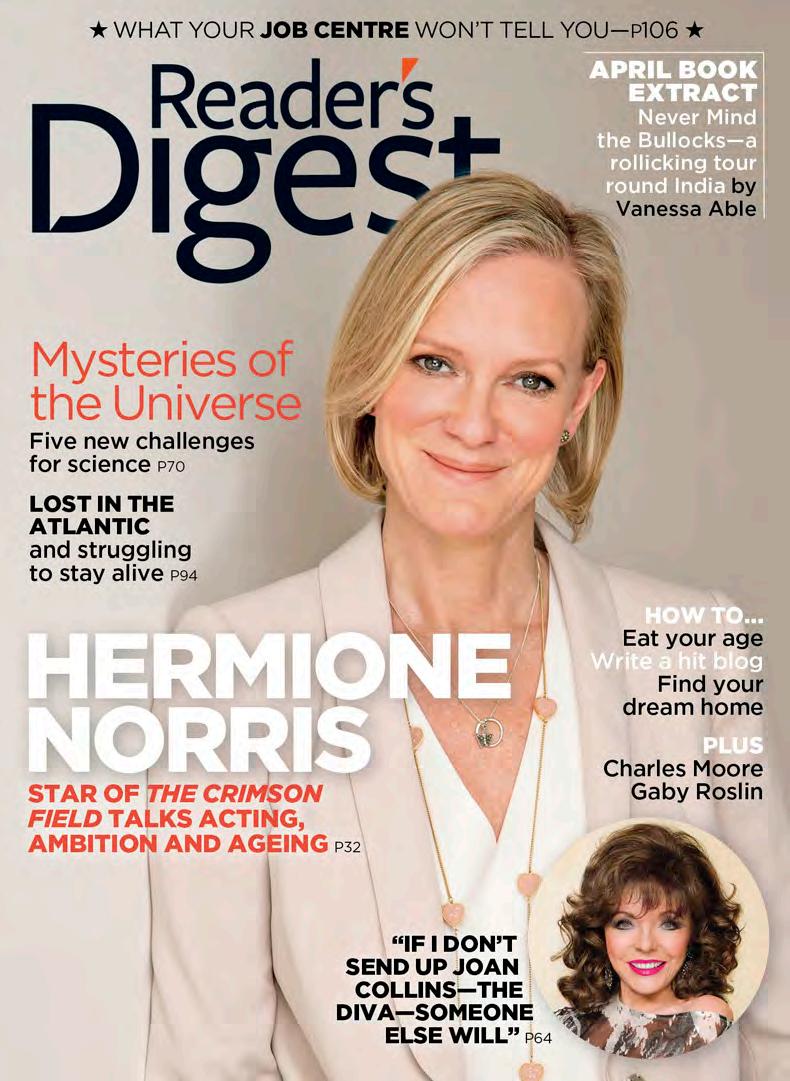







“A dream dreamed in childhood becomes part of who we are,” says author Lennox Morrison. “I was inspired, but also shaken, to hear how Moritz Herrmann risked everything to keep his vision alive.” p94

“We may be getting close to unravelling the universe’s greatest mysteries— one of the biggest goals in science,” says Mark Thompson, co-presenter of BBC2’s Stargazing LIVE. p70

“The record of privatisation of our utilities and public services has ranged from poor to lamentable,” claims journalist Seumas Milne. “The case for new forms of public ownership is now overwhelming.” p76


As a child, I loved to look up at the inky black sky and wonder what went on up there, so I particularly enjoyed reading “Space: What’s Next?” on p70. Here, Stargazing LIVE presenter Mark Thompson sets out the great mysteries of the universe that scientists will be trying to solve in the future—including “What Happens at the Edge of Our Solar System?” Wouldn’t we all like to know the answer to that one! It’s a fascinating read. Talking of fascinating, did you know that the colour red can make us perform badly in tests, or that holding a heavy object can actually affect how we behave? These are just two of the intriguing facts you’ll discover in a feature (on p58) about how our senses can influence behaviour in ways we don’t usually imagine. Amazing. Happy Easter to you all.








Taking its cue from the Hindu religious festival Holi, the Color Run—also known as “the happiest 5K on the planet”—is the latest sporting craze. Runners don white clothes and are doused in different hues of powder at each kilometre, culminating in a rainbow “finish festival”.
The multicoloured run is hitting the UK on June 1, starting in London and going across the country—see thecolorrun.co.uk for dates and locations.
Send us your stories, jokes and letters—if we publish, we pay!
£50 for the star letter and £30 for regular letters.
Email readersletters@readersdigest.co.uk or go to readersdigest.co.uk/contact-us


£50 for the true stories, anecdotes, jokes in Laugh! and You Couldn’t Make It Up…, and contributions to end-ofarticle fillers, Travel and Gardening.
Email excerpts@readersdigest.co.uk or go to readersdigest.co.uk/contact-us
Visit readersdigest.co.uk or write to: Reader’s Digest, PO Box 444, Douglas, Isle of Man IM99 3ZF. UK: £45.48 a year. Republic of Ireland: €61.20 a year. Prices include delivery. For Gift Subscriptions contact Customer Services below
cuStomer ServiceS talking magazineS
Contact Customer Services for renewals, gifts, address changes, payments, account information and all other enquiries. Phone: 0871 351 1000 (Calls from a BT landline will cost 10p a minute. Call costs from other providers may vary.) Email: customer_ service@readersdigest.co.uk
Minicom: 0870 600 1153.
twitter.com/rdigest
Reader’s Digest is available in a talking edition for blind and partially sighted people for £16. For details, phone: 01435 866 102; email: info@ tnauk.org.uk, website: tnauk.org.uk.
facebook.com/readersdigestuk
Ensure submissions are not previously published. Include your name, email, address and daytime phone number with all correspondence. We may edit letters and use them in all print and electronic media. Contributions used become world copyright of Vivat Direct Ltd (t/a Reader’s Digest).
We cannot acknowledge or return unpublished items or unsolicited article-length manuscripts. Do not send SAEs. Article-length stories, poetry and cartoons are not requested.
pinterest.com/readersdigestuk


Fuel consumption figures for Jazz 1.2 i-VTEC S in mpg (l/100km): Urban 42.8 (6.6), Extra Urban 61.4 (4.6), Combined 53.3 (5.3). CO2 emissions: 123g/km. Fuel consumption figures sourced from official EU-regulated laboratory test results, are provided for comparison purposes and may not reflect real-life driving experience.
Model Shown: Jazz 1.2 S Manual in Milano Red Non-Metallic at £10,495 On The Road (OTR). Terms and Conditions:
New retail Jazz 1.2 S registered from 2 January 2014 to 31 March 2014. Subject to model and colour availability.
Offers applicable at participating dealers and are at the promoter’s absolute discretion. The advertised saving of £1,200 (including VAT) discount to the OTR price for the Jazz 1.2 S applied to the retail invoice. Honda Aspirations (PCP): *£140 per month example shown based on Jazz 1.2 S in Milano Red Non-Metallic at £10,995. Total cash price including 5 Year Care Package (and total amount payable) with 37 months 0% APR Representative (interest rate per annum 0% fixed) with £1,795.20 (16%) deposit, Guaranteed Future Value / Optional Final Payment of £4,159.72 annual mileage of 10,000 and excess mileage charge: 3p per mile. You do not have to pay the Final Payment if you return the car at the end of the agreement and you have paid all other amounts due, the vehicle is in good condition and has been serviced in accordance with the Honda service book and the maximum annual mileage has not been exceeded. Indemnities may be required in certain circumstances. Finance is only available to persons aged 18 or over, subject to status. All figures are correct at time of publication but may be subject to change. Credit provided by Honda Finance Europe Plc. 470 London Road, Slough, Berkshire SL3 8QY. The 5 Year Care Package includes: Servicing: All scheduled servicing, as detailed in the vehicles service book, will be covered for 5 years or 62,500 miles, whichever comes first. Warranty: In addition to the standard 3 year warranty the customer will receive a complimentary 2 year extended guarantee taking the warranty to 5 years or 90,000 miles, whichever comes first. Roadside Assist: In addition to the standard 3 years roadside assistance package the customer will receive complimentary Hondacare Assistance for a further 2 years, taking it to 5 years or 90,000 miles, whichever comes first. The 5 Year Care Package: The 5 Year Care Package is optional. It is being offered for £500 including VAT (usual value £1,545 including VAT) and is available to finance or non-finance customers. Please note, should you sell the vehicle during the period of cover, the package remains with the vehicle.
Fancy a bit of a challenge while having a whole lot of fun? We’ve teamed up with goodgame Studios to host empire and Big Farm on our website, two of the most enthralling online strategy games around. Visit readersdigest.co.uk/ fun-games/interactivegames to get started (you won’t want to stop!). And don’t forget you can also win £100 in our legendary online Word Power game.


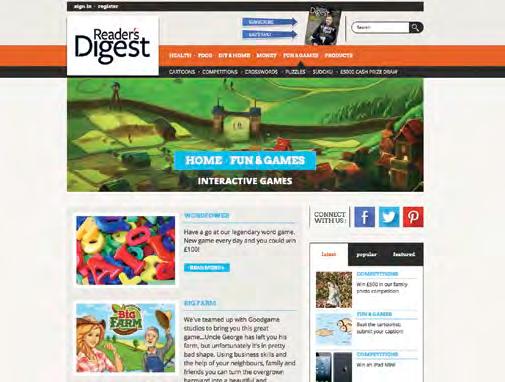
check out our fabulous apps! go to the app store, iTunes music store, google Play store and amazon to
our magazine apps onto your iPad,

















Finding The One, ge ing promoted, watching my grandchildren grow.
Immerse yourself in a subject you’re really passionate about by studying for an Open University degree. We’ve courses in everything from art history and philosophy to languages and music, all designed to make your learning an enjoyable and rewarding experience. Study at your own pace, wherever and whenever you like. And get lots of support from dedicated tutors and many like-minded students you’ll meet along the way. Thousands of people have already realised their passions by studying with The Open University. Isn’t it about time you started the next great thing in your life?
Immerse yourself in a subject you’re really passionate about by studying for an Open University degree. We’ve courses in everything from art history and philosophy to languages and music, all designed to make your learning an enjoyable and rewarding experience. Study at your own pace, wherever and whenever you like. And get lots of support from dedicated tutors and many like-minded students you’ll meet along the way. Thousands of people have already realised their passions by studying with The Open University.
Isn’t it about time you started the next great thing in your life?
Bring your passion for learning to life.
Bring your passion for learning to life.
Call 0845 450 5473 or visit
Call 0845 450 5473 or visit
www.openuniversity.co.uk /yourtime
www.openuniversity.co.uk /yourtime

Art



£30 FoR eAch PublisheD letteR, £50 FoR the letteR oF the moNth! see P8 FoR moRe DetAils
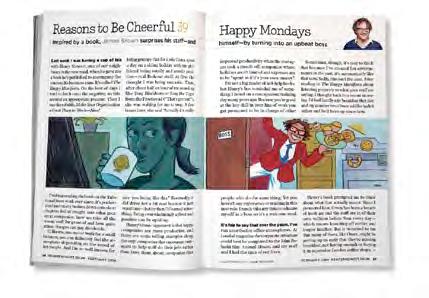

I was amused by James Brown’s discovery of The Happy Manifesto by Henry Stewart in “Reasons to Be Cheerful, Part 39”. It’s a shame the book wasn’t around when I was working—it would have helped me with regard to having Happy Mondays.
I used to handle Monday mornings by being deliberately upbeat, so that those working for me couldn’t predict my real mood. Asking all my colleagues how they spent their weekends helped me no end, especially with regard to productivity. As the week progressed to Friday afternoon, staff morale was humorous. “Tomorrow is Poet’s Day,” one said, which I was told meant “Push Off Earlier, Tomorrow’s Saturday.”
Education for the boss indeed!
Alan Andrews, Paignton, Devon
“It’s time for the Queen to abdicate,” says Christopher Lee in his Maverick feature—but I don’t agree. I travel the world, and one of the most admired and revered institutions in Britain is the monarchy. Until the sad day when the Queen’s death removes her from office, there’s no need for her to abdicate.
Alexis Poole, Flintshire
Your Maverick article provoked an animated family discussion. The overall consensus among us was that the Queen is out of touch and should have retired years ago. At least Charles has an idea what the people want and isn’t shy at speaking out against injustice.
Ryan Roberts, North Wales a taste for travel
I enjoyed Steve Punt’s “If I Ruled the World”, especially his opinion that British holidaymakers should only be allowed back into the country if they’d tried at least one food that wasn’t pizza.
You can learn a lot about a country by eating the way the locals eat. Like language,

abilo @syabilomilo

reader’s digest is filled with lots of interesting stories. If only I’d realised this past ten years!
fashion or music, food is a way people express their culture, and local cuisine is one of the most exciting things about travel. Jenna simmonds, london
I enjoyed reading the examples of romantic letters in “Sealed with a Kiss”. My most memorable love letter came when I was 17. My favourite part read: “I’m not sure when I began liking you. It crept up on me, like dry rot.”
It was certainly original, if not quite as charming as I’d hoped… Abigail Watkins, Derbyshire
Even in this internet age, nothing beats opening a personal letter, especially a letter from someone you love professing their love for you. Instant messaging is killing this off, which is such a shame. hazel lewis, merseyside
“What’s New in Heart Health?” showed that doctors can prevent cardiac disease by studying hereditary factors. But there’s a poignant connection with “Best of British: Statues”. Rosalind Franklin—whose bust (pictured) can be seen in Newnham College,

Cambridge—was a scientist whose X-ray photograph of DNA led to Francis Crick and James Watson deducing its structure and thus how it passes on genetic information. Sadly, she died before she could be awarded the Nobel Prize.
John samson, edinburgh
I drive on the country lanes of the Lake District on a daily basis, and I’m constantly struck by the poor manners of cyclists riding two abreast or more, oblivious to the motorists queuing up behind them. I’m not asking much by expecting them to move over to the left in single file, to allow motorists to pass by safely. christine Walker, cumbria
Your Money article on the credits available to pensioners was good —but more needed to be said about funeral payments.
“nothing beats opening a Letter froM soMeone you Love”
I had to examine ideas for help when my father died. One avenue was my husband’s pension credit, but it was clear that any payment would be a loan, to be paid back after my father’s estate was realised. Also, it could take six weeks to process my application. The funeral director required a large down payment before discussing the arrangements, and full payment was due within four weeks of the service. At a
time of stress, this uncertainty added to the nightmare.
olwen Walton, chepstowAfter years of trying, I’ve finally become a Word Power Wizard, scoring 15 out of 15. There are
“What’s the kindest thing anyone’s ever done for you?” we asked. Your response was heartwarming—here are some of our favourite stories:
My partner suffered a massive stroke, which “locked” him in for the rest of his life. The morning it happened, I was in total shock, grief and pain. I found myself waiting at the hospital alone, with no family around me. As I sat there, numb and afraid, his sister and her husband arrived. His sister came straight over and said, “I’m here for my brother, but you need a sister.” I’ll never forget that act of kindness and thoughtfulness.
Judith Glover, WolverhamptonWhen I was a teenager, I suffered badly from cold feet during the winter—the lower part of my legs would turn scarlet. My boyfriend felt so sorry for me that he bought me a pair of suede, fur-lined boots. I was completely taken aback, as no one had ever bought me such an expensive present. After 54 years of marriage, he’s still the most caring person in my life. isobel Duffy, North lanarkshire
usually two or three where I make educated guesses. Occasionally I was “getting there”; usually I was “impressive”. But this month when I turned the page, checked the answers and confirmed my title, it was a fabulous feeling!
Patricia smith, Northumberland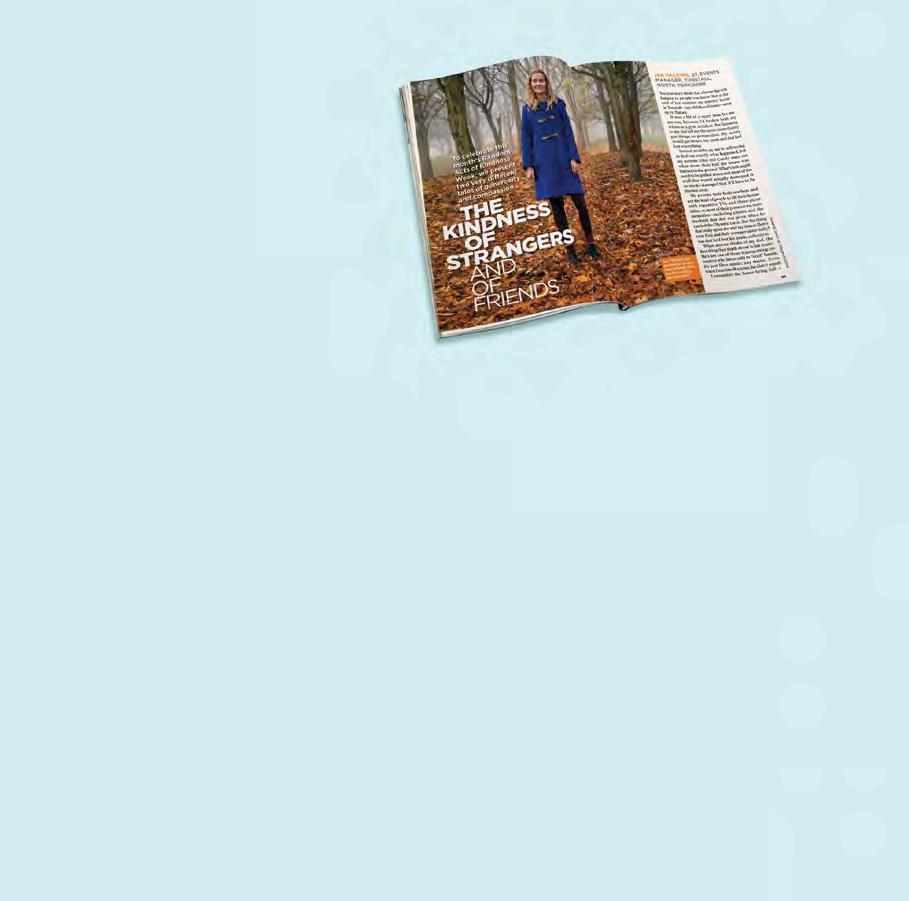
I was walking in the countryside with my husband when I slipped and broke my wrist. We struggled 100 yards to an isolated house, where a lady suggested her son drive us to the hospital eight miles away. The young man drove carefully with consideration for my painful arm, dropped off my husband to pick up his car, then delivered me to the hospital entrance. On top of that, he wouldn’t take any reward.
Pat briggs, somersetWhen my daughter was diagnosed with cancer, a work colleague made a collection for our family to have a “memory”. We were overwhelmed by the generosity of the staff. My daughter chose a day at the coast, with fish ’n’ chips for lunch.
Pauline southerden, Kent








r a d ar
Big Budget: Noah The Biblical story of Noah’s Ark gets the big-budget treatment, courtesy of Black Swan director Darren Aronofsky and an impressive cast—Russell Crowe as the title character, with Jennifer Connelly, Anthony Hopkins and Emma Watson also getting wet.
RomanCe: The Love Punch Pierce Brosnan revealed a hidden talent for romantic comedy with last year’s Love Is All You Need, and this pairing, with national treasure Emma Thompson,

in the eye of the storm: Russell Crowe as noah

is an even more attractive prospect. It follows the fortunes of a divorced couple trying to recover stolen money.
Comedy: The Double British comedian
Richard Ayoade was the filmmaker behind the quirky lowbudget comedy Submarine in 2010, and now comes this adaptation of Dostoyevsky’s novella, featuring the always-wonderful Jesse Eisenberg as a man whose life is usurped by a doppelganger.
your short, sharp guide to april ►

animation: Rio 2 A lovable follow up to the hit 2011 animation from the studio responsible for the Ice Age franchise, about a family of domesticated macaws who go on an eventful journey through the Amazon rainforest.


Welcome to the jungle: the gunderson family in Rio 2
dRama: Locke Tom Hardy made his big-screen breakthrough as the villainous Bane in 2012’s The Dark Knight Rises, but he’s on more restrained form in this low-key British thriller about a man whose life unravels as the result of a single phone call. Olivia Coleman and Ruth Wilson co-star.
tv highlights

Look out for Mad Men Season 7 and Game of Thrones Series 4 (both on Sky Atlantic) reader radar
Keiron mcgrath, works planner
our pick of the dvds
The Hobbit: The Desolation of Smaug
The second instalment of Peter Jackson’s trilogy sees Bilbo’s arrival at the dragon Smaug’s lair.

Watching: The Voice (BBC1)
This is a guilty pleasure, but all the contestants can sing and the initial choices by the judges are based on gut instinct, which can be surprising or disappointing.
Reading: The Sentinel by mark oldfield An interwoven narrative about Franco’s Spain set in the
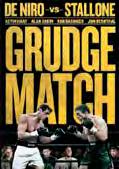
Grudge Match
Robert De Niro and Sylvester Stallone share the screen as ageing boxers stepping into the ring to slug it out one last time.
past and present—the type of novel I really enjoy.
online: bbc.co.uk/sport Handy for keeping up with all the latest sporting developments.
Listening: “aerodynamic” by daft Punk Music often reflects my mood, and this is one of the top five tunes on my iPod.

also on our radar…
April 5–20
edinburgh international Science Festival
April 13 London marathon
April 19–May 5
the Betfair World Snooker Championship, The Crucible, Sheffield
April 29
the Wellcome Book Prize announced The Wellcome Trust, London technology expert, BBC 5 Live presenter and Answer Me This! podcaster olly mann reveals the latest must-haves
LifeStraw go, £39.99 The recent floods deluging parts of Britain have renewed interest in some outdoorsy gadgets such as wind-up radios and solar-powered chargers. Add LifeStraw Go to that list. This cup can be dipped into any mucky, unpurified water source and instantly converts it into clean drinking water, filtering out 99.9999% of water-borne bacteria. Worth keeping under the kitchen sink, even if you hope never to use it.
Hum for iPhone, £1.49 Whether you’re a professional musician, pub singer or write songs as a hobby, you’ll wonder how you ever lived without this app. No more scribbling lyrics in the margins of magazines! No more singing random riffs

Revolights City Wheels, £399 Cyclists: improve your road safety by integrating this LED lighting system into your wheels. Forward light projection and 360-degree visibility will be all yours—and you’ll look like something from Starlight Express. and check out…


into your own voicemail because you’ve left your dictaphone at home! Hum lets you note down lyrics and record melodies in one cleanly designed destination and then access them chronologically by title— or even by the key the tunes are written in.

misfit Shine, £99 Yet another fitness activity monitor you wear on your wrist? Yes, but this one’s waterproof, so it monitors swimming as well as walking and running, and only needs to be charged every four months. Slick. n
¶ After leAving my job, i wAs AmAzed to hear that one of my old colleagues, Alan, had been spotted with a new girlfriend. Alan had never shown any interest in romance, so this was big news. A mutual friend said the girl was very nice and chatty, but the more she spoke the more she reminded him of a horse—big teeth, long face, wide nostrils. “I expected her tail to start swishing,” he said.
I decided to visit my old workplace for more details. The following day, I found myself sipping coffee with my ex-colleagues and my replacement. Alan was called away to take a phone call, so I seized the chance to ask about the new girlfriend.
“Yes, it’s true,” said one, so I launched into a full repeat of the horse description, grinning merrily.
A silence fell and faces became serious. Then my replacement looked into my eyes and said, “It’s me.”
I never went back—and I wasn’t invited to their wedding. Idris Davies, Carmarthenshire

“so
¶ My GP noticed I had several moles spread over much of my body. He advised having them removed, so I booked into the local cottage hospital.
After being shown into a room, I stripped and lay back on a trolley. A nurse came in 20 minutes later and removed instruments from the steriliser. She then used the boiling water to make coffee and threw open the door, shouting, “Coffee’s up, everybody!”
A crowd filed into the room. Thinking, It’s a hospital—they’re used to this even if I’m not, I was startled when someone said, “Oh, it’s Graham, isn’t it?”
Embarrassed, I stammered, “Yes.” Then she announced, “You don’t know who I am, do you? I’m your next-door neighbour Shirley’s sister!”
Graham Cooke, Cornwall
¶ Our two-year-old finished his tea and got up from the table. Hoping to encourage good manners, my husband prompted, “Josh—thank you for my tea, please may I leave the table?”
Josh looked over his shoulder as he walked away and said, “You may!”
Rachel Haley, West Yorkshire
¶ Preparing to make a Kashmiri butter chicken dish for guests, I went to my local
supermarket to get the ingredients I needed.
I managed to find everything except for the flaked almonds, so I asked one of the assistants whether they had any in the store.
“I’m afraid they’ve been recalled,” he said.
“Why, what’s wrong with them?” I asked.
“They were found to contain traces of nuts,” he replied—with a totally straight face.
Nicky Moffatt, Wiltshire
¶ A few years ago, when fox hunting was still legal, we were driving along a minor road and saw a full-scale hunt coming towards us.
We stopped to let them pass and then drove on. Imagine our surprise when we almost immediately met a fox trotting down the road behind the hunt.
Stephen Ramsden, Bedfordshire
¶ My two grandsons came to stay one weekend and we walked into town, did some shopping,
¶ we were hAving A walk-in shower fitted in our bathroom. I needed to spend a penny while the work was going on, so I popped my head round the bathroom door

“Username and password, please”
Win £50 for your true, funny stories. go to readers digest.co.uk/ contact-us or facebook. com/readers digestuk
to ask the plumber if it would be all right to use the toilet.
had some lunch and then walked home again.
I usually have 40 winks after lunch, so I fell asleep in my chair. Having never seen anyone sleeping at midday before, my grandson Lewis shook me gently and said in an extremely serious voice, “Granny, are you sleeping or are you dead?”
May Mitchell, Fife
He wasn’t there, and I couldn’t find him anywhere. By this time I was getting desperate, so I dived into
the bathroom and was just about to sit down when a loud, deep male voice from under the floorboards called out, “Whoa!”
I departed red-faced. Barbara Cutting, by email ■
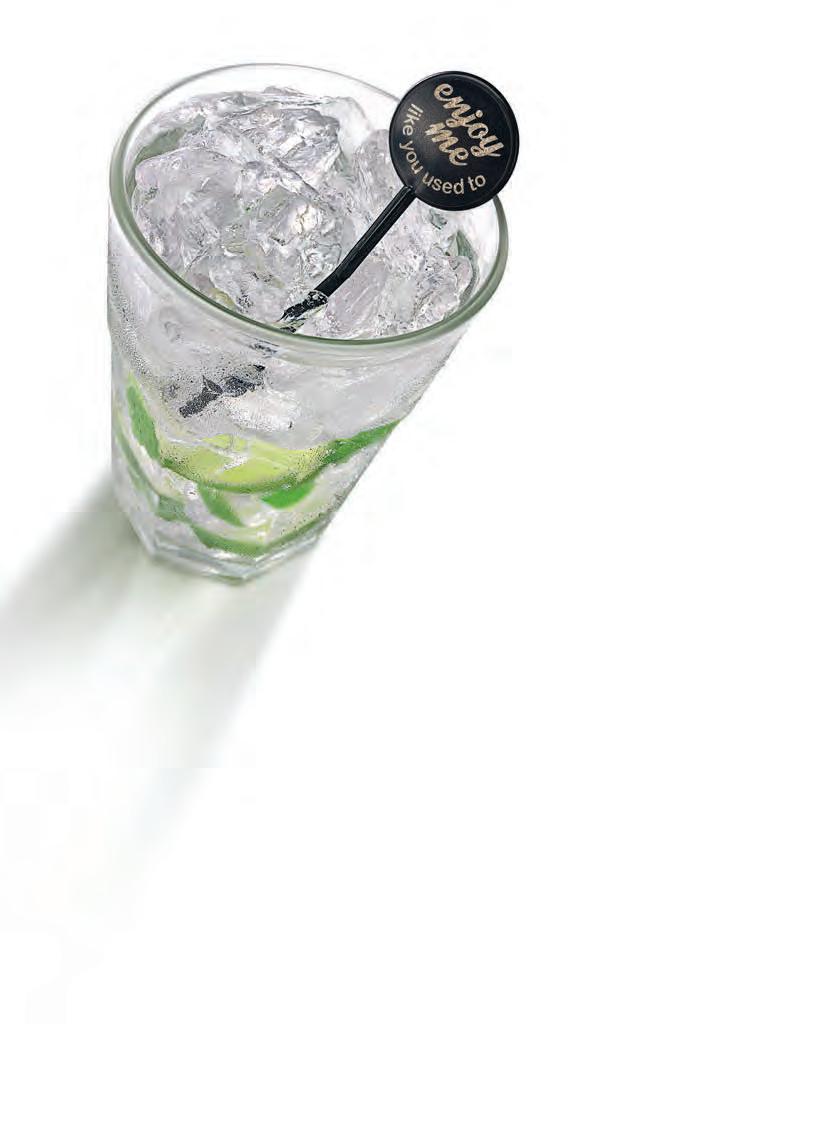


The letter A is so much more than a header for April and the alphabet’s leader—it’s also a music note, a blood type, a mark of excellence and even a stardom vehicle for Mr T. In its honour, this month is devoted to words whose only vowel is A. Choose the correct meaning from the three options below.
1 annals n
A catacombs B chronicles
C long johns
2 arcana n
A rainbow B mysterious or specialised knowledge
C travel journal
A rather sweet word that’s gradually creeping into social media. It’s used to describe a man admired purely for his fatherly qualities, rather than for his good looks or charm.
RD Rating: Useful? 6/10 Likeable? 9/10
3 banal adj
A disallowed
B uptight
C trite or unoriginal
4 masala n
A wine B spice blend
C Italian antipasto
5 lama n
A beast of burden
B heroic escape
C priest or monk
6 paschal adj
A of computer languages
B in a Gothic style
C relating to Easter
7 bazaar n
A weird event
B wailing siren
C marketplace
8 amalgam n
A mixture
B volcanic rock
C back of the throat
9 plantar adj
A vegetative
B paved with asphalt
C of the sole of the foot
10 catamaran n
A Bengal tiger
B black olive
C boat with two hulls
11 balaclava n
A knitted hat
B Greek pastry
C Russian mandolin
12 avatar n
A mythological sibling
B incarnation of a god
C computer language
13 spartan adj
A desertlike
B marked by lack of luxury
C of Classical theatre
14 allay v
A to refuse B take sides
C calm
15 lambda n
A Greek letter
B Brazilian dance
C degree
Words by Emily Cox and Henry Rathvon9–11 getting there
12–13 impressive 14–15 word-power wizard!
1 annals B
chronicles. “In the annals of sports idiocy, that was the worst tackle I’ve ever seen.” Latin annus (year).
2 arcana B
mysterious or specialised knowledge. “I’d rather not know all the deep arcana of your research.” Latin arcanus (arcane).
3 banal C
trite or unoriginal. “When I say something banal, Dorothy rolls her eyes.” French (relating to compulsory, feudal service, hence “common to all”).
4 masala B Spice blend. “Go easy on the masala—Sarah doesn’t like spicy dishes.” Arabic masalih (ingredients).
5 lama C priest or monk. “Even the Dalai Lama has a website.” Tibetan bla ma (the b is silent) (superior one).
6 paschal C relating to Easter. “Ruth spent many hours on her paschal bonnet.”
Hebrew Pesach.
7 bazaar C marketplace. “During her hunt at the bazaar, Sally found a compass that had
Why addict?
Addictus is the Latin word for “slave”—in Roman law, this referred to debtors awarded as slaves to their creditors, and also to slaves given to Roman soldiers who performed well in battle. Over time, addict came to refer to a person who was a slave to anyone or anything, as in the modern usage of being dependent on a habit-forming substance.
belonged to her greatgrandfather.” Persian.
8 amalgam A mixture. “Our team is an amalgam of youth and experience.” Greek malagma (soft mass).
9 plantar C of the sole of the foot. “Holmes carefully studied the plantar prints.” Latin. 10 catamaran C boat with two hulls. “Jack’s boat won the annual catamaran race.” Tamil kattumaram (tied wood).

12 avatar B incarnation of a god. “In Hindu mythology, Rama is the seventh avatar of the god Vishnu.” Sanskrit avatra (descent, of a deity from heaven).
13 spartan B marked by lack of luxury. “We didn’t expect such spartan conditions in the honeymoon suite.” In Ancient Greece, the Spartans were held to be indifferent to comfort.
11 balaclava A knitted hat. “Leave your balaclava in the hall and grab some stew.” Worn by soldiers in the Crimean War (1853–1856) and named after a village there.
14 allay C calm. “The board meeting was intended to allay our fears.” Old English lecgan (to lay down).
15 lambda A Greek letter, the eleventh of the Greek alphabet. n
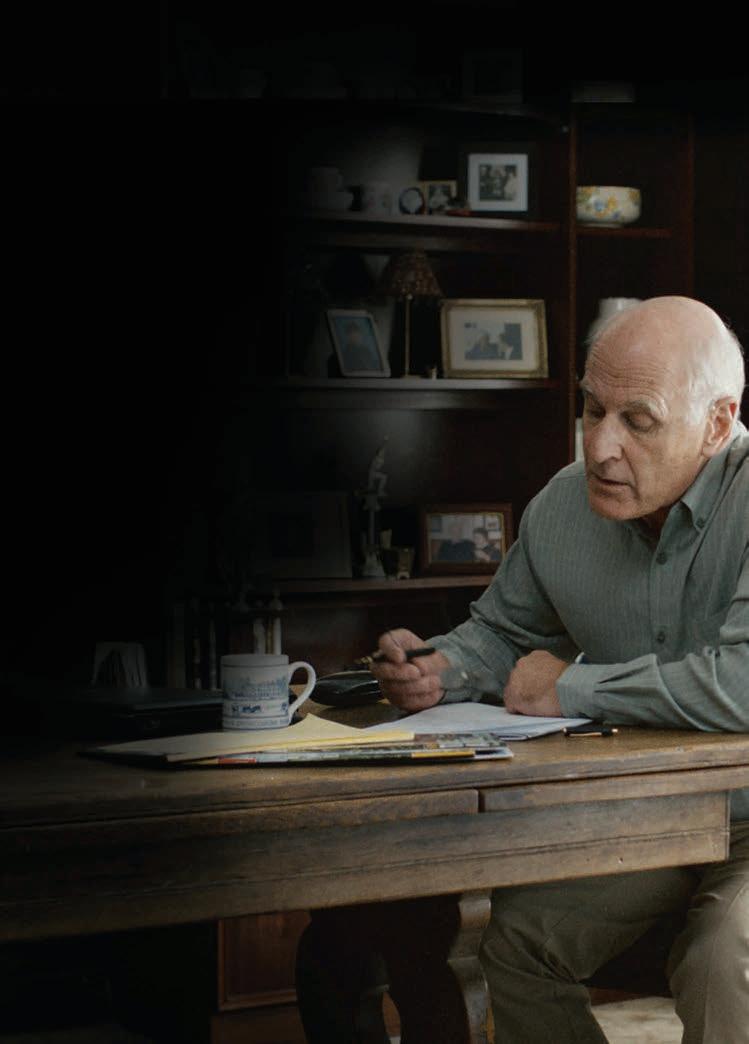


Charles Moore is the former editor of the Daily Telegraph, the Sunday Telegraph and the Spectator. He continues to write for both the Daily Telegraph and the Spectator. In 1997 Margaret Thatcher chose him to write her official biography, which will be in two volumes.
The first thing I’d do is abdicate. imagine being able to do whatever you like and take revenge on all the people who’ve made you cross—it’s a nightmarish thought and would bring out the worst in anyone. the world is only fun because nobody has absolute power and all the competing cultures, governments, religions and everything else are the very things that make our lives rich and the world interesting.
but if i were forced to consider the positive things i might do, they’d include the following:
I’d decommission and destroy all onshore wind turbines. they’re monuments to human folly, built on a theory rather than a reality.
of course, the drive towards cleaner energy is a positive one—but wind turbines are destroying the very environment they purport to be saving. the energy consumed in the act of putting them up is huge, they’re not capable of putting out the energy required and their ugliness is ruining great tracts of our countryside.


I’d re-think our attitudes to children, and challenge the idea that we’re doing a wonderful job as parents. We’re a very child-orientated age in our rhetoric, but i believe that one day we’ll be seen as having had children’s interests on our lips but not in our hearts. What is the most important thing to a child? their affinity with their natural parents. children should grow up with both parents in their lives. We seem to have devised a whole series of acceptable movements which diminish that responsibility. Why, for instance, do we have an obsession with state-funded nurseries from a younger and younger age? and the stigma against
absent fathers is surprisingly low. in the past it was considered truly shocking to leave your wife and children because it condemned them to a life of poverty and disgrace. the great myths and dramas of the past often centred on the key loss of a parent and the devastating consequences.
We should think about what matters most to our children and find ways to help keep parents beside their offspring as they grow up.
I’d ban all visible wording on clothing unless it has a function—“Police” or “Paramedic” being obvious examples. but i don’t want slogans or brand advertising passing me on people’s clothes as i walk along. it’s a form of shouting at the world and it’s exhausting. We have far too many messages thrown at us all the time from other sources.
Everyone in public service would have to read Shakespeare and/or the King James Bible and then pass a test on them. that way, all the people in my world government would have a greater understanding of language, be better able to communicate—and actually say what they mean. When i was looking at internal communications in the thatcher government, i found they were brilliantly clear and exact in their english. nowadays “buzz words” are the curse of the civil service and corporate life—it’s hard to understand the nub of what is being said on all the emails flying around offices.
“Wind turbines are destroying the very environment they purport to be saving”
I’d abolish the BBC licence fee. it’s outdated—it’s not reasonable to tax people for a service that they might not want to use. fifteen per cent of all court appearances in britain relate to unpaid tV licences. i saw the queues outside the court myself when i refused to pay my licence fee. it’s a massive waste of money and resources. better to break up the bbc and give people the option to subscribe to the parts they actually listen to or watch.
I’d embrace the dark. it’s strange how much energy is wasted on unnecessary lighting: office buildings with lights left on all night; villages with street lighting; night lights on farm buildings. you can barely find total darkness in the whole of southern england now, with the glow from our towns polluting the sky. When you go further north and discover real dark, you realise how comforting and enveloping the velvet quality of darkness can be. i’d like people to be able to appreciate that each night is beautifully different as the moon changes—sometimes the sky is inky black, sometimes almost bright. let there be dark. ■ As told to Caroline Hutton
Margaret Thatcher the Authorized Biography, Volume One: Not For Turning by Charles Moore is published in paperback this month (£12.99).
James Brown discovers that you can live in an area for a
A lot of people don’t like the number of tourists in London—but I recently found myself thanking them for opening my eyes.
Over the last 30 years, I’ve had three different jobs in the same smallish street in Blackfriars, all of which have allowed me to walk some of the way to work by the Thames. As I’ve strolled westwards from London Bridge, along the winding
away; it’s also the array of internationally coloured Puffa jackets and good-looking overcoats. Even at 10am on a cold Saturday morning, there isn’t a single weatherrelated moan or a cold-looking person. They can’t be British.
Seeing so many of them enthralled by all the sights has made me stop and think. Maybe I should look at the area through the eyes of a tourist, in much the same

streets and pathways that cut in and along the river’s edge, I’ve been amazed by how many more people there are compared to 25 years ago.
Coming in the opposite direction from the London Eye at Westminster—along the South Bank, past the enormous Tate Modern and the Globe, and on to Borough Market—is a tide of international visitors marvelling at everything on offer. It’s not only the accents that give them
way as I looked across the rooftops of Paris in awe when a Ferris wheel stopped for a long time with my girlfriend and me at the top. Or the curiosity and excitement I felt going behind the Berlin Wall when I was 18.
I’ve seen the tourist’s look of exhilaration before, in the eyes of Japanese students traipsing across the moors above Howarth, Yorkshire, following signposts in their own language to Top Withens,
long time without ever really knowing it

the inspiration for Emily Brontë’s Wuthering Heights. And it can be infectious— to realise you’re surrounded by things people travel thousands of miles to encounter first-hand. Things you’ve spent decades taking for granted.
So lately I’ve found myself hanging over the river wall looking at the remains of old wooden docks, and across the
covered it in broken mirrors. Aside from the 20th-century warship, it felt like another period in history.
I’ve started going down towards the South Bank when I’m not on my way to work, and venturing into the places on offer. I‘ve seen four Buster Keaton films and a brilliant French thriller from the jazz era at what used to be called the NFT under Waterloo Bridge. I’ve walked

expanse of water at the modernised warehouses on the north side, imagining what it would have been like when the Thames was London’s major thoroughfare.
I’ve also noticed that the view looking east from London Bridge towards Tower Bridge is never the same. Last week, it was so strangely grey and misty that the Shard, Europe’s tallest building, was hidden by cloud. There was so little colour that the river looked as if someone had
into the Tate Modern and looked at the retrospective of Richard Hamilton, the man who coined the phrase “pop art”. I’ve actually begun to take advantage of these familiar places.
It was only when I read Promised Land by Anthony Clavane, about being a young Jewish boy supporting Leeds United in the 1970s, that I learned anything about some of the magnificent buildings in the city in which I grew up. I’ve never
There’s always somewhere you’ve known about but not really looked at properly for years
looked at them in the same way since. It doesn’t matter where you live or where you are; there’s always somewhere within short driving or walking distance that you’ve known about but not really looked at properly for years. And the wonder of the internet can now give you the background to that rocky outcrop, bridge or bear pit you last visited on a school trip. I know the landscape might not seem quite so packed with historic opportunity if you live in Scunthorpe or Swindon, but I’d bet your local touristboard worker would beg to differ.
I feel like something has changed in my perspective—I’m looking forward to visiting cities and countryside I’ve been going to for ages, so I can examine them as if for the first time. On the other hand, I’ve got to make sure I don’t come back with masses of tourist-targeted souvenir clutter… n
James, founder of Loaded magazine, now edits Sabotage Times—an online magazine with the motto: “We can’t concentrate, why should you?” Follow James on Twitter @jamesjamesbrown
This touching tale was one of thousands submitted to our 100-Word Story Competition. We’ll be featuring a commended story in the magazine every month. Look out for the winners of this year’s contest in our next issue.

Submitted by Mandy Huggins, West Yorkshire
Outside the bar, snow is falling in fronded flakes. Alice throws back her head, and they melt on her tongue like communion wafers. But the body of Christ can’t save her, only the blood of Christ, which they drink to forget that their child is gone.
As Carl drives home, their song plays on the radio. He stops the truck, steps out, opens her door and holds out his hand. She falls forward onto the weight of him; breathes in his mossy scent. He sings into her snowveiled hair and they dance. Because when they dance, the pain pauses.
Mandy says: “My inspiration came from an image that lingered after I read about a couple who’d argued on the way home from a night out. Their song came on the radio and he stopped their pick-up at the edge of a wood and persuaded her to dance in the light of the headlamps. It made me think about the extraordinary restorative power of music and dancing, and whether it could help overcome the deepest pain.”
Mandy will receive a cheque for £50
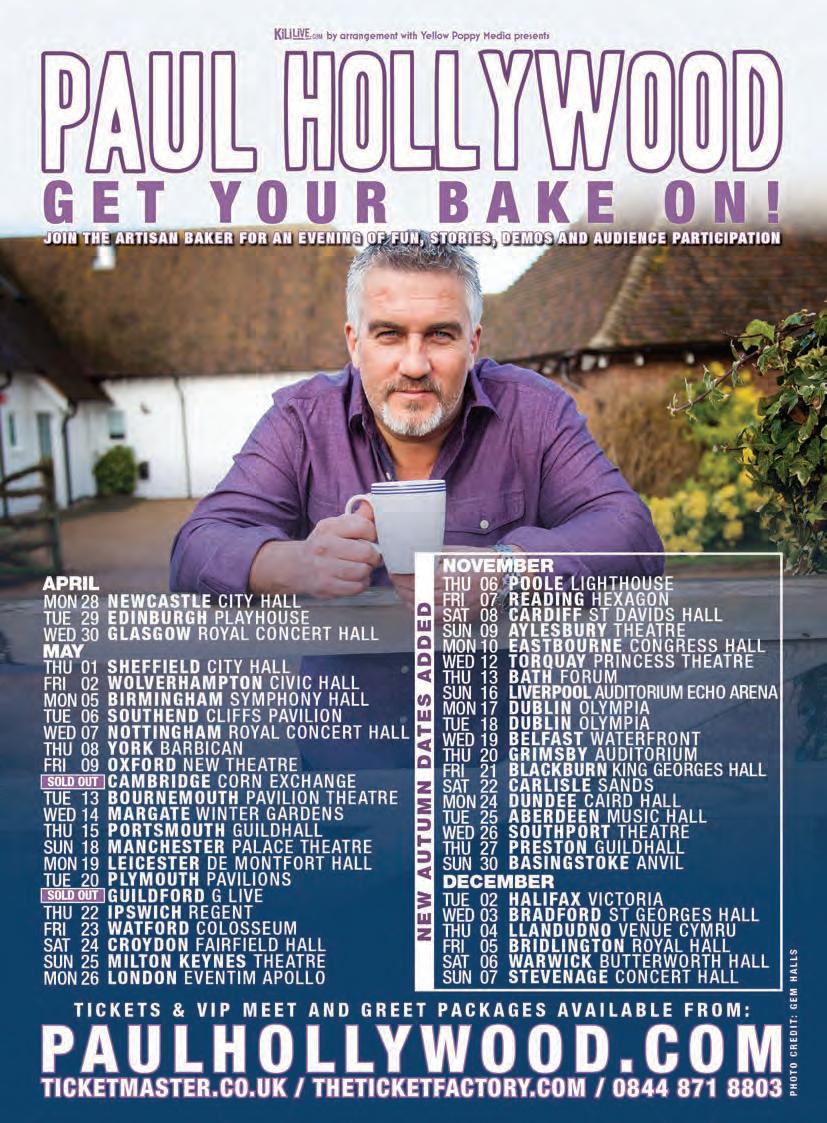
How playing a nurse in new BBC drama The Crimson Field made Hermione Norris realise she’d be an “absolute disaster” on a real ward
Although Hermione Norris—the daughter of a former nurse—is about to be utterly convincing as the formidable matron of a First World War field hospital, in real life, she says, she could never have entered the profession.
“Absolutely not, ” she laughs. “I’d just get too upset. My character [in new BBC1 drama The Crimson Field] Grace Carter has the ability to feel real compassion and yet maintain the necessary detachment. Me, on the other hand, I got emotional when we were filming just at the sight of the prosthetics. If you were to put me in a real ward, I’d be crying and clutching onto patients, desperate to ease their pain. I’d be an absolute disaster.”
But though the 46-year-old’s ability to feel things on such a visceral level might not be an asset in the medical profession, it’s one of the things that’s made her a leading British TV actress. She’s known for roles as diverse as despairing, middleclass mother Karen Marsden in the iconic Cold Feet, a victim of domestic violence in Falling Apart, MI5 operative Ros Myers in Spooks, and now in The Crimson Field (a jewel in the crown of the BBC’s many First World War centenary programmes) a strict, prim authority figure.
And, she says, “With Grace, still waters definitely run deep. She’s an absolute stickler for uniform, rules and presenting yourself correctly. No make-up, no
by daphne lockyer Harridan with a heart: Hermione as Matron Grace Carter
Harridan with a heart: Hermione as Matron Grace Carter
perfume, no frivolity is tolerated. Everything has to be immaculate because an army nurse should represent safety and structure in the midst of all the chaos and carnage. But underneath that starchy exterior beats a real human heart. You need to convey both.”
We’re having coffee today in the library of a swanky London hotel. The surroundings and Hermione’s fashionable getup—a little black skirt and shirt, soft leather knee-length boots and vermilion nail polish—are a far cry from the backdrop of The Crimson Field and the nunlike costume that she wore during four months of filming.
“For God’s sake,” she laughs again. “It was awful. Corsets, stiff collars, crazy
headgear and a wig. When we first started filming it was summer and boiling hot. You could hardly breathe in that costume and the wasps would chase the hairspray in your wig. Then the rains came and it was cold and wet. It’s difficult to say which was more uncomfortable.”
The set at Charlton Park near Malmesbury, Wiltshire—doubling for a field hospital somewhere behind the lines of the Western Front—changed with the weather too.
“They’d built probably the most extraordinary set I’ve ever been on for a drama. When you walked onto it, it took your breath away. It was really possible to feel that you were actually in a proper field hospital.
“When we started it was all pristine
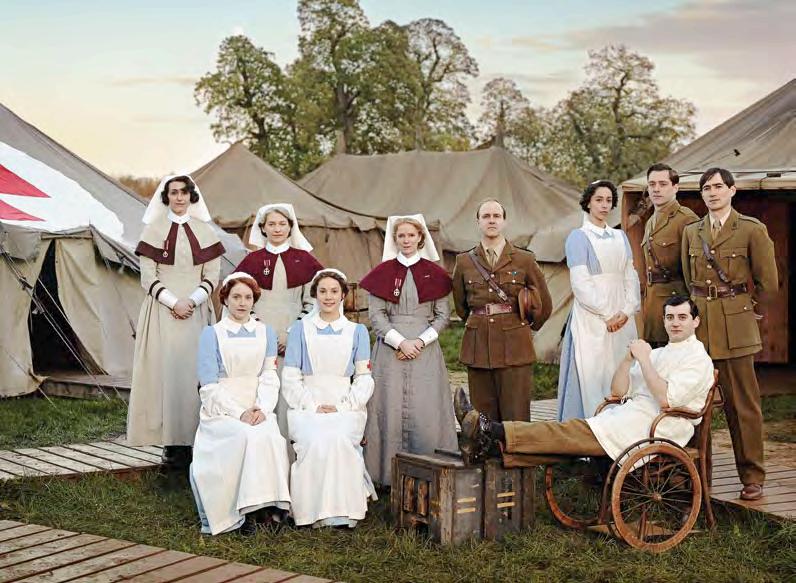 The Crimson Field cast, with Suranne Jones (back left) as Sister Joan Livesey, on set at Charlton Park, Wiltshire
The Crimson Field cast, with Suranne Jones (back left) as Sister Joan Livesey, on set at Charlton Park, Wiltshire
and new and the sun was shining, but as we progressed, the storms reduced everything to mud and it got increasingly battered, dark and squalid—the perfect metaphor, really, for what happened in the First World War itself. All those men arriving in a blaze of sunny optimism and ending up in muddy trenches, covered in lice with rats eating their ear lobes and toes. It reduces me to tears.”
Hermione has always been fascinated and appalled by the events of the First World War. “My grandfather fought in that conflict and was never the same again. He came home with shellshock and shrapnel in his leg. He also lost all his brothers in the fighting
“I can remember when I was about four being at his flat in Wandsworth. Something set him off and he was crouching on the kitchen floor. He asked me to come to him and I sat and held his hand. He was shouting out some names. My grandmother came in and said, ‘Oh dear, he’s calling to his friends in the trenches again.’ I’ve always felt rather haunted by that memory.”

About 20 years ago, Hermione’s interest deepened. “It was around that time that I read Birdsong and the Pat Barker Regeneration trilogy. I read the war poets too, went to the Imperial War Museum and visited Flanders. I was deeply affected by it, although at that stage I didn’t even have my children. [Wilf, nine, and Hero, six]. Now, when I consider the idea that boys just a few years older than Wilf died
“My
in that war, I feel devastated about it. To say that I’m pacifist would be the understatement of the century. If it were my son going to the First World War, I’d be following him into the trenches saying, ‘Come on, we’re going home!’ ”
It’s no surprise that Hermione signed to play Grace Carter in a heartbeat. She wanted to work on a script that had been penned by Sarah Phelps—a writer she much admires, with a CV stretching from EastEnders to Great Expectations. But it was also a chance to honour the fallen. “It really is a case of ‘lest we forget’. And in the case of The Crimson Field, of course, it’s particularly about the part that women played, a subject that I don’t think has been dealt with very much in drama.”
The First World War, she adds, represented a pivotal period for women. “What started out in the suffragette movement blossomed during the war. Women came out of it in a very different position.” The six-part drama, is, says Hermione, very much “oestrogen driven. And that makes a lovely change doesn’t it? It does make you think that the tide is turning and that there are more and more dramas now ►
“I love acting, but my family is my reality”
being made with women at the heart.” There are male characters in The Crimson Field, including Downton Abbey actor Kevin Doyle as field hospital chief Lt Col Brett, but it really focuses on the nurses. Sister Joan Livesey (Suranne Jones), for instance, a thoroughly modern nurse who represents the future, and, under Grace Carter’s wing, a team of young female volunteers—Kitty, Rosalie and Flora, played by Oona Chaplin, Marianne Oldham and Alice St Clair.
“In their previous lives, these middle- and upperclass girls hadn’t even been allowed to go out unchaperoned and then suddenly they were thrust into the unimaginable trauma of the war. The drama is, in a way, about their loss of innocence.”
ropey. It’s pretty liberating. I thought, You know what, get over it. This is about the First World War, it isn’t about you.”
Hermione remains a strikingly attractive woman, yet she’s grateful that in her career she’s never traded on her looks. “I’ve been incredibly lucky to have worked consistently and in some really nice roles in a profession where you know that most actors don’t work at all,” she says.
For all that, she had her struggling years after training at LAMDA. She sold double-glazing and worked on the Sainsbury’s checkout. The frugality and fear about where your next meal might come from never quite leave you, she admits. “And once you have children, it gets worse.”
Nor, she adds, is TV the financial gravy train that it used to be for actors during the Nineties.
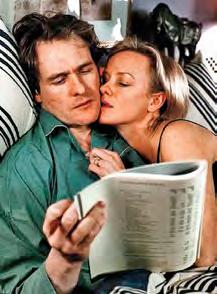
That drama is blessed, Hermione says with a batch of superb young actresses.
“My view when I saw them was to punch the air and say, ‘You go, girl!’ And there was actually something wonderful about being at a stage in my career when I myself could play the ageing harridan instead. No make-up, looking old and
“It’s quite a different industry now,” she says, “and the money has gone down hugely. So there’s still quite a bit of Asda Smart Price going on in my life. I certainly don’t squander cash lightly.”
“I think, perhaps, if you work in America, the fees are still very good,” she adds. “But my life is here and I love British drama. And, you know, there’s part of me that would rather eat beans than find myself working in something that I didn’t believe in.”
Hermione’s mother Helen was a health worker and had to work hard to raise four children on her own after separating from Hermione’s father Michael. But










Our fantastic invisible hearing aid is small. Really small. And, because it fits slightly deeper in the ear canal than your average hearing aid, it’s virtually invisible when worn. That means you get all the benefits of hearing better without anyone understanding how you do it.
Whilst it can’t be seen the difference can be heard.
Just because this hearing aid is small doesn’t mean it’s less effective. We’ve made sure this tiny device has the high speed processors and clarity enhancing features of the very latest hearing aids. These are the things that make sure you get to enjoy all the great things life has to offer like conversations with friends and family, an evening out in your favourite restaurant or a cosy night in front of the TV. And you can enjoy all this with the confidence that whilst people might notice the difference in your hearing they definitely won’t notice your hearing aid.
If you like what you (don’t) see, call 0845 203 7662 and book a free appointment in store to find out more about this amazing little hearing aid.
“I hear normally, it’s as if I don’t have a loss and, because you can’t see them, no one else knows I do!”

To book your hearing check simply call 0845 203 7662
Terms: Valid until 25 March 2014. Free hearing check for over 18s only. Only one free hearing check per year.


Hermione is happily married to TV producer Simon Wheeler, who she met when they worked together on BBC crime drama Wire in the Blood. Marriage and motherhood, she says, provide her with a raison d’être beyond her career. “God knows how it would have turned out without them because acting is such a transient life. It’s so unforgiving—your life turns on a phone call. I love acting, but my family is the reality I return to, and I thank God for it.”
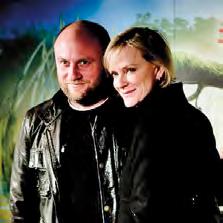
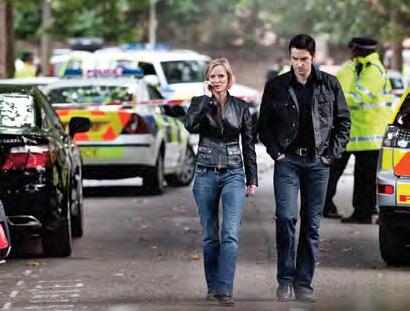
Ageing, too, she says, has given her a sense of calm that eluded her as a young woman. “It’s not so much fun to experience the melted candle effect that gravity has on your body,” she laughs. “But internally, for me, it just gets better and better.
“I’d love to be able to say to my younger self, ‘Be calm. Be happy. Take as much joy as you possibly can from every moment of life. All will be well, I promise you.’ Because, in my youth, I certainly didn’t know it.”
She has learned, too, in her career, to keep the faith. For now, thankfully, the parts just keep on coming. Shortly after
While shopping in a supermarket, I came across this sign. Taking a closer look, I realised the deodorant must do what it says on the tin! Many thanks to Paula Masheder from Kent for sending this in
filming The Crimson Field, for example, she found herself in Leeds working on another TV drama, In the Club, penned by Kay Mellor. In it, she plays a woman who attends birth classes after she discovers that she’s pregnant at a ripe old age. “She’s what they call a geriatric mother,” Hermione smiles. “If somebody had told me when I started out that I’d be playing a pregnant woman at the age of 46, I’d have said, ‘You’re absolutely sh*****g me!’ ”
Matron Grace Carter would no doubt approve of the advances in modern medicine—if not the terminology. n

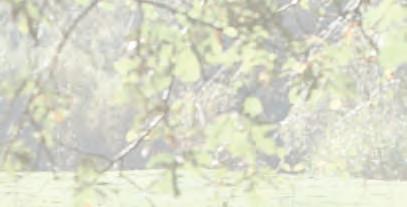
Over 50s life insurance from Aviva. Acceptance guaranteed. No medical checks guaranteed. A cash lump sum guaranteed.

Easethe burden offuneral costs Fromonly £7 a month
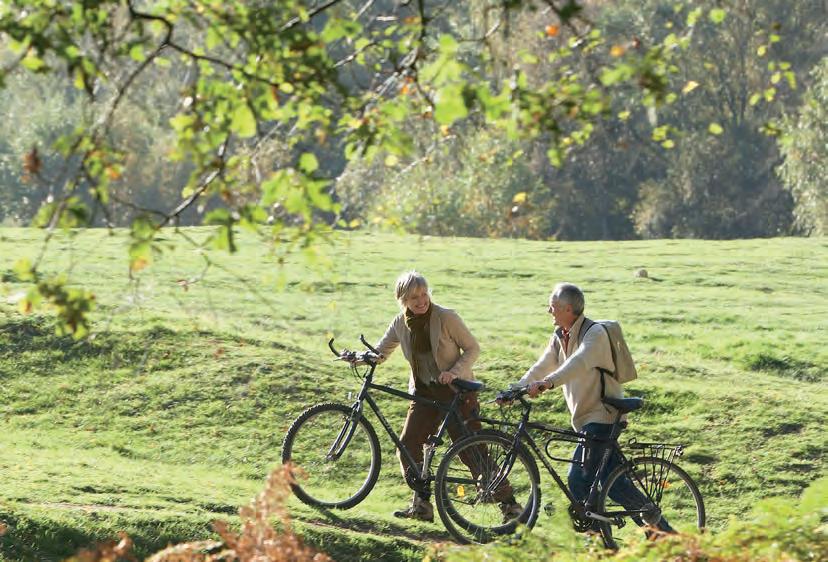




Take out our Guaranteed Lifelong Protection over 50s life insurance plan, and you’ll have the peace of mind that your loved ones could be spared any extra worry at a difficult time. From only £7 a month – just 25p a day – a cash lump sum could really make a difference.
ü Affordable protection – from just 25p a day
ü Guaranteed cash lump sum
ü Acceptance guaranteed for UK residents aged between 50 and 80
ü Premiums guaranteed never to rise
When the big things happen, little things matter
0800 158 2300


The amount paid out at the end of the policy may be less than the total amount paid in through premiums, and the value of the lump sum will be reduced by inflation. Please remember, we only pay out when you die, and this plan has no cash-in value at any time.
Unlike some other companies, we’ll pay out the full life insurance amount after just one year, which doubles for accidental death. In the first year we pay the full life insurance amount for accidental death and for death by any other cause we will pay an amount equal to the premiums paid.

Quoting reference 8293/5
Or visit aviva.co.uk/guaranteed to find out more
Subject to terms and conditions.






Why not take advantage of the Easter break to visit some of this country’s most breathtaking castles? Here’s our pick of the best—from the atmospheric to the romantic By LoLa Borg


The ruined Dunluce Castle sits high on an imposing basalt rock on Northern Ireland’s Causeway Coastal Route, isolated from the mainland by a huge natural chasm. Access is possible via a small bridge, but the castle would have been a formidable fortress.
There’s evidence that an earlier castle was erected in the 13th century, and two towers remain from a 14th-century rebuild. The Clan MacDonnell later seized it and
added their own Scottish spin, copied from castles back home. Life is said to have been lavish, with continual renovation works. But tragedy hit in 1639 when the domestic buildings fell into the sea and most of the servants were killed.

Standing on a site that was snared by the Roman army as far back as AD75, work on this medieval castle didn’t actually start until 1268, when Gilbert de Clare, Lord of Gloucester (“Red Gilbert”, thanks to his hair), needed a base for his campaign to control the land. The move to build such an imposing castle was seen as a statement of aggression, leading to tiffs and arson attacks from rivals.
Caerphilly survived and today is unique—not only because of its enormous size (around 30 acres), but also because it introduced a concentric wall design, positioned on three man-made islands
Dunlace now hosts summer concerts, with local Van Morrison headlining last year, and on a clear day visitors can see across to the Isle of Islay in Scotland. Visit glenarmcastle.com/dunluce-castle for details with lakes and a sophisticated dam system, which was a defence marvel of its time. The lakes eventually became neglected until the state took over the restoration of the castle in the 1950s, when they were re-flooded.
Today, the slightly crumbly Caerphilly (which has featured in the BBC series Merlin) pulls in flocks of tourists. Many come to see the Welsh answer to Pisa, the picturesque Leaning Tower (above right) —which out-leans its Italian rival—while children are drawn by moats full of ducks. Visit cadw.wales.gov.uk/daysout/ caerphilly-castle for details

Looking like a traditional fairy-tale castle, this is said to be one of the most haunted in Britain, thanks to the ghosts of a cardplaying earl and a widow of Lord Glamis (the “Grey Lady”) who was burned at the stake for being a witch.
First built as a hunting lodge for Celtic kings, the design is Scottish baronial with decorative add-ons (the pointed turrets give the feel of a French chateau). Home of the Lyon family since the 14th century, it’s now the private residence of the Earl and Countess of Strathmore. The Queen Mother, Elizabeth Bowes-Lyon, spent her childhood here—there are stories of Elizabeth and her younger brother David pouring “boiling oil” (icy water) from the

ramparts onto guests as they arrived, an antic no modern royal could get away with.
When Glamis was used as convalescent home for soldiers during the First World War, Elizabeth built a reputation as a caring and stoic nurse. The castle was also the honeymoon location for Elizabeth and Prince Albert (pictured above), and in August 1930 Princess Margaret was born here. As with many of today’s functioning castles, it survives by being used for weddings, grand dinners and craft fairs. Visit glamis-castle.co.uk for details

Although crowds now flock to see the donkeys that work the water wheel in The Well-House, Carisbrooke is significant as the site for one of the oldest and bestpreserved fortresses in Britain.
An original motte-and-bailey castle established by the wealthy de Redvers family (who laid the first stone in 1136), it was renovated periodically because of frequent attack from the French in the Middle Ages, then fortified when the Spanish Armada passed by. A ruined wall dating from pre-Roman times indicates ancient life, and records reveal that Anglo-Saxons occupied the area in the eighth century.
But the castle’s main claim to fame came much later: the imprisonment of Charles I in the Constable’s Chamber, his bedroom, for 14 months in 1647. The king attempted to escape through the bars of his window, but apparently got stuck.
Visit english-heritage.org.uk/daysout/ properties/carisbrooke-castle for details
Set in a glass-and-steel jungle and now overlooked by the largest structure in London (the Shard), the Tower is one of our most famous castles. There have been complaints—even by Unesco—that the city planning around it has paid little respect to a magnificent structure, with the entire complex described by the journalist Simon Jenkins as “a remarkable medieval town within a town”.
The White Tower was the original Norman fortress built by William the Conqueror (dating from 1078), but every stone on this site reeks of dramatic history: blood, gore, beheadings, intrigue, the Beefeaters, the Crown Jewels and, of course, the ravens—legend says there must be six at the tower for the monarchy to survive (last year, two were eaten by foxes, but luckily the Tower kept a couple in reserve).
The site has also served as a prison, a zoo, a mint, a royal residence and a place of execution. The chilling Traitors’ Gate is the river entrance where the doomed would arrive by boat, knowing there was scant chance of escaping their fate. In among all the hoopla and the crowds of tourists on a summer’s day, the Tower can still spin the visitor back over the centuries. Visit hrp.org. uk/toweroflondon for details ►

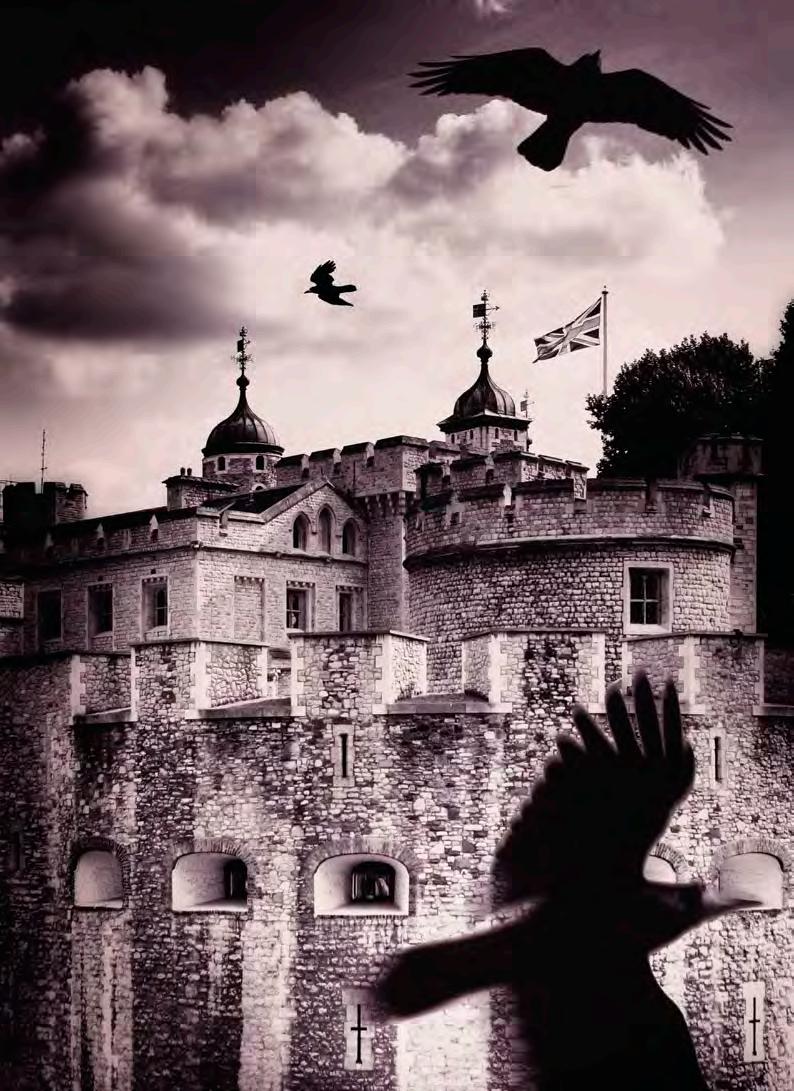

Best known for being the childhood home of Anne Boleyn, Hever castle is an example of an indulgent moated construction. In fact it’s double moated, which looks lovely but would never have survived the rigours of an attack.
The gatehouse and a walled bailey date back to 1270; later, it was converted into a fortified manor.
In 1505, Thomas Boleyn (Anne’s father) inherited the property. The passionate courtship of Henry VIII and his doomed bride was played out here, away from the prying

eyes of the court. When Thomas died in 1539, Henry— spitefully, some might say—passed the castle onto his fourth wife Anne of Cleves as part of their annulment settlement.
Centuries later, the castle was acquired by the American Astor family (owners of the Waldorf Hotel in London) and in 1903, William Astor spent a good slice of his fortune renovating the property, creating extensive gardens and an artificial lake. The gardens are still much admired today, particularly the roses in June. Visit hevercastle.co.uk for details

Northumberland has an abundance of castles (Lindisfarne, Bamburgh, Alnwick), but although a ruin for 500 years, the power of Dunstanburgh’s clifftop position is so potent that when J M W Turner visited the area, he rose daily at dawn to paint it.
The castle was an excellent deterrent against Scottish marauders because of its isolated position, teetering on the land’s edge. It covers 11 acres and building was started in 1313 by Thomas, Earl of Lancaster. With its intimidating gatehouse, opulent apartments and enough land for the locals and their livestock, the castle was a daunting beast, but the earl was only nine years into his fantasy when he was executed.
John of Gaunt took it over, and Dunstanburgh enjoyed a century of uneventful glory until the 1460s and the Wars of the Roses. The damage it suffered shielding Lancastrians was never repaired, and it’s been romantically crumbling ever since. Visit nationaltrust.org.uk/dunstanburgh-castle for details


Thanks to:
William the Conqueror built this crucially positioned Norman building as a means of controlling the country internally. A prison was installed in 1787, and men and women passed through the walls to be tried and incarcerated in the bowels of the castle. Others were shipped off to Australia or hanged on the gallows. The Lincoln crown court is still held here today, although the cells are no longer used.
Last autumn, restoration works discovered a 1,000-year-old church and the skeleton of either a king or baron. The castle is also home to one of the four originals of the Magna Carta, and the building is currently undergoing a major refurbishment in time for the 800th anniversary of the document next year. n Visit lincolnshire.gov.uk/visiting/historic-buildings/lincolncastle for details
Jenny Tucker for research; and Rodney Castleden, author of Castles of Britain and Ireland (£15)
Is there a castle you’ve particularly enjoyed visiting? If so, we’d love to hear about it. Send us an email—with a picture if possible —to theeditor@ readersdigest.co.uk.

enter our family photo competition anD win £500!

What does family mean to you in Britain in 2014? Could you capture it in a photo? If so, our great new competition is for you! All you have to do is take a compelling picture that sums up your sense of family life. We’re looking for unusual approaches, so don’t restrict yourself to portraits of mum, dad and the kids. Families come in all shapes and sizes these days, so use your imagination. The competition will be judged by the RD team and award-winning photographer Barry Marsden, and the winning entries will be published in a future issue. To get your creative juices flowing, here’s advice from our design director Martin Colyer on taking family snaps.

When photographing family members, look out for a situation with a compelling focus. In the picture on the left, my father had come to vist his first grandchild in hospital and was so engrossed in holding her that he was oblivious to me, at his elbow.
I was slightly crouching, just enough to accentuate my father’s protective stance, but not enough to lose my daughter’s cheek. If I’d stood up straight to get more of her in, his presence would have been lessened and the impact would have been lost. The wide-angle lens accentuates the contrast in size between the adult hand and the baby leg, and adds to the “protective” feel of the photo. At the other end of the scale, watching out for special moments can also make great pictures. My mother (right) was out walking with me and at one point, enjoying the view and the farmer’s sheep-herding cane she was holding, she stood to survey the landscape, before striding on. I noticed the wonderful pose she’d struck and asked her to recreate it a second later. As she’d already done it, it wasn’t forced or false, and resulted in a family favourite.
J Take a high-resolution photo with either a phone or digital camera. After saving it as a jpeg no larger than 2MB, please send it as an attachment to rdphotocomp@ readersdigest.co.uk by 5pm, April 30, 2014. (Please include a brief explanation of who’s in the picture.)
J There are two categories—one for adults and one for under-18s.
J In the adult category, the winner will receive £500. The under-18 winner will receive £250 of high-street vouchers for a store of their choice.
J Please put either “Adult” or “Under 18” in the subject line of your email.

Rules: Please ensure that pictures are original and not previously published. Please include your full name, age, postal address, email address and daytime phone number with all correspondence.
If you are under 16 you must ask your parent or guardian’s permission to enter this competition.
We may use entries in all print and electronic media. We cannot return or acknowledge your entry. Contributions become world copyright of Vivat Direct Ltd (t/a Reader’s Digest). Entry is open only to residents of the UK, Channel Islands, Isle of Man and Republic of Ireland. It’s not open to employees of Vivat Direct Ltd (t/a Reader’s Digest), its subsidiary companies and all other persons associated with this competition, their immediate families, and relatives living in an employee’s household. The judges’ decision is final. n
HIV is widespread among South Africa’s young people. But a nurse from Chepstow is using his medical experience—and football—to help them get the treatment they so desperately need
In January this year, when Delani* turned up for treatment at the Whizzkids United Health Academy at Edendale Hospital, Marcus McGilvray was surprised but delighted.

Africa’s Kwa-Zulu Natal province, had several months earlier. The boy had been born
*some n ames have been chan G ed to protect privacy


HIV-positive and was refusing to take his medication to get back at his parents for passing on the disease. But of course, by leaving his immune system exposed, Delani was most likely to hurt himself.
“Delani hadn’t taken his drugs for over a year,” says Marcus. “But all of a sudden, here he was. He hadn’t been asked by his parents to come along. He’d made his own choice.”
So what made him change his mind? The answer is football.
Delani had originally come to the academy for coaching sessions on its football pitch—a welcome change from the dusty scrubland near his home. But his experience there started to change his self-destructive persona. “He made friends who liked him for who he was,” Marcus says, “people who looked up to him because he was good at football.”
No longer just defined by his illness, Delani now felt comfortable enough at the academy to enrol in one of its treatment programmes.
Three months on, he still turns up weekly to take his medication, is in reasonable health, and has joined a peer support group.
DelanI Is one of thousanDs of South African youngsters Marcus and his academy have helped come to terms with, and get treatment for, HIV in the last few years—thanks to an innovative mix of football and health outreach.
The former London clinic worker moved to Africa in October 2002 with his partner Nicola, a paediatrics expert, to set up an HIV clinic in Ghana. They then moved to South Africa to work with Kwa-Zulu Natal’s regional government
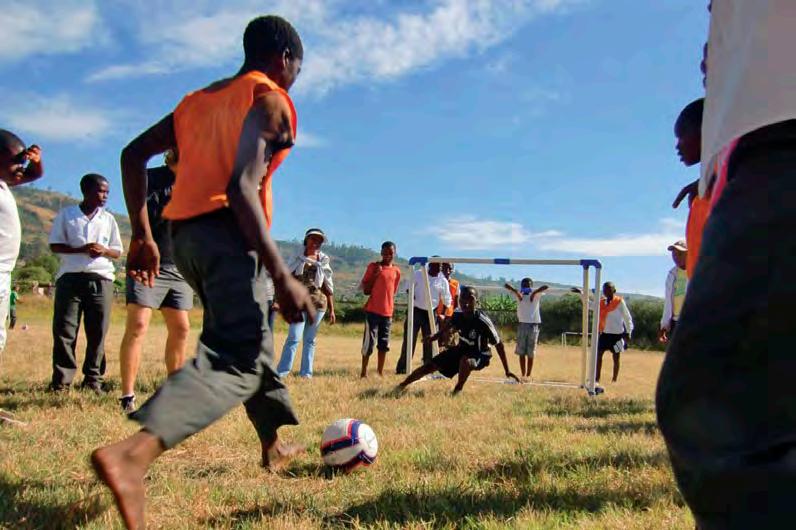
on the diagnosis and treatment of the disease.
In June 2004, though, the couple split up, with Nicola moving to Zimbabwe to set up a children’s clinic. “We’d both been working seven days a week, and didn’t have much of a relationship left,” Marcus admits.
His response was to throw himself into his work even more. “I’d come to Africa because I just kept thinking about all the people who were dying of Aids,” he says. “I didn’t want to retire in 30 years’ time without at least having had a go at helping them.”

Coaching for life: Marcus leads another session
could get 40 youths to a municipal pitch for a game of football at 3pm the following Monday. Four hundred turned up.
Marcus took a job developing training for Kwa-Zulu Natal health professionals in the use of HIV drugs. But some 45 per cent of adults and 16 per cent of adolescents in the region are HIV-positive, and Marcus really wanted to work on prevention.
“Giving people advice and support before they’re infected is what saves lives,” he says.
“advice before people are infected is what saves lives”
t he group who really nee D e D to be targeted was children. So Marcus asked for a day off a week to set up a street clinic in a small town called Mariannhill. Only a handful of kids came to the first session, but Marcus noticed many more were playing football on a sun-baked field nearby. On a hunch, he asked a local community leader if he
The matches continued for the next few weeks and Marcus realised that once the young people got to know and trust him, the sessions were a great chance for them to speak about their health and other problems in a safe environment.
“Someone would always confide in you, usually at the end of the session,” he says. “You’d hear stories of rape, physical abuse and violence.” Marcus would also learn which youngsters were HIV-positive and encourage them to get the treatment and support they so desperately needed.
He developed the sessions into a fully fledged programme called Whizzkids United and, over the next four years, took it to schools and community groups around Edendale—and eventually into South Africa’s Western Cape and North West provinces. ►

Not just football: education is also crucial to the work of
In one of the programme’s exercises, the children were asked to play without any goals. “After a while, they’d complain about it—that they were running around in circles with nothing to aim for,” explains Marcus. “So we asked ‘What is better, a life with or without goals?’ The game became an analogy for life.”
The programme also emphasised the importance of working together to overcome challenges—and the importance of a goalkeeper to protect the team was used to explain the need for contraception to protects couples from HIV.
Both sexes took part and, says Marcus, “Girls began to understand the peer pressure on boys to have lots of partners and boys started to appreciate why girls would say no.”
Yet, while the sessions were clearly valuable in helping the youngsters with their social skills and sexual behaviour,
Marcus wasn’t sure how many ever actually went to get HIV treatment: “For young people, there was too much stigma attached to going to a clinic.”
It occurred to him that, for these young people, journeying to an unfamiliar place on the other side of town to talk to strangers about their problems would be a lot more traumatic than just being taken after a football session to a clinic a few yards away by someone they trusted. “We needed a base where the same kids could come every week, play football and see health professionals.”
anD so the ID ea of the h ealth aCaDeMy—putting Whizzkids United’s combination of football and HIV treatment and advice to use in the grounds of Edendale Hospital—was born.
But it would take some £60,000 to set up. Marcus went to companies, aid
organisations, governments and charities throughout South Africa, across the rest of the continent and all over the world. Even so, finding the money was often a soul-destroying process.
Some bodies would give money only when they could see a project working, not just to support a concept. Some overseas investors simply saw Africa as a dead loss: a place where people were poor, got ill and died—and that was just the way it was. Marcus also discovered that apartheid still lived in the hearts and minds of some South Africans. “Why do you want to help those kaffirs? Let them die,” one company director told him.
“there was too much stigma attached to going to a clinic”
young person with HIV isn’t only about giving them the drugs. It’s also about helping them with their situation.”
One evening last June, Mary*, a 16-year-old girl, turned up at the academy. She was visibly shaken. A counsellor discovered that she’d been dragged into a shed and repeatedly raped.
“She escaped and came straight here,” Marcus says. Tragically, Mbali tested HIV-positive as a result of the attack. But over the next few weeks she had counselling and academy staff found her a place in a foster home.
every Day was a struggle, not knowing whether he’d get the funds he needed. Then, in 2009, the American pharmaceuticals firm Abbott—whose UK charity fund had helped set up a Whizzkids project in the UK—donated half the money. A few months later, Brian Moshal, CEO of the Victor Daitz Foundation—a charity-funding body based in Durban—told Marcus he’d provide the rest. “It was what I’d waited so long to hear,” Marcus says. “I nearly jumped out of my seat.”
The Whizzkids United Health Academy opened in June 2010. It has now seen 12,000 young people, giving them access to a counsellor and HIV testing. Some 1,100 have tested positive, and around 600 are currently receiving treatment.
But, stresses Marcus, “supporting a
Around one in three South African women and one in ten men will be raped. “Nearly always, the victim is too scared to give evidence and the attacker gets away,” Marcus says.
With the academy’s support, however, Mbali did give evidence and her 35-year-old attacker was jailed for ten years. If it hadn’t been for the academy, Marcus is sure she’d have had
adviser on sport

to return to the children’s home and been raped again.
The academy also now runs educational and work experience programmes. One of Fifa’s Football for Hope centres, which promote public health and education, opens on the site this month. In June, six youngsters are heading to Brazil at the time of the World Cup to take part in a tournament for disadvantaged people.
Meanwhile, Marcus is as busy as ever, securing funding for projects, writing reports and meeting people and organisations who need his help. These days, mind you, he makes sure he also has
“Would
some time for a private life. Last year he got engaged to Andrea, whom he met in 2012 while she was working for the United Nations in Durban.
Among his many ambitions, Marcus wants to set up similar health programmes in other parts of Africa. “There are millions of young people all over the continent who desperately need our help.
“We’ve achieved so much more here than I ever thought we would, but there’s still so much more to do.” n
To donate, please visit justgiving.com/ MarcusWKU or whizzkidsunited.org.
How many photos have been ruined—or perhaps improved—by unwanted background characters? Slideshare.net sifts through some spoiled snaps:


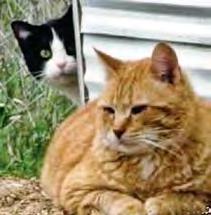
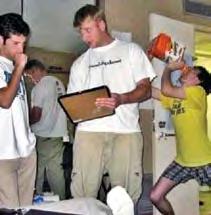





Internationally renowned psychologist Thalma Lobel has investigated the surprising ways our senses can influence how we think and behave without us even knowing it. Here are six of her most intriguing discoveries...
A stroke from a relative can make you feel loved. A hand on the shoulder from a nurse can reduce anxiety before an operation. Studies have also found that when salesmen touch people on the arm, they’re more likely to make a sale. But tactile sensations that influence our behaviour don’t have to be from humans. Coming into contact with a hard or rough object can make us take a hard or rough approach to a situation. In 2010, for instance, a joint Harvard, MIT and Yale psychology study asked subjects to hold either a blanket or a solid block and assess an employee
►

from the transcript of an ambiguous interview with his boss. The blanket group saw the employee as far more flex ible and soft than those holding the block.
I often go for a walk with a friend, before we head to a cafe. Sometimes our route is across a sandy beach, sometimes along the boardwalk. When it’s on the sand, my friend doesn’t really mind which cafe we sit in, but when we walk on the hard boardwalk she’s quite dogmatic.

So why does touch affect us like this?
In large part, it goes back to our childhood. Infants learn about the world around them through the touch of parents and carers—hugs, kisses and nursing. It makes them feel secure and helps their emotional development. Children also come to associate soft things, such as a mother’s skin or the fur of a teddy bear, with positive feelings; but a doctor’s hard examining table, say, with negative experiences like injections. In adulthood, similar tactile sensations still evoke these early memories and influence our attitudes and behaviour accordingly.
Harnessing this hidden power of touch can be very useful. In a business negotiation, for example, give your opponent a soft chair—it should make them easier to deal with.
And at the end of a hard day, try smoothing over any lingering tensions you have by wearing nightclothes made of silky fabrics.
It’s well known that we learn to associate red with danger, but 2007 research by American and German psychologists found that it can also cause us to perform badly in tests. The participants did significantly worse in a verbal-reasoning exercise if the cover page was red, rather than green or white. The researchers concluded that red reduces performance by evoking a fear of failure. It may also make us nervous.

“The rich, vibrant quality of red means it explodes in our minds”
The rich, vibrant quality of red means it explodes in our minds. We also associate it with both female sexiness (studies have shown that men unconsciously find women sexier when they’re wearing red) and male dominance—just as the red rumps of some male monkeys are a status symbol. So, although wearing a red suit for a presentation might be too much, a red tie or shirt could impress. Not, though, if you’re female —those who dress sexily at work are seen as less competent.
About three years ago, my husband and I were at a party to mark the Jewish festival of Shavuot. As is traditional, everyone was wearing white. After I’d got over the embarrassment of turning up in a little black dress (I thought the tradition was just for children), everyone seemed so pleasant, including some hard-nosed businessmen. But could it have been because of the colour of their clothes?
Researchers at Cornell University in the US asked a group of students and professional referees to watch two almost identical videos of American football sequences, one featuring players in white uniforms, the other players in black. The results were astonishing. Both the referees and the students said the team wearing black were more aggressive and that they’d penalise them more. In further tests, students wearing black were more likely to choose rough, physical games from a choice of 12 than those in white.
Many scientists believe that the link between positivity and brightness goes back to the fact that we function

“Both the referees and the students said the team wearing black were more aggressive”
better, and life is generally less dangerous, in the light. When children are lying in bed in darkness, they feel alone and vulner able. This association stays with us into adulthood.
The association between the dark and negative things— reinforced by phrases such as “black- hearted” or film titles such as The Dark Knight—may even lead us to act badly in the dark. There is, of course, more lawlessness at night, partly because criminals think they won’t be seen. But a 2010 Canadian study revealed that we may be more inclined to be immoral in the dark even when it has no real bearing on whether there’s a witness. Students who took a self-scoring test with small cash prizes were more likely to cheat if they were placed in a dim room than a brightly lit one.

The Oregon Ducks, in black, get stuck into the Stanford Cardinals— or is it the other way round?
There are many phrases linking weight to importance. Serious problems are “heavy”, while powerful people “throw their weight around”. But researchers have found that the association goes beyond language and that holding a heavy object can actually affect our behaviour. It’s been found, for instance, that if people are given a CV attached to a heavy clipboard, they’ll view the candidate as of better quality than if it’s attached to a light clipboard.

“If you want people to sign a petition, attach it to a weighty clipboard”
A mental burden or secret may give us a physical sensation similar to carrying a weight too. A 2012 study asked one group to recall an important personal secret and another group a small secret. They then had to estimate the steepness of a hill. Those with the big secret estimated the gradient and distance to the top as greater—just as people laden down with a rucksack have been shown to do.
So if work is getting you down, it might just be that large briefcase you’re carrying. If you’re applying for a job, consider printing your CV on thick paper or presenting it in a heavy folder. And if you want people to sign a petition, attach it to a weighty clipboard.

Years ago, my husband and I decided to sell our flat. One couple were very interested but their offer was too low, so we agreed to negotiate. During our meeting, we all had cups of nice hot tea and within
Early in life we begin to register physical disgust at such things as rotten foods and bad smells—probably an evolutionary response to keep us away from disease. So it’s not surprising that we associate cleanliness with moral behaviour and use the language of disgust—the word “dirty” for example—to describe actions such as betrayal and adultery. We may also suspect that grubby people are less morally upstanding.
But it seems this might be unfair. At the University of Tel Aviv, I conducted a study where two groups of students marked themselves in a test and could lie about their score. But we asked the groups to go to the gym first—then one had a shower, while the other remained sweaty. The group that washed cheated more, as if feeling clean on the outside
ten minutes we’d agreed to their original bid. When I came home, I was kicking myself and decided it must have been my husband’s fault. But years later, I found out that something far simpler probably played a role: the tea.
high temperatures have been linked to human behaviour before, needless to say—hot days in inner cities often lead to increases in aggression and crime.
But a 2008 Yale University experiment found that something as simple as holding a warm object can make you feel more generous and friendly. The study gave students a mug of hot or of iced coffee to hold. They were then read a description of “Person A” and asked to say what
they thought of him. Those with the hot drink were far likelier to see the person as good-natured and caring than their iced-coffee-holding counterparts, who tended to see him as irritable and selfish. Another experiment found that people holding a heated therapeutic pad (as part of a fake product test) were much more likely to choose a free gift for a friend— instead of themselves—than participants with a cold pad.
If warmth improves relationships so readily, just asking children to put on jumpers or share hot chocolate could help them interact better at school. Try serving warm soup as a dinner-party starter. And in negotiations, offer the other party espresso rather than water.
made them feel clean on the inside, giving them a “morality surplus” that allowed them to cheat. So next time you’re dealing with a smart salesman, exercise caution. They may be more likely to cheat you than an unwashed person would.
But washing can make you feel better about yourself in other ways too. When study participants are asked to recall a recent incident when they were unlucky, then play a money-investing game, those who wash their hands in-between are less influenced in their risk taking by their previous ill fortune. It’s as if cleaning can remove the psychological traces of events in the recent past. Though it may not be able to erase major life events, washing could be a valuable tactic if, say, you find yourself struggling to juggle work, family and friends. Having a shower when you get home in the evening might well be the perfect way to let go of one activity and move on to the next. n
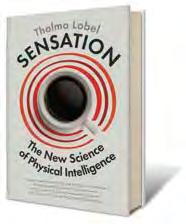
Sensation: The New Science of Physical Intelligence by Thalma Lobel is out this month (£12.99)


…how warm and tender my mother elsa was, how much she cared about her children and how happy she was to be a wife and mother. But she was very strict about manners and diet: eat your greens and sweets only as a treat. She was in charge of everything in our home in Bayswater [London]—a domestic goddess.
…the house was always full of singers, actors and comedians. My father Joe was a theatrical agent; and my grandmother Hettie, a singer and dancer who entertained the troops in the Boer War. I suppose showbiz was in my blood. But Dad was dead set against me going into the “profession”. He said that most of the people he knew were “vulgar, common and course”. He was worried that I’d end up just like them!
playmate. We both used to write off to the film stars of the day, asking for autographs. Jackie was already writing stories as a child and I used to illustrate them with my drawings.
I was about 11 when my brother Bill arrived, and he was instantly adorable— you couldn’t resist giving him a big hug. Because of the age gap, we didn’t spend much time together then, but we’ve become exceptionally close since.

…getting a brother and sister. Jackie came along when I was four and I was totally thrilled because I had a
…appearing on stage for the very first time. Despite my father’s reservations— he wanted me to go to secretarial school and find a husband—I pestered my parents so much that I was eventually enrolled at the Cone-Ripman theatrical school in London aged around 12 in 1945. We did acting, singing and dancing, and I loved it! One day, I was told that I’d been picked for a role in Ibsen’s A Doll’s House at the Arts Theatre in London. I was going to be on stage!
I suppose that was the start of it all. ►


…being nicknamed miss perpetual motion. As a teenager, I was always on the go…off to the latest Sinatra film or the London Palladium to see the great Johnnie Ray sing my favourite song “Cry”. I’d like to think I’m still the same today—always doing something, and constantly interested in the world.
…going to hollywood. I made my first British movie at 17 [The Woman’s Angle] after a year and a half at Rada. Then, at 20, I was whisked off to Hollywood [Joan’s first American film was The Virgin Queen]. I arrived at the end of the golden era; the gilt was just beginning to tarnish, but it still seemed incredibly glamorous. Suddenly, I was meeting people like Bob Hope, Lana Turner and Marilyn Monroe.
My favourite was Gene Kelly. I’d always loved his films and when I met him, he was so wonderful to me. He sort of took me under his wing and used to invite me to his house. There I was, chatting to Gene, Marlon Brando and Paul Newman. Looking back, it seems absolutely incredible, but at the time I just thought it was perfectly natural.

I was an actress and this is what actresses do.
…wanting to be a mum. I first got married when I was 18 [to actor Maxwell Reed], but I was so naïve. You could say I was 18, going on 11. It was a farce and, unsurprisingly, didn’t last. At 29, I married a very famous man, Anthony Newley, and
Over the decades: Joan in 1969 with her children Tara and Sacha; as a 1970s film star; and an 80s TV star in Dynasty

suddenly started going all goo-goo eyed over any baby I saw. Women know when they’re feeling broody!
When Tara was born [in 1963], I wanted to be with her all the time. The other glamorous mothers where we lived in St Moritz couldn’t understand why, but I just needed to be a hands-on mum. Art Buchwald [a well-known writer of the time] even did a story on me for the Herald Tribune called “A Most Peculiar Mother”
…tony couldn’t keep his eyes or hands off the ladies. I think I was expected to put up with that, but, er… sorry, that’s not how I live my life!
…the 1970s. I’m not one of those people who sees life in terms of decades, but I suppose I do remember the Seventies


particularly. There was a lot of strife in Britain. It seemed like a time of upheaval. And a time of high taxes!
I did a lot of films. Some of them performed well; some have become quite iconic, such as The Stud. Jackie wrote the book that film was based on and she told me that she did so with me in mind. Does that make me smile? That she’d write a story like that while thinking of me? Ha ha! It makes me laugh to think that anyone would even ask the question.
…my agent called me and said, “do you want to be in dynasty?” I said, “What’s Dynasty?” Back then, I was a jobbing actress and the show was just another gig. I found out that Sophia Loren and Elizabeth Taylor had turned down the role of Alexis Carrington,
“At first they wanted Alexis to have short hair and a beret”
but I read a script and thought, Yeah, this sounds like fun. For my career, it was a total game-changer. I seemed to be flavour of the month for the rest of the 1980s.
…alexis’s look was something that i created. At first, they wanted to dress her in little suits with Peter Pan collars, short hair and a beret, which didn’t feel right to me. I got a Golden Globe for the role in 1983, which I was obviously thrilled about, but I was at a party with my friend Billy Wilder and he said to me: “Joan, awards are like haemorrhoids. Eventually, every a**hole gets one!”
…receiving my obe in 1997. I’d met the Queen many times, but going to Buckingham Palace for an honour like that is something special. And it was nice ►
to receive it for my charity work [as well as services to drama]. I’ve been involved with the Shooting Star children’s hospices for more than 30 years and helping children in India for more than 40. Some people might say, “Oh, you only do charity work to keep your name in the papers.” Rubbish! When I started doing it, nobody knew about it apart from me.
…getting married five times, but finally getting it right. I first met Percy [Gibson, a theatre manager] in 2000 at a book signing and we became friends long before anything occurred between us. To be honest, neither of us was looking for romance, but it just sort of happened. I was worried a bit at first, but those worries didn’t last.
The age gap? Look, once people get towards their 50s [Percy is 48; Joan is 80], they more or less all end up on the same path. Percy and I (left) share the same outlook on life—he is my soulmate. Just the other night, we sat in watching a Breaking Bad box set and I thought to myself, Being with him feels so right.


…working with eliZabeth taylor on her last film. We didn’t know it at the time, but Those Old Broads in 2001, with Debbie Reynolds and Shirley MacLaine, turned out to be her final outing. She wasn’t well—she had to be helped and held up a lot of the
Those Old Broads: with Shirley MacLaine, Debbie Reynolds and Elizabeth Taylor
time. But what a trouper! She just got on with the job.
If you read some of those inaccurate biographies out there, you’ll see that, as a youngster, I was touted as the “new Elizabeth Taylor”. Not true. If anything, I was supposed to be Britain’s answer to Ava Gardner. The critics said I was exotic, smouldering and sexy. They called me a “coffee bar Jezebel”.
…poking fun at myself in the recent snickers advert. Look, if I don’t send up Joan Collins—The Diva— then somebody else will. I wanted to get in there first. I always have a lot of fun doing adverts. Some people may remember the Cinzano ones I did in the 1970s and 80s, with Leonard Rossiter. I didn’t find this out until after he died, but apparently Leonard used to refer to me as “the prop”. As soon as it was time for filming, he’d say, “Where is she? Bring on the prop.”
…falling in love with sainttropeZ. I first went to the south of France when I was 15. I stayed with my Aunt Lalla and Uncle Godfrey in Cannes and just adored the climate, the food, the people…everything. Then in the 1970s, I went to Saint-Tropez, which I liked so much that I decided to buy a house there. I’m actually about 20 minutes outside the town, in a small village surrounded by mountains and looking out over that beautiful blue sea. A lot of my life is about cities and hustle and bustle, but when I’m there, I feel far away from all of that. It’s a place where I find peace.
…deciding to launch my own skincare range. It’s something I’ve thought about many times since the
Dynasty days. I guess I’ve been in so many make-up chairs over the years that I eventually realised how important make-up and skincare are to a woman’s armoury. I never leave the house without my “slap”.
My range is for any woman who wants to look good when they’re older. Sadly, that’s a concept which has been much maligned over the years. But women have been using make-up and looking after their skin for thousands of years. Surely it’s nothing to be ashamed of? I mean, Cleopatra used to bathe in asses’ milk. ■ As told to Danny Scott
Joan’s Timeless Beauty cosmetics and skin-care range is available at joancollinsbeauty.com and qvcuk.com.

A thread on reddit.com recently asked for examples of tales our parents told us to scare us. The submissions ranged from the hilarious to the frankly immoral:
“There’s a little man who lives in the fridge and turns the light on for you.”
“If you don’t sleep by 10pm, God will abduct you and carry you to the moon.”
“Your moles are the result of flies laying their eggs in your skin.”
“If you don’t finish your dinner, Buzz Lightyear will die.”
“Guacamole is chopped-up lizards.”
“If you pick your nose, you’ll detach one of the cords that holds your eye in place.”
“Dragonflies sew your mouth shut if they hear you swear.”
“You’ll have a child for every piece of rice you leave on your plate.”
“Boarded-up shops with iron grates are where they put the ‘bad children’.”
“If you eat the dry dog food, eventually you’ll turn into a dog.”

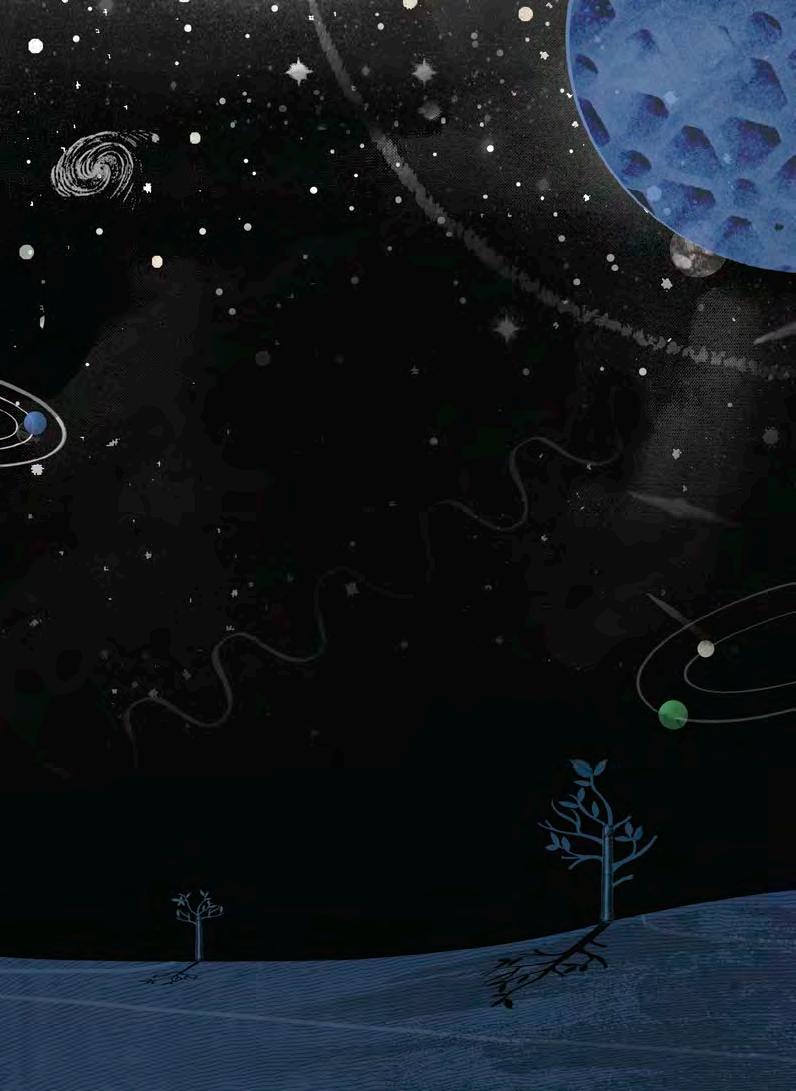
Astronomer Mark Thompson reveals the scientific conundrums that could be firing our imaginations in the next few years
illusTrATed by sAM fAlconer ►
1 | Why is the s un ’s outer limit hotter than its surface?
The sun is one of the most familiar objects in our solar system; it rises in the east and sets in the west every day, without fail. Astronomers have studied it for hundreds of years—and now, with space exploration, you might think it has few secrets left to discover. But many baffling mysteries still surround this ball
of electrically charged gas—not least why its outer atmosphere, the corona, is so hot.
The sun’s visible surface, the photosphere, has a temperature of about 5,800C. Outside that lies a layer of atmosphere, known as the chromosphere, which is slightly cooler at just under 4,000C. But the temperature of the corona beyond it rockets to an astonishing three million degrees! So there must be some unknown mechanism that heats this layer without heating the chromosphere—almost like a light bulb that can heat the air that surrounds it more than its glass.

Current theories suggest that energy is carried from the sun (which has a core that’s about 15 million degrees) by some sort of special wave, rather than the more usual thermodynamic heat transfer. But we should get closer to the truth after 2018, when Nasa’s Solar Probe Plus is set for launch. It’ll be the first space mission to get really up close and personal with the sun, and hopes to unlock many of its secrets.
Understanding how it makes the corona so hot will be of great interest—not just for space researchers but for heat engineers and other scientists, as it could lead to innovative new heating and power-transfer technology on earth.
There are thousands, even millions, of objects in orbit around the sun at distances much further than Neptune. These bodies, which include numerous minor planets such as Pluto, exist in a large field called the Kuiper Belt, which extends to around 5.2 billion miles from the centre of the solar system.
You’d expect the distribution of objects to fall off gradually with increasing distance from the sun, but they seems to come to a sudden halt at a point called the Kuiper Cliff. The cause might be an undiscovered planet —a body no larger than earth would have enough gravitational effect to keep the cliff in order. But at that distance from the sun, it would take a planet hundreds of years to complete one orbit, so it’s unlikely that it could keep the belt so apparently clear by itself. Instead, there could be a number of earth-sized bodies orbiting at the edge of our solar system, keeping guard.
For now, that idea remains just another theory. But with more powerful telescopes such as the James Webb (a collaboration between Nasa, the European Space Agency, and the Canadian Space Agency, also due to be launched in 2018) set to be able to see the edge of the solar system clearly, the truth about the Kuiper Cliff may finally be revealed.


Gravity is one of four fundamental forces that govern the universe. It differs from the other three forces—electromagnetic; strong nuclear (which binds together protons and neutrons in the core of atoms); and weak nuclear (which causes atoms to change and decay)—because its effects are felt over great distances in space. It holds you and me on the surface of the earth, keeps the moon in orbit around the earth and the earth in orbit around the sun. It’s even responsible for keeping all of the stars in our galaxy bound together like a giant island in space.
We can visualise gravity’s effects if we imagine space as a giant sheet of rubber with a large object, such as a bowling ball, placed on it. A dent will form in the rubber, just as gravity causes a sort of dent in the fabric of space. And the larger the object, the deeper the dent will be. Combining this analogy with Sir Isaac Newton’s definition of gravity as the interaction between two objects depending on their mass and the distance between them, it’s easy to see how the greater the distance between two objects, the smaller the gravitational attraction.
But among the many things eluding scientists about gravity is how gravitational information is transferred through space. Many experts talk of a hypothetical particle known as the graviton, but it has yet to be discovered. Others suggest that when an object passes through the Higgs field, Higgs bosons are attracted to it and give it mass—and the mass of an item is when we perceive gravity. So the more we discover about the Higgs boson, the more we’ll learn about the powerful force keeping everything in the universe in place.
Among other things, knowing gravity’s workings might allow us to harness its power to travel around the solar system and further galaxies. ►
Since 1992, we’ve discovered more than 1,000 planets in orbit around other stars. Several techniques have been used, including detecting the tiny tug they exert on their host star, allowing their mass to be estimated, or measuring the drop in light as they pass in front of the star.
But though many planets similar in size and composition to the gas giant Jupiter have been discovered using these methods, they haven’t been very effective at finding smaller earth-sized bodies. However, the Kepler telescope, launched in March 2009, changed

things with its three-and-a-half-year mission to monitor some 100,000 stars for earth-like worlds. It’s found more than 100, such as the tiny Kepler 37-b planet, some 210 light years away.
In the coming years, we’ll be able to probe the nature of these worlds’ atmospheres by decoding the hidden information in their electromagnetic spectrum. And we may well see a flurry of planets with atmospheres that could sustain life.
Mark Thompson is the author of A Down to Earth Guide to the Cosmos (£9.99) and a presenter of BBC2’s Stargazing LIVE.

Ever since the discovery of the expansion of the universe by Hubble in 1929, astronomers have been battling to understand its ultimate fate. Will it continue to expand, or one day start to collapse gradually?
The answer seemed to be linked to the amount of matter in the universe—the more there was, the greater the amount of gravity to halt the growth. Until recently, it was thought that the universe was likely to keep expanding for ever, but was doing so at a slower and slower rate.
Then astronomers observed that light from exploding stars in deep space was fainter than it should have been, and they concluded that the universe was bigger than had been thought and must have been expanding faster than thought. To explain this, scientists came up with the concept of dark energy. It’s believed that sub-atomic particles are popping in and out of existence across the universe, each causing a tiny push that might just be sufficient to accelerate its growth.
The Supernova Acceleration Probe is a proposed space observatory that could be launched by 2020, and if it can fulfil its mission to unravel some of the mysteries of dark energy and accurately determine how fast the universe is expanding, we may discover the fate of our world and everything around it. n





From gas to the railways, Britain would be much better served if our major utilities were put back in public hands, argues Seumas Milne
Public ownershiP is the Policy that dare not sPeak its name. For decades, a mixed economy was considered common sense across the political spectrum. Now, almost no mainstream politician risks making the case for what, to some, seems like an offence against the free market.
But a generation after the public utilities—gas, electricity, water and rail—were sold off, recent polls show that more than two-thirds of the British public want to see them renationalised. The same goes for the just-privatised Royal Mail. It’s not hard to see why. The record of privatisation has ranged from poor to lamentable. Instead of the promised efficiency and competition, falling prices and better services, people’s experience has usually been the opposite.
Prices have risen and investment lags far behind what’s needed. Corporate cartels have run rings round the regulators, while consumers and politicians have been bamboozled by commercial secrecy and contractual complexity. Workforces have seen their THinking diffErEnTly! ►


pay and conditions squeezed and job security lost. Most bizarrely, not only has control of our essential services often passed to corporate giants based overseas, but, in several cases, those companies are in fact state-owned. They’re just owned by another state—such as France, which has an 84 per cent stake in EDF.
◄ Main Line is Britain’s most efficient franchise, contributing over £200m a year to the public purse, with the highest levels of customer satisfaction and lowest level of subsidy. It makes a nonsense of the claims that private ownership delivers greater efficiency and innovation. But for ideological reasons (and as with all privatisation, the influence of corporate lobbying), the Government is determined to reprivatise it.
Our energy supply is almost entirely in the hands of six corporations —four of them foreignowned—that are able to sell power to themselves and drive up bills at will. When wholesale power prices fall, as they did last year, the Big Six (British Gas, Npower, SSE, E.ON, Scottish Power and EDF) were still able to increase charges by four times the rate of inflation, while profit per customer rose 77 per cent.
It’s a similar story with water. English companies are making handsome profits for Australian financiers (Thames Water is owned by the Macquarie Group) and US banks (JP Morgan Chase led a consortium to buy Southern in 2007). But while Thames has paid out £5bn in dividends, it’s closed 25 reservoirs and presided over water shortages. Publicly owned Scottish Water, meanwhile, has frozen prices and charges less than its private English counterparts, which have increased charges in real terms year after year.
Privatised rail is also a byword for fragmentation, unreliability and taxpayerfunded private profits. But once again, the bits of the industry in the public sector have outperformed the rest. East Coast
P rivate markets into natural monopolies leads to subsidised profiteering, powerful corporate influences and perverse outcomes (the Government paying BT £1bn to invest in broadband when it would have been far cheaper to do it itself). But the benefits of publicly owned utilities couldn’t be clearer. It’s cheaper for the public sector to borrow than for private companies, so investment costs are lower. There’s no need to fund exorbitant dividends for private shareholders, so more profit can be reinvested or paid to the Exchequer. That’s less-crowded trains and lower tariffs for the rest of us. And industrial priorities can be set directly to underpin sustainable growth in the wider economy.
The alternative of tighter regulation means trying to do by remote control what’s far better done directly. You can’t control what you don’t own. Regulators routinely become prisoners of the regulated. By contrast, public ownership can be transparent and accountable. Instead
of the top-down commercially hamstrung monoliths of the past, a core of socially owned utilities could be run as models of democratic public enterprise with new commercial freedoms.
The most persistent objection to renationalisation is that it would cost too much. In the case of rail, it would cost nothing to bring the franchises back into public ownership as they come up for renewal. For the rest, there need be no net cost to the public purse. Compensation would be paid in the form of asset swaps—government bonds for shares. Interest would have to be paid on the bonds, but it could be funded with a slice of the profits.
The scale of the companies involved means it would need to be phased over time. But the case for public ownership of the utilities and other strategic parts
Seumas Milne is a journalist and author of The Revenge of History: The Battle for the 21st Century (£9.99). Would you prefer renationalisation? Join the debate at facebook.com/ readersdigestuk or email readersletters@ readersdigest. co.uk
of the economy is overwhelming. That’s why there’s momentum towards renationalisation in other European (and Latin American) countries. Paris Water was brought back into public ownership in 2010 and saved the city €35m in the first year, while cutting prices by eight per cent. The return of large parts of German electricity distribution and generation to municipal ownership has accelerated the greening of the country’s energy sector, and in September the people of Hamburg voted to restore their power supply to public hands.
Our government is still privatising in the name of austerity, but the tide is clearly flowing in the other direction. n
The nation’s rubbish dumps must contain a decent number of holiday souvenirs, gifted by generous but misguided relatives. Website crapsouvenirs.com lists some of the worst:
Elvis Presley “Love Me Tender” conditioning shampoo
Now you too can have hair like the King!

Chairman Mao wristwatch Features a spring mechanism that allows the communist leader to salute the masses (pictured).
Statue of Liberty souvenir bobble head Miniature figurine of the famous American landmark, complete with a head that wobbles (for no apparent reason).
Sexy garden frog Add to your garden-gnome collection with this suggestively reclining frog with smouldering bedroom eyes.
Alcatraz Federal Penitentiary shot glass Bring back memories of the notorious island prison by, erm, getting really drunk.
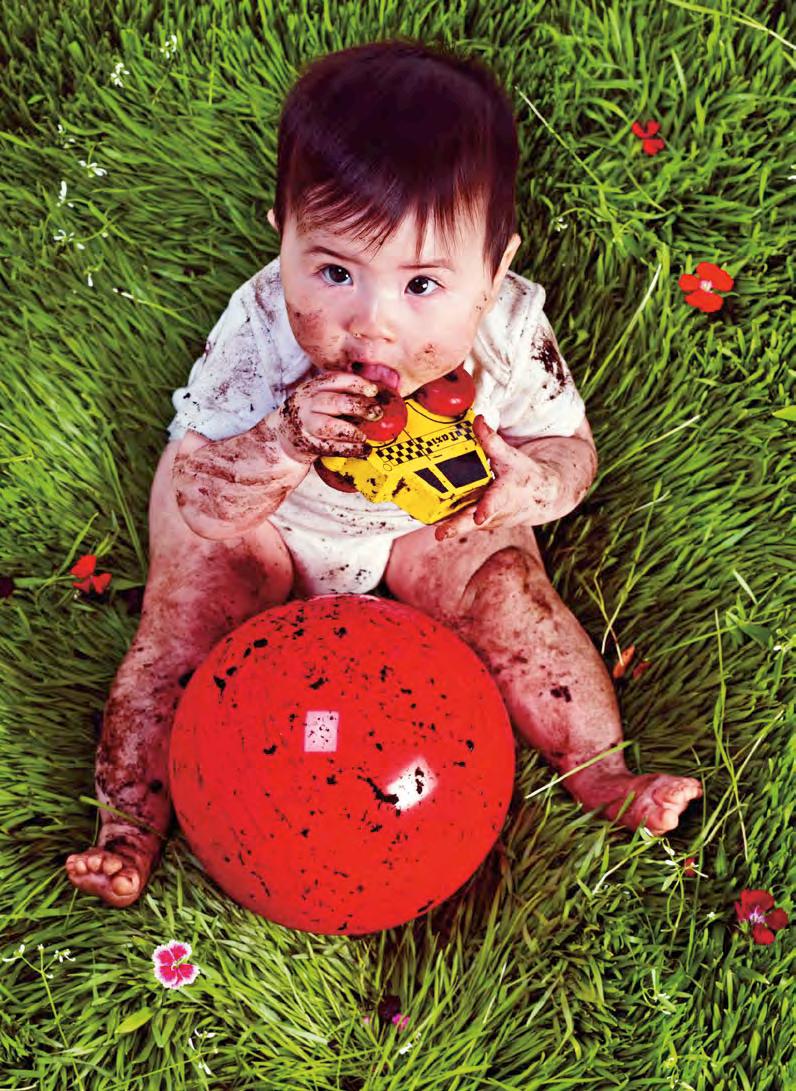
Trillions of them live in us and on us—but have we been scrubbing them away at our peril?
by anne mullensFor the last 20 winters my daughter Kate has su FFered From eczema. Over the years we struggled to find solutions. We’d get various prescription ointments from her doctor. She’d take a daily antihistamine, avoid any foods she suspected might be her triggers and increase her intake of omega-3s. Despite all this, her eczema would sometimes crack, bleed, peel and even become infected.
►
This past winter, though, she hasn’t had a single patch of eczema. And, as a bonus, she’s used her asthma inhaler only once instead of the usual dozens of times. Why? We think it’s probiotics—good bacteria. Since last autumn she’s been taking a daily dose of ten billion active bacterial cells, strains of lactobacillus and bifidobacteria in capsules we bought from the vitamin section of our local chemist.
While the scientific jury is still fiercely debating the effectiveness of probiotics for the treatment of eczema and asthma, some recent studies have been cautiously encouraging. Kate was eager to try anything. “I had nothing to lose. And I’m completely convinced that this is what’s making the difference,” she says.
because I was working on an article about the burgeoning research into our close and essential relationship with the bacteria and other micro-organisms that live on and within us—and are known collectively as the microbiome.
These single-cell microbes are on our skin, in our mouth and nose, in our reproductive tract and in our gut. They outnumber our own human cells ten to one, in total comprising some ten trillion cells. And now we’re learning that we can’t live without them.
That’s quite a change in how we view bacteria. Some are even calling it revolutionary—including Dusko Ehrlich, the research director of the Paris-based Institut National de la Recherche Agronomique (INRA), one of the leading institutions for studying the role of the microbiome in human health. According
to Ehrlich, “we’re learning things about the human body that we never knew anything about”.
Until recently the prevailing attitude among scientists was that the bacteria on and within us were either bad— disease-causing organisms—or unimportant. Among the public, the belief seemed to be that bacteria were germs to be eliminated by scrubbing them away with antibacterial soaps.
In the 21st century, however, scientists have been discovering that the microbiome performs a wide range of tasks essential to our survival. “They’re manufacturing vitamins, extracting nutrients from our food, assisting our immune system, communicating with our brain— and likely doing other jobs we don’t even know of yet,” says Dr Fergus Shanahan, a leading microbiome researcher from University College Cork.
to grasp just how truly revolutionary the growing understanding of microbiome is to the future of health, it helps to look back over the past 150 years.
In the mid-19th century, scientists started to revolutionise medicine with the discovery of germ theory. The realisation dawned that nasty bacteria and viruses were often behind many of the most dangerous diseases, such as tuberculosis, cholera, typhoid, bubonic plague, smallpox and polio.
That understanding led to the creation of antibiotics, improved sanitation and hygiene, hospital infection control, public health policies and vaccinations. And it created generations, particularly in the developed nations, who scrubbed, disinfected and sterilised with a fervour—
and used antibiotics for such things as sore throats and earaches.
Then, a decade or so ago, something unexpected happened: scientists discovered that we don’t have enough genes in our human genetic code to run our own bodies. “The simple fact is that the genes we get from our parents contain insuf-
it’s as if the human body is an ipad and various species of bacteria are the apps
had the missing genetic information.

ficient information for us to develop,” explains Shanahan.
this shocKing discovery arose out of the worldwide project to map all the DNA in the human genome. Since fruit flies have 14,000 genes and nematode worms 20,000, it was anticipated that humans would have more than 100,000. Instead, when the Human Genome Project was declared complete in 2003, it had found that humans possessed only between 20,000 and 25,000 genes—barely more than a worm! So where were the missing genes? That’s when eyes turned to the bacteria we’d been ignoring, or even killing off. Those tiny bugs
We now know those ten trillion cells of bacteria and other micro-organisms encode 360 times more genetic material than our own human cells. In fact, it’s as if the body is like a very sleek computer that requires software programs—the bacteria—to allow it to run properly. We’re the iPad and the various species in the microbiome are the apps.
In 2005 Dusko Ehrlich organised the first international workshop to establish a better understanding of those bacteria, bringing together some 70 people from four continents. Now, thousands of researchers in Britain, Europe, the United States, Canada, Australia, Japan, China and Korea are working together in an international consortium to identify and categorise all the different organisms in the microbiome and to work out what role they may play for us.
The findings have been coming thick and fast, with thousands published in medical papers in the last 12 months
alone. Some include tantalising evidence that even the obesity and Type 2 diabetes epidemics in Western nations could be linked to alterations in gut bacteria over the past 50 years. Others point out that more than 70 per cent of our immune system is in the digestive tract and we may have been killing off the bacteria that help it function properly.
For example, the 20th century saw an enormous increase in inflammatory bowel diseases (IBD), such as Crohn’s or ulcerative colitis, says Dr Gil Kaplan, a gastroenterologist and IBD expert at the University of Calgary in Canada. Researchers have found that individuals with IBD have lower rates of bacterial diversity in their intestines. It’s now believed that loss of gut micro-organisms or a change in the balance of bacteria may trigger IBD in genetically susceptible people.
Research is under way into the effectiveness of replacing lost bacteria with specific strains in the form of probiotics. “Clearly, some probiotics have considerable potential in the management of irritable bowel syndrome and inflammatory bowel disease,” says Professor Kevin Whelan of King’s College London.
as i researched this story, two findings of particular relevance to Kate and me kept emerging. Infants born by Caesarean section and not exposed to the microflora of their mother’s vaginal tract have at least five times higher rates of allergies, asthma and eczema. And infants given antibiotics in the first six months of life are similarly at risk. “We have found that exposure to healthy bacteria in early life is critical
to the development of a well-functioning immune system,” said Dr Brett Finlay, a microbiologist and microbiome researcher at the University of British Columbia.
It just so happens that my Kate was born by emergency C-section and given high doses of antibiotics during her first few days of life in the neonatal intensive care unit. Her food allergies, asthma and eczema started appearing about ten months later.
In October 2012, as Kate’s annual red eczema patches began to bloom again, another new well-designed study was published in Italy—one of a handful looking at giving good bacteria back in the form of probiotics. In the study, 48 adults with eczema were given either a placebo or a daily probiotic capsule of lactobacillus and bifidobacteria. The adults who got the probiotic had a significant improvement in their skin. That was the day I searched out a similar supplement for Kate at the chemist.
So does that mean we should all be taking daily probiotics? The answer is that it depends. For eczema and irritable bowel syndrome, evidence is emerging
in the future we can expect a whole host of new probiotic treatments ►


The Park Life Group have a wide variety of modern homes in beautiful locations across the country. So why not downsize, release capital and make the most of your leisure time in 2014. You could move to a stunning location and have a new detached home with a high-spec interior, that’s a delight to live in and easy to maintain. Its simpler than you think with The Park Life Group - with over 50 parks across 17 counties. People from all walks of life choose to live in a park home, or buy one as a second home, and become part of a friendly community. With almost 70 years of excellence, The Park Life Group offers remarkable value for money and superb customer service. Call us today for more details on our stunning homes and development plots available across the country or visit our website www.parklifegroup.com


Part Exchange Example: Part Exchange Available: Solicitor and Agents fees paid.

Park Home Price: £129,950
House Price: £200,000
Cash to you: £70,050

Open weekends:
Wickham Court - 22 & 23 FEB
Fareham, Hampshire PO17 6JS
Truro Heights - 22 & 23 FEB
Kenwyn Hill, Truro, TR1 3DY
Tregatillian Park - 22 & 23 FEB
St Columb Major, TR9 6JL
Cheltenham Spa Parks - 1 & 2 MAR
Bamfurlong Lane, Staverton, GL51 6TD
Cotswold Manor - 1 & 2 MAR
Stratford Bridge, Ripple, GL20 6HE
Regency Court - 1 & 2 MAR
Rochester, Kent, ME3 9TD
Waterbeach Court - 1 & 2 MAR
Denny End Road, Waterbeach CB25 9PF
Takeley Park - 1 & 2 MAR
Takeley Park, Takeley, CM22 6TD
Folly Park - 8 & 9 MAR
Clapham, Bedfordshire MK41 6AL
Peppercorn Park - 8 & 9 MAR
Clapham, Bedfordshire MK41 6HB
Radwell Court - 8 & 9 MAR
Radwell, Bedfordshire, MK43 7HS
Rymer Court - 8 & 9 MAR
Barnham, Nr Bury St Edmunds IP24 2PY
Westgate Park - 15 & 16 MAR
Westgate, Sleaford, NG34 7QP
Grosvenor Park - 15 & 16 MAR
Ripon, Yorkshire, HG4 1UF
Hedge Barton Park - 15 & 16 MAR
Fordcombe, Tunbridge Wells, Kent TN3 0SL
Thornlea Court - 15 & 16 MAR
Littlehampton, West Sussex BN17 7QD
Kingsmead Park- 15 & 16 MAR
Binbrook, Lincolnshire, LN8 6HS

that, yes, some specific bacterial strains, particularly various strains of lactobacillus and bifidobacteria, may help. But New-York-based Dr Martin Blaser, one of the longest-term microbiome researchers, says that for the most part, scientists simply aren’t sure which specific bacteria to recommend that people consume and which they should avoid. “We don’t know yet how to truly manipulate the microbiome to improve individual health,” he says.
But as soon as the science is there, says Blaser, we can expect a whole host of new probiotic treatments. In the future, for instance, every time you finish a prescription for an antibiotic you may get another medication to re-establish the good bacteria killed off by the treatment. He predicts that patients with conditions such as allergies, asthma,
psoriasis, diabetes, inflammatory bowel diseases—possibly even depression, anxiety and autism—will be tested to see what microbes they might be lacking and then given supplements for the missing bugs.
Although I know the science is still in its infancy, since researching and writing this article, I have changed my own habits. I take a daily probiotic supplement— the same one as Kate. I eat probiotic yogurt regularly. I no longer use antibacterial soaps or cleaners, but still make sure to wash my hands well with plain old soap and water. Has it made difference to my health? It’s too early to say.
But I am convinced, having seen the change in Kate, that some day soon, along with “eat your vegetables”, many mothers may be telling their children, “and your bacteria too”. n
It’s amazing how much a favourite song can be subverted by just one word— as demonstrated by Twitter feed #AddaWordRuinaSong: Back Problems in the USSR
God Save the Drama Queen
Papa’s Got a Brand New Colostomy Bag
Hill Billie Jean
Send In The Clowns Cars
I Wanna Be Mildly Sedated
And I Love Her Sister
Eye of the Tiger Lily
The First Time Ever I Saw Your Face Cream
Under No Pressure
My Boyfriend’s Hairy Back
Message in a Sample Bottle
That Don’t Impress Me Nan Much
The Long and Winding Roadkill
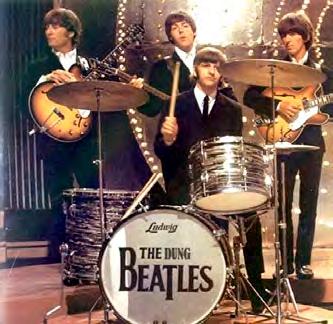
Sarah Stacey, 31, from South Yorkshire explains how she scooped a jackpot with Reader’s Digest Bingo
It was a Saturday night and I’d just got home from work. After my busy job in a call centre I was looking forward to relaxing, so I grabbed my computer and logged on to Reader’s Digest Bingo.
Looking at all the games, I decided to try the Tiki Temple slot. It’s easy to play, with a huge jackpot and lots of other cash prizes. You just click to spin the reels.
I started playing, and was delighted to win £200. Then I hit spin again and found myself in a bonus round. There were five treasure chests. One contained the jackpot. But which one? I chose a chest and stared in disbelief. I’d won an amazing £15,996!



The next day I couldn’t wait to tell my best friend Debbie. I took her out for a nice Italian meal to celebrate. ‘You’re so jammy!’ Debbie laughed. ‘How about a holiday?’
I suggested we spend the evening thinking about all the places we could visit. We still haven’t decided, but it will be somewhere exotic!
I’ve also bought a brand new Apple Mac, and I’m saving the rest of the money for a rainy day.

Reader’s Digest Bingo is brilliant fun. It’s not just bingo, there are so many different games all with prizes, big and small. And I love chatting with the other players. I couldn’t believe it when I won, but I see others winning on the site every day. I would absolutely recommend it to anyone.




New Yorkers love a colourful life. The Easter parade is a case in point. Back in the 19th century, it became traditional to stroll down the famous Fifth Avenue on Easter Sunday. It was an opportunity to show off expensive outfits. Today, New Yorkers try to outdo one another with their imaginative headgear.
Corbis/Emily Ann E EpstIn this country, we’ll be scoffing around 80 million chocolate eggs. But what does Easter mean around the world?
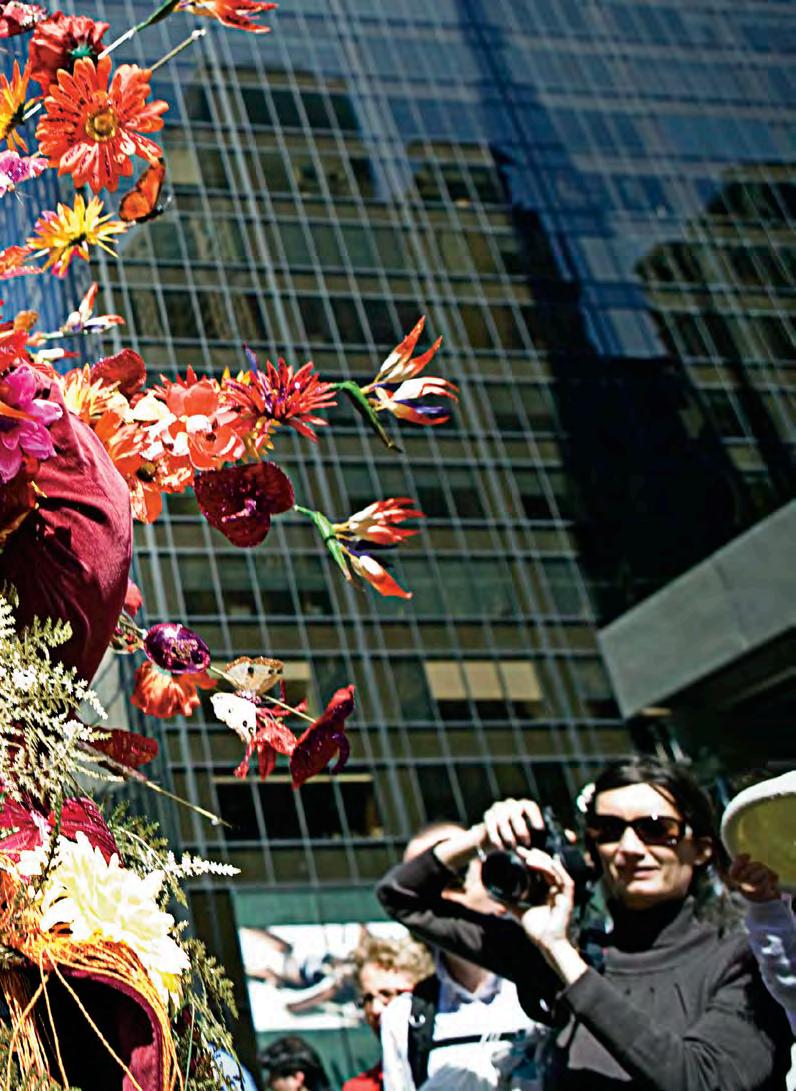 BY cornelia kumfert
BY cornelia kumfert

Hallowed Easter palms are supposed to protect man and beast from every imaginable evil. They’re traditionally made out of budding willow branches decorated with blossoms, leaves and grass. The inhabitants of the little town of Lipnica Murowana carry this tradition to extremes. Their Easter palms have reached over 100 feet.
Here religious traditions merge with ancient rituals originally performed to welcome spring. At Easter, small girls dress up as witches and go from house to house. They drive out evil spirits with their ornamental pussy willow, and in return are given treats by the house-owners they’ve freed from the demons.
On many rural slopes, huge Easter fires light up the sky on the night before Easter Sunday. In days gone by, the fires were kindled to drive out the winter and keep away witches and evil spirits. Today, families and their friends join to celebrate the Resurrection and the prospect of eternal life.
Joc H en tack/a lam Y

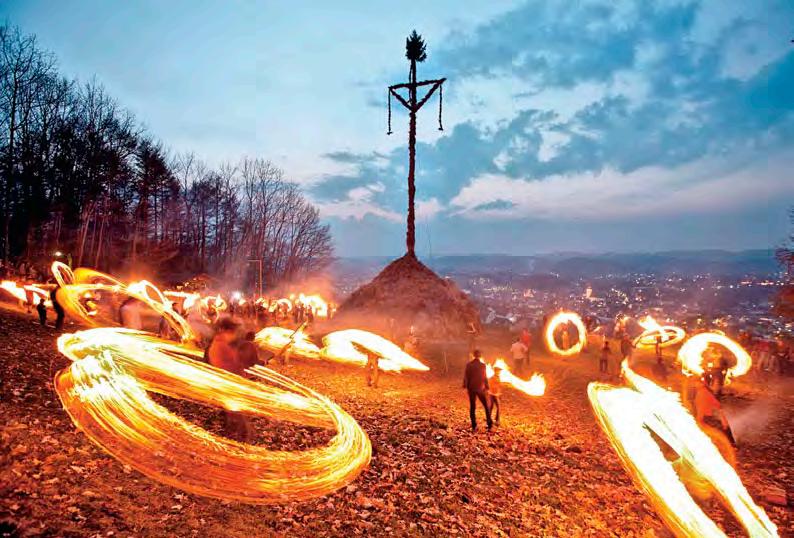 Gett Y i ma G es/ s H alamo v
Gett Y i ma G es/ s H alamo v


Every year, a sumptuous Easter procession winds its way through Antigua, a former capital. Men dressed in purple carry wooden altars weighing a ton or more over colourful carpets of wood shavings, tinted sand and thousands of blossoms. These so-called alfombras take shape on the street, depicting not only intricate patterns of great beauty but also verses from the Bible.
Much like anywhere else, the key figure at Easter Down Under is a furry little animal with long ears. Preservationists have seized on the Easter-bunny tradition to draw attention to the fate of the bilby, a marsupial threatened with extinction. They boldly announced that from now on the bilby was the official Easter-egg supplier. And the idea caught on. Now you can even buy these marsupials in supermarkets—but only as chocolate.
picture alliance/dpa; imo


During the Semana Santa (Holy Week), mile-long Easter processions go snaking their way through the towns, accompanied by rhythmic drumbeats. “Sinners” dressed in pointed hats and long cloaks are an integral part of the processions, a tradition that dates back to the 16th century. n
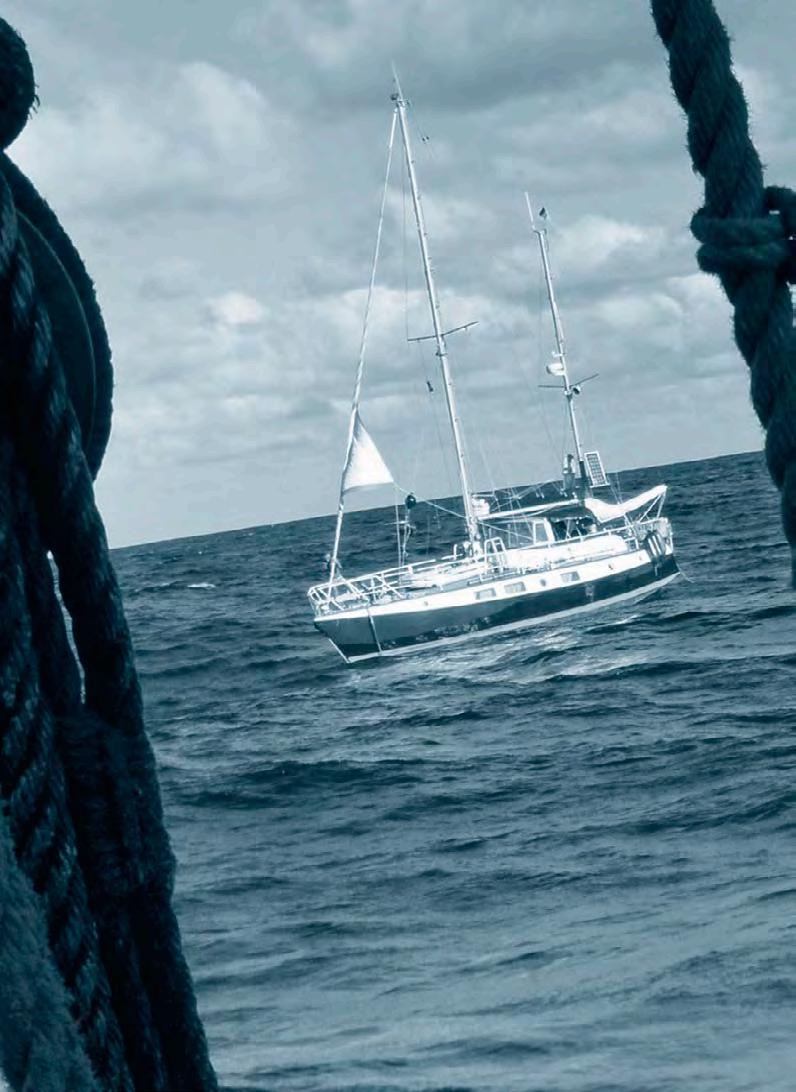 by lennox morrison
by lennox morrison
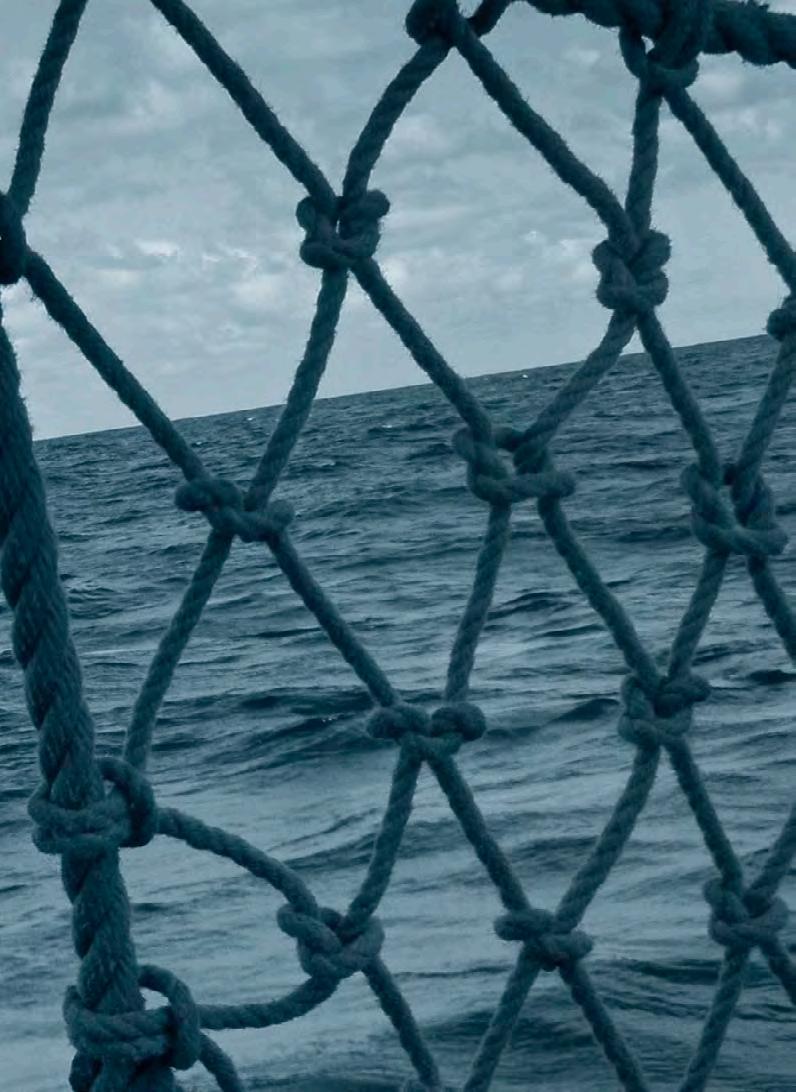
Lost in the mid-Atlantic, a man struggles to save both his life and his dream
In the final light of a tropical evening, Moritz Herrmann, barefoot in T-shirt and shorts, is at the helm of his yacht Fidel. Memories of his days as a teacher, cooped up in a classroom, flit across his mind. He breathes in deeply, savouring the tangy ocean air. Then he smiles. The second leg of his solo voyage around the world is well under way.
Slipping on sandals, Moritz goes down to his wood-lined cabin: neat white curtains, a board with photos pinned on it. Fidel, a modest 40-foot two-master, saved from scrap, isn’t simply a pleasure craft— it’s home. Living on a reduced pension, 71-year-old Moritz had to choose between renting a flat and running a boat. He didn’t hesitate.
His first adventure was to cross the Atlantic solo. After that, his blue eyes bright with boyish enthusiasm, he told his partner Ulla Witting: “I’ve always dreamed of sailing round the world. I’ve still got my health. It’s now or never.”
On this particular evening, December 9, 2012, it’s nine days since Moritz left the Cape Verde islands off west Africa. He’s heading across the north Atlantic to the Caribbean. Glancing at the radar-like screen of his Automatic Identification System, he sees there’s no shipping nearby. That means he can nap— but only for 15 minutes. Having set two alarm clocks and the yacht’s autopilot, he lies on a bench on deck, hears the trade wind whispering in the rigging and watches the sky darken to purple-grey.
Suddenly a pistol-like sound pierces his reverie. The sails whip the wrong way. Fidel veers off course and waves smash her side-on. Moritz scrambles to
the wheel. But it spins uselessly. The wheel, he realises, can’t be connecting with the rudder.
Moritz furls the sails, then crawls into a small space in the stern to inspect the rudder shaft. His plan is to tighten any loose screws and get back on course. But, to his surprise, the screws are secure. Then he hears a sound like the clash of a blacksmith’s hammer on an anvil. The vessel see-saws so violently that crockery and tins of food fly through the cabin. A china mug whistles a hair’s breadth from his skull. Moritz staggers back on deck into a pitch-black starless night. Not only is Fidel lying the wrong way in the water, but the weather has turned rough.
Gripping the railing to stay upright, Moritz sees criss-crossing waves, eight feet high. But he still needs to find out what’s happening with the rudder. Steeling himself, he straps on a head torch, drops the bathing ladder over the stern, and descends into crashing white foam. He has no safety line—being tethered has nearly cost him his life in the past.
The pitching vessel slaps him against the hull like a rag doll, and he has a terrifying thought: If I’m thrown off, could I haul myself on board? No. If I let go, everything will be over.
Eyes burning with the salt water, he dips a bare foot into the warm ocean and feels the rudder hanging askew from its shaft. The massive blade is clanging against the hull. Soaked, he climbs on to the stern. How to secure such a heavy blade? He tries adjusting a wire connected to the lower rudder section, but the tolling sound continues. Under such

punishment, even Fidel’s steel hull could crack. The swinging blade could also destroy the propeller—and without that, the Fidel’s 50hp engine will be useless. He cuts the wire and the rudder disappears into the ocean depths.
Moritz dashes to the VHF radio: “Attention all shipping! This is Fidel! I’ve lost my rudder. I’m drifting. My position is 14°15’N, 39°16’W.” It wasn’t a Mayday— simply a warning to other shipping that he couldn’t steer out of their way.
Later, he lies on his bunk, thoughts whirring: December 9. 1,200 sea miles to Barbados, the next landfall. With this wind, I can make up to two knots, I’ll reach land in late February. I have food and water for four weeks.
On the evening of December 10, 61-year-old Ulla, an art teacher, is at home, arranging photos in an album. Pausing

After 15 years with him, she knows how determined he is: Moritz Herrmann and his partner Ulla Witting
to sip ginger tea, she glances out at the snow-dusted shrubs in her front garden. Her cosy house in Oldenburg, north Germany, is Moritz’s home too when he’s on land. The phone rings. Her face lights up: it’s him. As she listens, her expression tightens with anxiety. “Shall I raise the alert?” she asks. “No!” he answers. “My life isn’t in immediate danger.”
Ulla’s mind swirls with the added perils Moritz now faces. But after 15 years with him, she knows how determined he is. She immediately calls Boris, Moritz’s son. Boris is 31 and a professional yachtsman, brought up by his father since he was a toddler.
Boris is in New York, where he’s lunching with the crew he’ll soon be sailing with in a speed challenge. Putting down his hamburger, he listens intently, grasping his father’s dilemma straightaway. “If he’s rescued out there he’ll have to
abandon Fidel and scuttle her. He won’t want to do that. She’s all he’s got.”
Next, Boris calls his father by satellite phone. “Listen, I’ve talked your problem through with the guys. There are things you can try…”
Not long afterwards, Moritz staggers across the heaving deck, dragging a massive sail pole to which he’s attached a driftwood panel that he found weeks ago and reckoned might come in useful one day. Heart pumping, he lowers this makeshift rudder over the stern and pulls on its guide ropes. Fidel shifts position. Moritz brightens. A fresh wave then knocks her off course. He tries

“Listen, there are things you can try”: Moritz’s son Boris calls his father by satellite phone from New York
He wipes the sweat from his palms and
repeatedly. Finally, grim-faced, he dismantles his useless experiment.
In the fierce sun, his temples start to throb. But he daren’t take his migraine pills—not since a doctor warned him that they’re weakening his heart. In the bow he winds 100 yards of rope into a huge coil. He drags it to the stern, connects guide ropes to it and throws it overboard. Using the rope, he winches the coil to starboard, to port. Fidel responds. Then a wave slams her. Arms trembling, sweat pouring, Moritz winches for two hours, then three. His heart palpitates. He can’t breathe.
He leaves the coil trailing and dozes off on his bench. First light reveals that the coil is wrapped around the propeller. He has to free it, otherwise he won’t
be able to use the engine to make the manoeuvres he’ll need if he’s towed by another vessel.
Moritz attacks the coil with his sailor’s knife. But the ropes are too thick to slice. He ends up hanging one-handed from the bathing ladder, sawing at them with an old kitchen knife. In the water around him he spies a pilot fish—a sign that a shark might be nearby.
The yacht roller-coasters. Moritz’s knife slips. Blood spills into the water. In the pounding heat, an icy shiver climbs his spine. But he keeps hacking for three days until the propeller is free. By satellite text he admits to Ulla, “My heart can’t cope with this effort any more.” Her answer comes: “Will we ever see each other again?”
“Calling Fidel! This is Living the Dream. I’m on my way to you.” On his sixth day adrift, Moritz hears an unfam-iliar voice on the radio. Soon, a yacht sails close. He knows Ulla and Boris have asked radio hams to request any skippers nearby to bring food and water. What Moritz really longs for is a tow. But this yacht is too small.
“Do you want to come on board?” asks Joe Mangold, the captain of Living the Dream, after he’s talked to Moritz for a while. Moritz remembers the raft he made when he was five, and all the extra jobs he’s done since he was 12 to keep on sailing. Fidel has third-party insurance but if he abandons her he’ll never
yacht Yec’hed Mad. In desperation, Moritz asks, “Would you tow me for half a day?” Yec’hed Mad is plastic-built and weighs five tons. Fidel, made of steel, weighs 18 tons. “We’ll try it for 24 hours,” is the reply.
The French vessel heaves into view, and a line is thrown across. When Christmas Day dawns, Fidel is bouncing along in Yec’hed Mad’s wake. But then the wind falls. Without it, Yec’hed Mad hasn’t the power to tow Fidel, and its crew can’t risk waiting for the wind to change— their provisions won’t last for ever. In a waterproof bag, they send Moritz duck confit, Nutella and water. As sunset falls, he thanks them heartily, and watches
rereads Ulla’s latest text: “Keep going”
manage to replace her. “Thanks,” he tells Joe, “but I’m staying.”
After throwing himself on the mercy of the ocean, Moritz toils almost nonstop. The furnace-like heat during the day drops only slightly at night. The deck plunges relentlessly. The days merge into one.
In the cockpit, he scans the lurching horizon. He wipes the sweat from his palms, taps on the satellite phone, rereads Ulla’s latest text: “Keep going.” He cradles the phone for a long time, gazing down at her message. Then he stares out again across the watery expanse.
On the afternoon of Christmas Eve, the radio crackles with another friendly voice: “Calling Fidel!” It’s a nearby French
them vanish over the horizon. The ocean is empty once again.
Moritz now recalculates: Chances of a bigger ship coming by in this corner of the ocean? Practically zero. Speed: I’d reckoned on two knots but with all this zigzagging it’s 0.5 knots. No chance of reaching land by February. It’ll be April. At best.
He peers bleakly into the night. Thoughts he’s been suppressing push to the front of his mind. Maybe I should have gone with the people who offered to take me. I don’t want to abandon my floating home but I might have to.
“Where’s that bill of lading from Portugal?” It’s December 26 and in his wood-lined cabin on board Tres Hombres, a tall ship in full sail, Captain Arjen ►
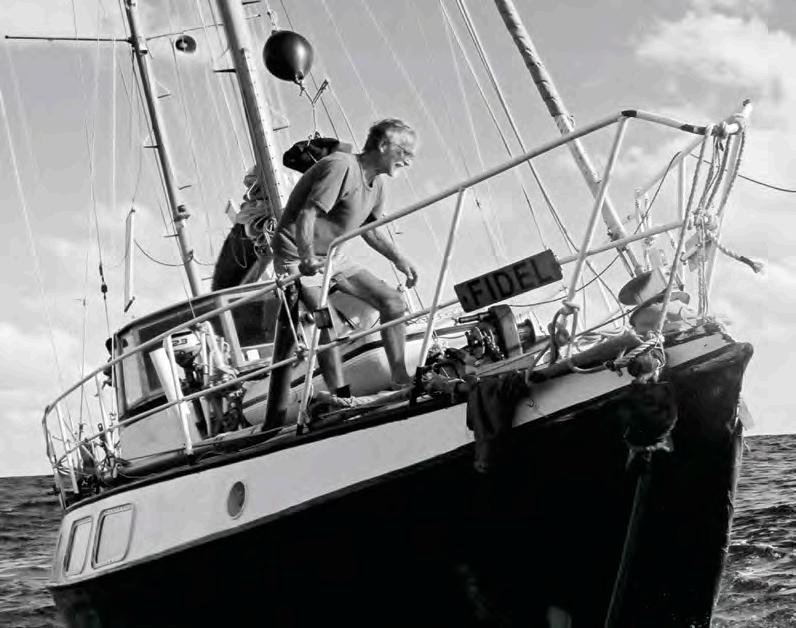
van der Veen is checking the paperwork for her cargo of organic wine and olive oil. With his flowing locks, the 38-year-old Dutchman is known to his crew as Captain Longhair.
First mate Eric Henry appears: “We’ve received a message from the coastguard on Martinique.” (Concerned about Moritz, the Yec’hed Mad crew had alerted the coastguard about him.) Captain Longhair hurries to the bridge and calls the coastguard for details. Fidel is 100 sea miles away in the wrong direction and 800 sea miles from landfall. “There’s a life at stake,” the captain declares. On deck he orders: “Take down the stun sails!” Ropes creaking, the crew take
down these extra sails they’d put up earlier to make the most of the winds.
Tres Hombres is unique—an 80-yearold engineless cargo ship, and an ambassador for the sustainable freighter fleet, Fairtransport. She sails all night to reach Fidel’s position. In the bow, a man known as Eagle Eye Joel is on look-out. Nothing but rolling mid-Atlantic. Captain Saved! Moritz grabbing the tow line from Tres Hombres and (below right) looking thin and exhausted in Saint Lucia with “Captain Longhair” (right) and a member of his crew
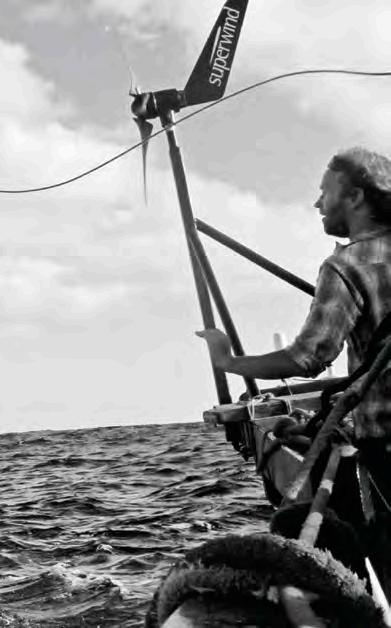

Longhair calls Moritz’s satellite phone. No response.
At that moment, bone-tired and gaunt, Moritz is fixing a leak from the fuel tank, down in the bilges. He can’t hear the phone, kept in the cockpit. After climbing back up, he spots the missed call and instantly returns it. In a weak voice he says: “This is Fidel.” A couple of hours later, scouring the horizon, he spies a stripe of white sail, then towers of sails and, finally, a beautiful dark ship, straight from a history book.
The Tres Hombres crew go into the rigging and send over a tow line. Eventually all 15 of them line up on the poop deck. Their captain, in T-shirt and shorts, sits with legs dangling over the stern. Moritz, looking at their bronzed and beaming faces, is speechless.
“What’s your name?” the captain shouts to him.
“Moritz,” he manages to reply, his thoughts racing, his legs a little shaky. In one of his restless naps he dreamed of a boat like this arriving to save him, but dismissed it as fantasy. He asks tentatively, “How much will it cost for this tow?”
Captain Longhair glances at his crew. Moritz holds his breath. A tow of 800 nautical miles requires supreme seamanship—and will cost more than he can afford. “A few beers, in Saint Lucia,” Captain van der Veen says. For the first time in 19 long days, Moritz’s salt-cracked lips unfold in a full, heartfelt smile. n
Moritz Herrmann—and Fidel—reached Saint Lucia safely on January 4, 2013. For more on the Tres Hombres and Fairtransport, go to svtreshombres.com or fairtransport.eu.

Maybe you speak softly, or the people you’re talking to don’t listen or can’t hear. Or perhaps you’re so hesitant about expressing an opinion that no one notices what you’re trying to say.
Whatever the cause, there are easy ways to turn up the volume, says personal impact skills expert Leonie Mellinger (mellinger.co.uk). “Imagine your voice is an invisible ball,” she says. “You have to throw it to the person you’re speaking to—you can’t drop it and expect them to pick it up. Practise by breathing in deeply, then count out loud to ten as you breathe out, pretending that each number is a tennis ball hitting a wall in front of you.”
Increasing your physical presence helps boost your confidence, and your voice.

“At a meeting, sit with both feet on the floor to ground yourself. Lean forward slightly and place your hands either side of you on the table—the space between them should be wider than your body,” Mellinger advises.
Do watch your language if you find that other people get the credit for a point you made earlier, especially if you’re female.
“Women often talk in a way that asks to be disregarded,” says Mellinger, so avoid qualifying or apologising words. There’s a world of difference between saying, “We should do X,” and, “I know this sounds silly, but I think...”

In the past few years, 3D printing has been taken up by architects, artists, engineers and increasingly by medics (it’s perfect for making dental crowns and joint implants). Over five million people have already received 3D-printed medical parts, and even more will benefit once scientists start using “living ink” to print out organs for transplants. More prosaically, it’ll change the way we shop, bringing custom-made goods from classic-car components to one-off cakes and made-to-measure shoes within easy reach.
In DIY terms, over four million objects were produced by UK enthusiasts last year, a number that’s set to soar now you can get a 3D printer for under £1,000. You can turn your photo into a mini-me figure for a wedding cake and create a wedding ring too. Scan in a child’s painting to make a charmingly wonky toy, or knock out a hard-to-find spare part. More impressive still, print your own prosthetics like the Robohand, created by carpenter Richard Van As to replace the fingers he lost in an argument with a saw.

To make it easier, pretend you’re hosting a dinner party, she suggests. Because you’re responsible for your guests, you’ll be more authoritative. And knowing you have something of value to share makes it easier to speak up. ►
True, there are drawbacks. You can’t expect miracles from a desktop printer, so most items churned out by amateurs are tiny, rigid and plastic—with few, if any, moving parts. It takes hours for anything to emerge because 3D printers build up objects layer by layer and months to master the technique. But learning the basics (see the 3D tutorial at digitalarts online) could awaken skills you didn’t know you had, or inspire a budding designer in the family. Or at least you can knock out a coaster or two and bask in the pride of creation.
The right shape makes the most of a modest wine; the wrong one can spoil an exclusive vintage, say experts. And while few of us are likely to buy separate glasses for Bordeaux and Burgundy, as perfectionists recommend, it’s worth swapping Paris goblets for a more wine-friendly design.
red wines need a big glass that’s wide at the base to release the bouquet and narrower at the rim to funnel it to your nose. If your budget’s bin end, Ikea’s Svalka, recommended by wine critic Jane MacQuitty, costs just £1.25 for six. Should you be tempted to overfill a big glass, ISO (international standards organisation) tasting glasses (from £12 for six) are a smaller alternative.

Curvier champagne glasses will boost the flavour—at a price


white wine glasses are traditionally smaller to keep the wine cool, though many experts are happy to use the same glass as for red. All agree that sparkling wine needs a tall glass to keep it fizzing, which is why champagne is usually served in a flute. As this is often too slim to allow the flavour to develop, the latest styles are curvier, if pricier. Berry Bros & Rudd’s champagne glasses will set you back £47.50 for two.
● Care for your glasses by rinsing them to banish every trace of detergent and storing them upright to avoid a musty tang. And as most glasses are broken in the wash, don’t rush to clear up after a heavy night.

It takes an average buyer just eight minutes to decide on a house—no wonder almost half soon discover problems. So why not take a few tips from the professionals?
1. Be the buyer everyone wants “You need cash, or at least a buyer for your existing house who’s read the survey and had a mortgage offer confirmed, or else estate agents won’t take you seriously,” says Kate Faulkner of designsonproperty.co.uk.
2. Try before you buy Rent for a while before settling in a new area or deciding on a different type of house. A stay in the countryside in winter or a historic town at the height of the tourist season will soon reveal what it’s like to live the dream.
3. have a house-hunting holiday View several in a few days, and get an offer in fast. If you spot a promising property that isn’t on your list, see if the sale board has a QR barcode, which lets you access details. And follow the Waitrose van—along with Bugaboo pushchairs and coffee shops, they’re signs that an area’s on the up.
4. don’t wait for rightmove alerts If your ideal home’s not for sale, put a polite note
through the door expressing interest. If that’s not fruitful, consider hiring a property finder. “A good one will also negotiate the sale for you and see it through, which can cover the cost,” says Faulkner.
5. look on the dark side Visit your dream house at night, in the rush hour and when it rains. Ponder how you’d feel if a farm building or fracking blocked a great view. And if the outlook is over a river or the sea, find out the level of last winter’s floods.
6. see beneath the surface Take reference pics with your phone during viewings, concentrating on what’s expensive to put right—leaking gutters, damp walls, vertical cracks, suspect wiring and rotting wood. Check the shower and heating, and look up broadband speeds and mobile reception.
7. Pay the asking price, because haggling could cost you your dream home. On the other hand, be careful about joining in a bidding war. “Offer the price you’re willing to pay and no more,” advises Faulkner.
For more tips, see Choosing Your Perfect Home on propertychecklists.co.uk.
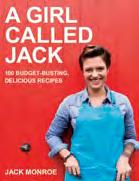
It takes more than a nice writing style to gain attention, as Jack Monroe’s blog about eating well for a tenner a week shows. It won her a contract with Sainsbury’s—to the chagrin of the average blogger earning £1.75 a day. What helped her was a strong story (a single mum on benefits) and a flair for turning cheap ingredients into tasty meals. Must-read content is essential, so expertise in food, gardening, travel or IT is handy. And above all, a blog needs personality.
Once you’ve got a grabby headline, start playing around with a template from Wordpress or Blogger, mixing segments of text with plenty of pics. It’s an intimate connection, so do all you can to engage your readers. Reach out to new ones by linking to other blogs, sharing your own on Google+ and publicising it via Facebook, Twitter and YouTube. Then try to update it at the same time every day or week.
A large following could bring products to test, paid-for links and the odd ad. Even if a publisher doesn’t come calling, you’ll know enough to write a blog about blogging. And with 273 million bloggers jostling for attention, there’s certainly a market for that.
wHat your jobcentre won’t tell you
● I’m under constant pressure to stop benefits. I’m encouraged to impose sanctions—officialese for withdrawing benefits— and disciplined if I don’t do it often enough. There’s plenty of opportunity: claimants now lose benefits for four weeks if they forget to sign on and for three years if they keep breaking the rules. People have even been summoned to the Jobcentre while in hospital, so if you’re ill get a doctor’s note.
● strike out that degree. If I think it’ll put off an employer, I’ll suggest you delete it from your CV.
● It’s a good thing you’re unemployed because claiming Jobseeker’s is a full-time job. You need to spend 35 hours a week on work-related activity such as signing in, looking for work, attending interviews and completing all the tasks in your Claimant Commitment.
● It’s scary here. Wonder why the place is stuffed with security guards? Assaults and threats to staff rose to over 35,000 last year, 50% up on 2012. And that’s not counting the fights that break out.
● your doctor doesn’t have the final say. Benefits staff may ignore medical advice
and insist that Employment and Support Allowance (sickness and disability) claimants attend interviews or do unpaid work experience—or their benefit is withdrawn.
● I need a handout too. I’m paid so little that when Universal Credit comes in, I’ll be one of the 40% of Jobcentre staff doling out benefits one day and claiming them the next.
● Bye bye Benefits street. From this month, there’s no such thing as long-term unemployed. Under the Help to Work scheme, anyone who’s been on Jobseeker’s
because you’re on a low wage or work part-time, I can insist that you look for a higher-paid job or attend a workfare scheme.
● Psst...you don’t have to take that job. If you have a disability, you can restrict the sort of work you do or the distance you travel. And I can’t force carers to take a full-time job or make lone parents work outside school hours if they have a child under 13.
● Tell me where you’re going. You must let me know, even if you’re just out for the day.

Allowance for three years now has to do community work (like litter-clearing), attend the Jobcentre every day or undergo intensive training.
● workers could end up here. I could soon be in charge of dispensing benefits to people in work too. If you claim them
● no broadband, no benefit. Though Citizen’s Advice say four out of five clients need help to fill in online forms, Jobseekers’ claimants must use the computerised Jobmatch service. If they don’t have a laptop they can go to the library, and if they refuse to accept cookies I expect a written report. (If I were you, I’d keep one anyway because the system’s liable to crash.)
● sex working is out. Ads for the sex industry were banned four years ago, so I’ll no longer suggest you consider a career as a lap dancer. But I’m happy to suggest you take a job cleaning up after the show. n

“Good time management” is one of those phrases people write down in the Skills sections of job application forms when they don’t speak French or play a musical instrument. But the truth is that when you’re a doctor there’s simply no way to manage time—because it’s taken up with totally unpredictable events.
Every morning I plan with military precision to ensure the right things are prioritised. Yet this planning invariably goes wrong as the day progresses and more and more urgent jobs are given to me, adding to the list of what must be done before I leave.
I’d been rushing round all day, desperately trying to get through my list of jobs, when a nurse called me to see Mrs Feathers who was about to go home, but had some questions first. I groaned. The paperwork I needed to do meant that I’d have to stay late as it was, and now someone wanted to ask me questions. My life would be so much easier if it wasn’t for patients.
But, of course, it’s easy to get your priorities wrong—so I tried to remind myself that I trained as

All he wanted was someone to give him their time
a doctor because I wanted to help people, not fill out forms all day.
I arrived at Mrs Feathers’s bedside. She had breast cancer and had come into hospital to have her left breast removed. “The consultant seemed really pleased with the reconstruction, but…” Her voice trailed off.
I closed the curtains around the bed and sat down. “It’s about my husband,” she went on. “Doctor, I’m sorry to take up your time with this, but, well, he can’t bear to look at it.”
I swallowed hard. What we didn’t learn about in medical school is how serious illnesses
affect not only the sufferers, but also the people around them. And here was Mrs Feathers, who’d just gone through major surgery, worrying about her husband rather than herself. “Would you talk to him doctor?” she asked.
I had X-rays to order, discharge summaries to write, letters to dictate. “Of course I will,” I replied —and when her husband arrived to collect her I suggested that we popped to the canteen first.
Sitting opposite him, there was nothing I could say to make it all go back magically to how it was before his wife got cancer. And I knew that he knew this. All he really wanted was someone to give him their time. While the operation may have been a success, for Mr Feathers the scars are a constant reminder that his wife had cancer, that she nearly died and that he was powerless to help her. He thinks things will never be the same again.
I couldn’t rush him. By the time we’d finished, I should have been going home long ago. But talking to Mr Feathers was far more important than filling out forms. As he got her painkillers from the nurses, I stopped to say goodbye to his wife. “He’ll be fine,” I reassured her. “It just takes time.”
Then I got on with my other jobs before finally heading home.
Max Pemberton is a hospital doctor and author. He’s also the resident doctor on ITV’s This Morning
what’s the truth? Logical reasoning helps with this one. Most people move while they’re asleep and that would scare spiders. Most people don’t sleep with their mouth open—and even those who do, tend not to swallow if something enters it. You can test this by putting your finger in someone’s mouth as they sleep. They’re far more likely to wake up and ask what on earth you’re doing than try to swallow it. Also, spiders tend to avoid open mouths—if they didn’t, evolution would have made sure they became extinct, instead of one of the most successful groups of animals on the planet.

where did the myth come from?
It’s thought that it was first mentioned in a book on insect and spider folklore in 1954. Then in 1993, a journalist called Lisa Holst wrote an article about the urban myths circulating in the early days of email and quoted this entirely false statistic as an example of how gullible people were. The result was that people began quoting her article as the source of the “fact”, despite Holst so clearly saying that it was untrue.
so there’s nothing to worry about?
Theoretically, a spider could drop into your mouth if it was hanging from the ceiling. But the chances that this would happen just as you opened your mouth and were about to swallow is so infinitesimally small as to not be worth worrying about. ■

What you should—and shouldn’t— be scoffing from your forties onwards
You need to keep high blood pressure, cholesterol and excessive weight gain at bay— and try to maintain strong bones.
Tuck in Fish. Choose salmon and rainbow trout for omega-3 fatty acids, which help hold back heart disease and arthritis. almonds. These are a source of vitamin E, calcium, protein and healthy unsaturated fat. apples. They’re high in fibre, pectin and vitamin C—and so good for fresh-looking skin. Putting on weight is easier now. otein.

It helps you feel full, and digest carbs more slowly. It also prevents fat depositing around takeaways and ready meals. They’re often very high and salt.
This is the menopause decade when women need plenty of calcium to preserve bone density. It’s also the time to boost antioxidants to help guard against cardiovascular disease and cancer.
Tuck in soya. This contains phytoestrogens, which are thought by some to balance female hormones and mitigate the symptoms of the menopause. Tofu helps with bone density. Lentils. They’re another handy hormone regulator. Fresh veg. High in fibre, vegetables help in the battle against an expanding midriff.
Avoid eating too much. Your metabolism is still slowing down. too much spic It can exacerbate hot flushes.

At this age, low-salt, nutrientrich foods are essential for continued good health. You also need to eat the right things to counteract any possible memory loss and depression.
Tuck in Blueberries. They’re packed with antioxidants and great for circulation and healthy brain function.
Fish. Omega-3 fatty fish will maintain healthy brain activity and lower the risk of heart disease, depression and cancer. Macadamia nuts. These are excellent for preventing high cholesterol.
spinach. It’s high in lutein, an antioxidant that can help stave off macular degeneration, a leading cause of blindness among older people.
Cheese. Yes, please! Dairy foods are packed with nutrients and help maintain bone health.
Avoid too much salt. blood pressure. not drinking enough water. Stay hydrated to keep your brain alert and bowels healthy. too little outdoor exercise.
Vitamin D from the sun helps bones stay stronger.
Omega-3 fatty fish maintain healthy brain activity and lower the risk of heart disease

men’s health know your

Did you know that in 97 per cent of testicular cancer cases you can feel a lump— and that, if found and treated early, there’s a 98 per cent survival rate? That makes self-examination—for men of all ages—a no-brainer:
l Check after a bath or shower when your skin is relaxed.
l Stand in front of a mirror. Check for any swelling on the scrotal skin.
l Examine each testicle with both hands. Place the index and middle fingers underneath the testicle with the thumbs on top. Roll it gently between thumbs and fingers. It shouldn’t be painful.
Tried all those over-thecounter remedies for your warts and verrucas but no joy? Try raw garlic or duct tape instead. Studies show they work—and I’m living proof that they do: I’ve used both methods to get rid of stubborn verrucas.
The first time, I put a thin slice of garlic onto the offending wart and held it in place with a sticking plaster. Admittedly, it stank, but the verruca went in a day (usually you need


1. you can only get shingles if you’ve had chickenpox. The varicella-zoster virus hides along a nerve path in your body and can pop up again years later as shingles.
2. you can catch chickenpox from someone with shingles, but not the other way round. Keeping the rash covered

to apply the garlic daily for longer than that).
The second time, hoping for a less malodorous cure, I covered the verruca with duct tape and it vanished in a couple of weeks. You should cut the tape to the size of the wart and apply for six days before soaking, buffing and leaving the wart exposed for 12 hours. Then start again. Please note, though: both remedies can sometimes cause minor skin irritation.
avoids infecting people who haven’t had chickenpox.
3. the younger you had chickenpox as a child, the more likely you are to develop shingles as an adult. but it’s most common in the over-50s.
4. you’re likely to get it on one side of your body only. And it’s most often found on the torso. The first sign is usually intense pain, burning, tingling or numbness. A rash then appears and develops into blisters.
5. there’s no cure, but early antiviral treatment can help with nerve pain. So do see a doctor as soon as you realise something’s wrong.
6. since september last year a new vaccine has been available on the nHs for older people. At the moment, because of the logistics of providing so many vaccines, it’s only given if you’re aged 70 or 79. Otherwise, you can have it done privately at £150–£200 a shot. ►










If your days out are being ruined by too many visits to the toilet you may be su ering from an overactive bladder.
Over 7 million people in the UK su er too, so you’re not alone.
Luckily there are treatment options available including e ective medications from your doctor.
To find out more about overactive bladder and the help available visit
www.bladderproblem.co.uk
Or call our free helpline on 0800 011
4766












News from the land of nod is highlighting some novel ways to help noisy sleepers and people suffering from healththreatening sleep apnoea

Can insomnia cause depression?
AYes. poor sleep can have a dramatic impact on mental health. one study suggests that insomniacs are ten times more likely to suffer from depression. on the other hand, pulling the occasional all-nighter—just one night, mind—has been shown to lift the spirits for as long as a month, possibly because it resets the body clock, enabling someone who’s depressed to sleep better.
Sing us a song. But not just any old song—a singing programme specially designed to strengthen the pharyngeal muscles in the throat. (these muscles getting lax is a cause of snoring.) A trial at the royal Devon and exeter Hospital showed that daily singing exercises over three months reduced snoring and improved moderate sleep apnoea, in which sufferers keep waking up when their airway is obstructed. to find out more, go to singingforsnorers.com. Have a tongue pacemaker fitted. For those with bad obstructive sleep apnoea (which can increase the risk of stroke, heart problems and high blood pressure), a new electronic stimulation therapy might be the solution. A device smaller than a box of matches is implanted under the collarbone, with an ultra-thin cable to monitor breathing at the diaphragm and another going up to the hypoglossal nerve under the tongue. When the sleeper inhales, a weak electrical impulse travels up to the tongue to stop it relaxing and blocking the airway. In a recent trial, it dramatically improved participants’ sleep apnoea within a year. Exercise (yes, even just before bed). According to a US poll, people who exercise are less likely to have sleep apnoea. Forty-four per cent of nonexercisers suffered, but only 22 per cent of moderately sporty types—and just 19 per cent of vigorous exercisers. Surprisingly, too, those exercising close to bedtime didn’t report an adverse effect on sleep quality. n
For more top health tips
Check out our special health pages at readersdigest.co.uk/health

If you have a problem with your hearing but would suffer discomfort with a fitting in your ear then the La Belle could be the digital answer
La Belle comes from Bruckhoff, experts at putting hearing aids onto glasses. Now they can fit a digital hearing aid onto your glasses!
And their hearing aids are nearly invisible because they are hidden in the arm of your spectacles.
Their precise technology is tried and trusted and they have refined it even more with their latest generation of the digital La Belle.
And if you don't wear glasses then there is a selection of attractive ladies and gentlemen's frames available.

This incredible hearing aid is suitable for people suffering from a mild to severe conductive hearing loss.
The glasses are attractively styled and few will guess that they contain a high quality digital hearing aid.
And there's nothing in the ear to irritate you or be seen.
So if you feel you are missing out when you are watching TV or going to the theatre, cinema, meetingsor out shopping then take a look at the La Belle, it could bring the joy of living.

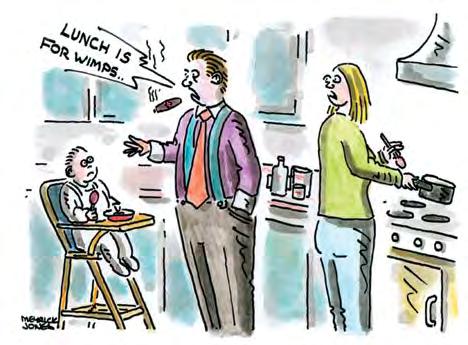
“You buy £100 of Royal Mail shares and you turn into a monster!”
Ever fancied playing the stock market— but never been sure exactly how to do it? Our new monthly guide has all the answers you need
Anyone can buy shares. You certainly don’t need to be rich to get started. In fact, with online brokers it’s now easier and cheaper than ever before. Good planning, though, is essential.
Step 1: Which shares do you want to buy? There are some key questions you should ask yourself before deciding which company to buy your shares from. Among them are:
l Is the company growing? Look at its previous performance and get hold of—and read— the company reports.

l Is the company seen as high-risk, or is it stable and slowly growing?
l Is it affected by seasonal ups and downs?
You can spend time online using a free virtual portfolio to understand the process better. Yahoo has a version called Virtual Stock Exchange, Halifax offers a Fantasy Trader Account and there are several more. Try trading shares for a year with a virtual amount of money and you’ll learn a lot without spending anything.
Step 2: How much do you want to invest? A good piece of advice is never to invest more than you can afford to lose—because investing in shares is risky. Ultimately, the number of shares you buy is up to you. It will be based on your income and how much you can afford to invest.
To spread the risk, you might want a few shares in different companies. Aim initially for three or four. You can then grow this over time to seven or so.
Remember, you don’t want to cartoon by meyrick jones
invest in so many companies that you lose track of them. Think carefully about the time frame— whether you’re investing for a short or long period.
Step 3: Get the epIC code of the company you’re interested in. Confusingly, this is also known as the stock symbol, ticker code or short code—but whichever way, it identifies the company you’re buying shares from and you’ll need it when buying them from an online broker. (Tesco’s code, for example, is TSCO.L.) The easiest way to find the EPIC code is to go to markets.ft.com/research/ markets/companies-research and type in the name of the company whose code you want. (Note that for some American companies, you may have to choose the “United States” option in the country box if “United Kingdom” brings no results.)
Step 4: Sign up to an online broker. Share ownership no longer requires share certificates. It’s all recorded electronically and you’ll have a nominee account—where you own shares without becoming involved in any of the administration or paperwork.
An online broker arranges the purchase of your shares, for a commission. You can check prices online, and buy and sell, with speed and ease. You can find brokers who charge very little even if you are buying thousands of pounds’ worth.
There are several online brokers available. Interactive Investor, for instance, charges £10 for a single trade or £5 per transaction if you trade a lot. TD Direct Investing charges £12.50 per trade and £5.95 for multiple transactions.
Once you’ve chosen an online broker, you’ll need to register on their website—and you’re then all set to buy and sell shares. Remember to check your account regularly.
Step 5: And when you want to sell the shares? If you decide you want to sell your shares later on, all you need to do is log in to your account and sell them. You can do this at any time and the money will be put into your account.
Is it worth using loyalty cards? On the whole yes, because if you’re going to be spending the money you might as well get something back. Among the best reward cards are Boots Advantage, Tesco Clubcard (particularly if you use the points to buy from their catalogue) and the Nectar card, which can be used in various outlets, including BP, Homebase, Sainsbury’s and eBay.
However, loyalty cards are also springing up in various parts of the country to encourage people to spend in independent shops and local retailers. If you’re fed up with the big names getting all your shopping information for the price of a few points, you might

alternative cards, or contact your local council to see if there’s anything similar in your area:
l Your Street gift cards. These were launched with the aim of getting people back to local shops and to sustain the longterm future of the high street.
They can be spent at more than 130 retailers around Bristol.
l Loyalzoo. This is a recent scheme to let independent shops run loyalty schemes via a mobile app. You download it to your phone and just tell the retailer when you pay. They then add points to your account which you can redeem for sandwiches, coffee and other freebies. The scheme started in west London, but is gradually spreading to other parts of the country.
l MyHigh.St. A website that offers delivery and click-andcollect services for people who want to support local shops. You earn 1p for every £1 you spend on the site—or 2p for click-andcollect as that encourages people to visit the actual shops. Around 300 UK shops are currently in the scheme. All have a physical presence, although some are market stalls and pop-up shops.
Get an exclusive 15% off any wellington boots at thewellyshop.com with our code WUOYU626. Choose from a fabulous range of colourful, traditional, high, low and just plain funky wellies. The offer ends on April 20, 2014.
HOLIDAYS Flights generally get more expensive the closer it gets to the departure date, but you can still find great prices even just a few weeks before. Sign up to airline newsletters and you’ll be the first to know if there are any last-minute sales. You can also use comparison sites such as Skyscanner.net to look at prices over a whole month. Many will email you price alerts when the prices for specific flights have dropped. Be as flexible as possible—midweek flights at unsociable hours are usually far cheaper— and, if you can, avoid school holidays, when prices can double.


For package holidays, useful websites include Holidaypirates. com, Travelzoo. com, Holidays. easyjet.com and Lastminute. com, but you should also put your haggling skills to the test and phone the salespeople at Teletextholidays.co.uk. Browse the deals online and then call the number for the one you want, to see if you can bring the price down any further.
For hotels, comparison websites such as Trivago. co.uk and Laterooms.com are a good starting point. For a real treat, though, click on Top Secret Hotels at Lastminute.com, where you can book heavily discounted rooms at four- and five-star hotels worldwide at very short notice. You’re only given a description and star rating—then the name of the hotel is revealed once you’ve paid. That way,
the classy hotel doesn’t have to admit to offering discounts, but you still secure rock-bottom prices.
Re StAU RANtS You can make mega savings with sites such as Toptable.co.uk where last-minute bookings are free and instantly confirmed. Tablepouncer.com is also great for late restaurant bookings and often offers discounts of up to 70 per cent. Also check out voucher codes and the 2-for-1 deals available online for a variety of restaurants across the UK.
tH e AtRe If you find yourself in the West End, you can buy theatre tickets for on-the-day performances at the TKTS booth (tkts.co.uk) in Leicester Square’s clocktower building. You can save as much as 50 per cent on a wide selection of shows, but always look for the STAR logo (Society of Ticket Agent and Retailers), which proves it’s all above board.
the one thing you must do this month...
...is have a proper spring clean. Open up cupboards and drawers, and sort out linen so that you match up sets of bedding. Get pillows, duvets and blankets aired or dry-cleaned. Once you have done—and I speak from personal experience—you often find that you already have things you thought you needed to buy.

Meanwhile, make more space by storing bedding, seasonal clothes and other soft items in vacuum storage bags (£13.99 for three at Lakeland.co.uk).
You can bag day seats and return tickets from box offices if you get there early—most open from 10am. Tickets are normally limited to one or two per person and you should be prepared to queue for the most popular shows. If you’re really feeling lucky, some theatres will knock off as much as 70 per cent for tickets to over-60s, students and the unemployed who turn up an hour before the start. It’s worth haggling. Otherwise, cut costs with sites such as Theatremonkey.com and Seatwave.com (also a good place to resell tickets you can’t use).
Lastly, National Rail has 2-for-1 offers for London shows if you travel by train, and Shakespeare’s Globe sells 700 standing tickets per day for only £5.
p/e Ratio. This stands for the price–earnings ratio and refers to the cost of a share compared to the amount it earns in a year. You take the share’s price and divide it by what it earned in the last 12 months. So if a company’s trading at £43 a share and earnings over the last 12 months were £1.95 per share, the P/E ratio would be 22.05 (£43 divided by £1.95). ■
Jasmine Birtles is a personal finance writer and the founder of moneymagpie.com

In these times of economic uncertainty, you may feel that you cannot afford to put your future plans into action because of a lack of funds. Maybe you have credit card debts and loans to pay off before you can even start thinking about luxuries such as buying a new car or going on a well-deserved holiday.
That’s why more and more homeowners aged 55 - 95 are using equity release and unlocking a tax-free cash lump sum from their homes – to realise their goals and ambitions.
If equity release is right for your situation, you could be in a position to release any amount upward of £10,000 to spend on whatever you wish.
Many people actually use part of the cash to fund their dream holiday and the remainder for things like home improvements or a new car. But there are no rules on what you can and can’t use it for. What goals would you pursue if you could afford them?
With an equity release plan, there are typically no monthly repayments and the amount owed is only paid back when you and your partner pass away or move into long term care.
Reader’s Digest has partnered with equity release specialists Equity Release Assured to give you all the information you need to help you find out if it could be right for you. Your adviser will explain to you – using straightforward language – the benefits of equity release. They will also explain how equity release will reduce the value of your estate and may affect your entitlement to state benefits.







Or visit
Request your FREE guide to equity release or arrange a free no-obligation consultation by calling FREEPHONE 0808 252 9759 today!
Request your FREE guide to equity release or arrange a free no-obligation consultation by calling FREEPHONE 0808 252 9759 today!
We’re here Mon–Fri 9am–5.30pm.

readersdigest.co.uk/equity-release to calculate how much you could release.
Or visit
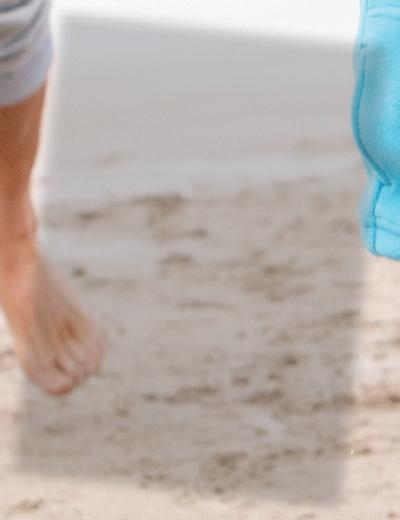
(We’re here Mon–Fri 9am–5.30pm.)
readersdigest.co.uk/equity-release to calculate how much you could release.

This is an equity release plan. To understand the features and risks, ask for a personalised illustration. Unless you decide to go ahead, Equity Release Assured ’s service is completely free of charge, as our typical advice fee of 1.5% of the amount released would only be payable on completion of a plan. Think carefully before securing other debts against your home.
This delicious recipe, which uses four different kinds of ginger along with fruity raspberry vinegar, is the perfect accompaniment to duck. For a thicker sauce, dissolve 1tsp arrowroot in 3tsp cold water, add to sauce and simmer for 2 mins
1. Preheat the oven to a low setting to keep the duck warm later. dry fry the duck breasts, skin sides down, over a moderate heat for about 8 mins, turn and cook for a further 6 mins.
2. while the duck is cooking, peel the fresh ginger and cut it into thin strips. chop the stem ginger and set both aside.
3. trim the leeks, cut them in half length-ways, rinse them well, then
4 boneless duck breasts, about 200g each 20g fresh root ginger
1 piece preserved stem ginger
2 medium leeks
3tbs raspberry vinegar
2tbs stem ginger syrup
225ml green ginger wine
225ml chicken stock
15g butter
salt and black pepper
cut into matchsticksized strips and set aside.
4. transfer the cooked duck to the oven to keep warm. drain off all but a tablespoon of the duck fat. add the vinegar and bring it to the boil, scraping up the brown residue, then add the fresh and stem ginger, ginger syrup, ginger wine and stock. bring back to the boil, reduce the heat and simmer for 8–10 mins until the
liquid has reduced by half.
5. Meanwhile, melt the butter in a small frying pan, add the leeks, season with salt and pepper and stir-fry gently for 3–4 mins until just tender.
6. return the duck breasts to the ginger sauce, reheat for 2 mins, then add salt and pepper to taste.
7. arrange the leeks on a serving dish, lay the duck breasts on top and spoon over the ginger sauce. ■

Be

Q My last attempt at climbing roses was unsuccessful.
Where did I go wrong?
A New stems on climbing and rambler roses need to be spaced out. Use soft garden string to secure vigorous stems to their supports. To promote flowering, it’s best to arch the stems sideways on walls and
trellises, and spiral them around vertical posts. This is also a good opportunity to remove one or two of the oldest branches and replace them with new stems.
Q The moss in my garden is getting out of hand. What’s the best way to tackle it?
A To control moss, you must tackle the underlying causes such as shade, compacted soil and poor drainage. Moss can also build up in wet winters on otherwise healthy lawns and, if left untreated, it’ll smother and eventually kill the grass. The use of a lawn sand—combined moss and weedkiller with fertiliser— saves time and is ideal for the busy gardener. As this product feeds the grass, it’ll recover quickly and grow over the gaps left by the dead moss.
Apply the product on a day when there’s heavy dew, so the chemicals stick to the moss and weed leaves. The moss and other weeds will turn black within five days, but wait until the moss turns brown, which indicates that it’s dead, before raking. Any patches that return to green should be treated again. Collect
and dispose of the dead moss, but not in the compost bin, because the chemical residues will taint its contents.
QI have some sweet peas to plant out this year. How do I go about it?
APosition canes 2.5m long 30cm apart in rows or as wigwams—make sure they are firm. Plant one potful or paper tube of sweet peas next to each cane using a trowel or dibber; water in well. Using a loop of string or sweet-pea rings, secure young shoots to the cane. Once the plants start growing, tie in new growth every two or three days.
QAs spring starts to arrive, I know I should be trimming my privet hedge. What method would you recommend?
AWorking from the bottom of the hedge up, begin by clipping the sides of the privet. Brush off loose trimmings as you go, so you can see the shape properly. It’s traditional to trim the sides to a slight inward lean, so that light can reach the base of the hedge, but an upright profile can also be used. Using a stake and string, clip the top to the line. To eusure a consistent level, trim a wide hedge in two stages, working to the middle from each side.

l Trim winter-flowering heaths and heathers to remove dead blooms and keep plants compact.
l Continue planting containergrown roses. They will benefit from being well established before midsummer.
l Plant new climbers before the weather becomes warm and dry. Spring is the best time to plant evergreen climbers and wall shrubs, and any plants on the borderline of hardiness.

Clematis, a robust climber


Submit your gardening questions at readersdigest.co.uk/contact-us
We kept the steel tubes from our old trampoline and used them as gardencane protectors. Simply knock them into the ground and put the canes inside the tubes, so they don’t rot in the earth. ■
Many thanks to Vivien McLaren of Stoke-onTrent for sending this in.
Send us your gardening tips—with photos, if possible. Go to readersdigest.co.uk/contact-us. We’ll pay £50 if we use them on this page.


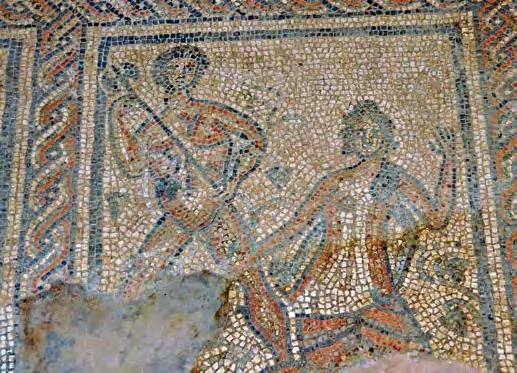
The Isle of Wight’s history won the heart of Alsu Remi (pictured above) from Coventry
Send us a photo of your favourite holiday, tell us briefly what made it so special, and if we include it on this page we’ll pay you £50.
Go to readers digest.co.uk/ contact-us travel With kate pettifer
Last summer, my husband David and I and our three children went to the Isle of Wight for a week. Once the offshore escape of Queen Victoria, the island has lost none of its charm since her days. We stayed in the south of the island, at Ventnor Towers, a lovely hotel on the steep slopes of St Boniface Down with a panoramic sea view. It was the end of July and very hot, so we took every chance to soak up
the sunshine at the sandy beach.
In a few days, we collected so many wonderful memories: a walk at Shanklin Chine with all the magnificent waterfalls, pretty greenery and winding footpaths; a thrilling chairlift ride from the top of the cliff to Alum Bay Beach; and pearl hunting at the Isle of Wight Pearl centre, where we could “pick a pearl” from an oyster. Some of the most memorable visits were to the Alum Bay Glass studio and Hanover Point. The glass-making show was fascinating, revealing how a humble material like sand can be transformed into beautiful things: colourful vases, bowls, cups, plates and animal figurines. At Hanover Point we could follow in the footsteps of the dinosaurs at low tide, when an impressive track of dinosaur foot-casts is exposed in the rock. There are plenty more dinosaur attractions and events on the Isle of Wight too.
On the last day of our holiday we went to Brading Roman Villa, situated in an area of outstanding beauty and boasting incredibly well-preserved Roman mosaics, a huge collection of Roman artefacts and a Roman garden. After learning some interesting history about the ancient Romans, our children dressed up as Roman soldiers and had a go at making their own mosaics. The idyllic surroundings of the villa with the magnificent sea view were so impressive that we’ve decided we’ll have to come back again.
Find out more at visitisleofwight.co.uk and redfunnel.co.uk (ferries). For retro accommodation and Airstream trailers, try vintagevacations.co.uk.
camperbug.co.uk
Hire a retro V W Campervan this year and enjoy a holiday on wheels. This one-stop website for camper vans countrywide can help you do just that, with more than 500 models listed online. Search by location or check out the reviews, then simply send a booking enquiry for your dates. There’s also a Van of the Month post for further inspiration, and the website checks that all the owners are bona fide.

With departures starting in April, Turkey specialist exclusive escapes has introduced Alaçati this season. It’s an old stone village, lovingly renovated over the past decade—eclipsed by brassy neighbour Çeşme, but with the same access to white-sand beaches. Seven nights’ b&b at Alavya in Alaçati costs from £870pp, including return flights to Izmir and transfers (020 8605 3500; exclusiveescapes.co.uk).
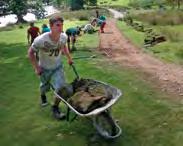
Meet new people, learn new skills, give something back: those are the aims of a National Trust Working Holiday, and this month their 2014 programme launches with some notable new arrivals. You can muck in with lambing season at a Cumbrian fell farm, work behind the scenes at Lindisfarne Castle or help with the restoration at northumbrian Cragside. from £85pp for two nights’ full board (nationaltrust.org.uk/workingholidays). new family trips for this year from exodus include a good-value itinerary to Tanzania in the summer holidays. Their ten-day longleat African safari is designed with tots in mind and combines five nights in Saadani national Park with two nights on the beach in Zanzibar, plus the option to extend your beach stay (worth it if you’re travelling long haul with little ones). from £2,555 per adult (0845 863 9601; exodus.co.uk). ■

Two respected writers take us all the way from the sublime to the slightly silly
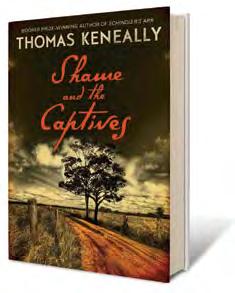
Where did the biggest single escape of PoWs take place during the Second World War? The answer, you may be surprised to learn (I certainly was), is the Australian bush. In August 1944, 1,100 Japanese prisoners stormed the gates of their camp outside the small New South Wales town of Cowra, and more than 500 escaped. It’s an incident that the Australian author Thomas Keneally is old enough to remember—along with the terror in the local area at the thought of all those Japanese soldiers on the loose amid the family farms of backwoods Australia. Now he’s turned the story into a gripping novel that also allows him to revisit one of his favourite themes: how being blamelessly tucked away at the bottom of the world has never been enough to protect Australians from the forces of history.
Keneally is probably still best known for his 1982 book Schindler’s Ark, published in America as Schindler’s List. Yet, as he approaches 80, his novels are, if anything, getting better than ever—and in Shame
BY JAMES WALTONJames Walton writes and presents the BBC Radio 4 literary quiz
The Write Stuff
?

name the author Answer on page 132
Can you guess the writer from these clues (and, of course, the fewer you need the better)?
1. He’s the only writer to have a British football club named after one of his novels.
2. The biggest monument to any writer anywhere in the world is dedicated to him.
3. That monument is in Edinburgh.
and the Captives, he again combines a sweeping narrative with wholly believable characters and individual sentences of quietly devastating authority. In short, Keneally’s Indian summer blazes on.
by Sophie Hannah (Hodder, £12.99; ebook, £12.99) Sophie Hannah is a writer on a roll. Last September, Agatha Christie’s estate announced it had commissioned her to give Hercule Poirot’s little grey cells their first workout since his creator’s death. Three months later, her novel The Carrier was named Crime Book of the Year at the National Book Awards. All of which makes her latest outing something of a disappointment— although, in its defence, only a gradual one.
Hannah has built her reputation on murder mysteries that emerge from sharply recognisable modern life, along with the secrets that most of her characters have been carefully guarding. And for much of The Telling Error, this is precisely—and very satisfyingly— what happens. Hannah’s regular cops are in good form too: their private lives sketched in enough to make them feel like proper human beings, but never so much as to intrude on the page-turning action.
I Am Pilgrim by Terry Hayes (Corgi, £7.99). High-octane spy, murder and bio-attack novel that’s been hailed as the best thriller debut since The Day of the Jackal.
The Little Wonder by Robert Winder (Bloomsbury, £9.99). The 150-year history of the Wisden almanack—and so a complete treat for any cricket lover.
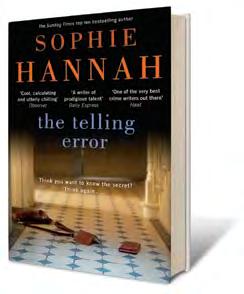
And the Mountains Echoed by Khaled Hosseini (Bloomsbury, £7.99).
Another irresistible piece of epic story-telling from the author of The Kite Runner, this one tracing a globetrotting Afghan family from 1952 to the present day. Perhaps his best novel yet.
Everest: the First Ascent by Harriet Tuckey (Rider, £8.99). Fascinating and totally convincing tribute to Tuckey’s father Griffith Pugh: the man who introduced the sort of professionalism to British mountaineering without which Everest would surely never have been climbed in 1953.
The problem, though, is with the denouement— which, by my calculations, requires no fewer than six people to behave in ways that nobody ever would. In the circumstances, you almost end up feeling sorry for Hannah’s chief sleuth Simon Waterhouse, whose closing psychological summary duly comes across as both faintly desperate and a bit silly.

Bonkers: My Life in Laughs by Jennifer Saunders (Penguin, £7.99). Goodnatured tales of fun and friendship from the woman who gave us Ab Fab
►
Driving a tiny yellow car around India—a densely populated country with no official highway code. What could possibly go wrong?
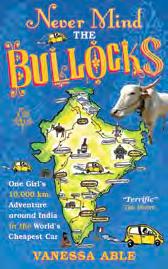
When the Tata Nano hit the Indian market in 2010, the idea was that— like America’s Model T Ford long ago—this would be a car for people who’d never been able to afford one before. It would also be a safer alternative to whole families clinging perilously to the same moped.
But for the travel journalist Vanessa Able, it represented something else too: the first new car costing less than her credit-card limit. For £1,000 she could get herself “624cc of oomph”.
And so she set herself the sort of challenge that can sometimes follow the break-up of a relationship at the age of 33. She would drive a Tata Nano around the edge of India, a country that apparently has no highway code, but does have lots of cattle in the streets. The result was plenty of adventures for her—and an exhilarating, funny and thoughtful travelogue for us. From the remotest rural areas to the shopping malls of Bangalore; from Maoist-bandit country to the old British hill stations of the Himalayas: Able responds to them all with the same winning combination of honesty and enthusiasm.
She’s equally honest about her own romanticism of India. Her starry-eyed view of the beautiful simplicity of its village life, for example, receives a thorough kicking from a business professor who wonders if she’d actually like to live in a place with a strict caste system, but no phones, electricity or running water. (“But…villages are…nice,” is the best Able can do by way of counter-argument.)
The Nano itself, as accessorised with a model of the elephant god Ganesha on the dashboard, also provides an unexpected insight into modern India. By the end of her trip, it’s clear that the car hasn’t taken off in the way the manufacturers hoped—not least because in a country where status is so important, a lot of people don’t want to be seen driving a “poor man’s car”.

InDIa BookS
B ehind the Beautiful Forevers by Katherine Boo (2012) Boo spent three years living in a Mumbai slum, reporting on those who survive on the fringes. The result is an absolutely captivating read that illustrates why hackneyed news stories need to be understood on a far more human level.
White Tiger by Aravind Adiga (2008) A scathingly honest portrait of contemporary India, Adiga’s novel rips through the veil of good manners to reveal the ugliness that underlies power in the country.
For good measure, Never Mind the Bullocks throws in a proper if hesitant love story as well—beginning in classic Bridget-Jones knockabout style when the man she’s invited to join her for part of the journey arrives just as she’s suffering an acute case of Delhi belly.
But we join her here in the southeastern city of Pondicherry, where, with the aid of a local man, Bagalavan, she’s having her car—nicknamed Abhilasha, the Sanskrit for “aspiration” —blessed according to Indian tradition.
And so the ceremony began. The Brahmin started by standing in front of the Nano’s bonnet and applying dots of sindoor [the red cosmetic powder that many married Indian women use to mark their foreheads] on her headlights, number plate and a spot on the windscreen roughly where her forehead should be. Then he circulated his burning oil lamp around to the driver’s door, and dabbed sindoor around the steering wheel and dashboard. He placed a lime underneath the front and back tyres, before moving around to her posterior, where he applied more sindoor dots to her rear lights and number plate. The remaining limes were duly placed under Abhilasha’s left tyres and all that remained was for me to slowly drive forward, thus making limeade with Abhilasha’s treads.
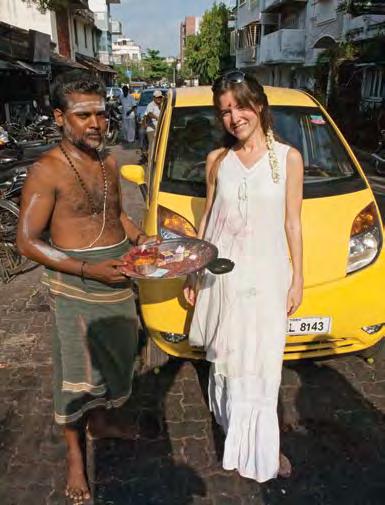
Fully comp? Vanessa with the Brahmin whose blessing would—in theory— protect her car from all accidents
As quickly as it started, it was over. Abhilasha, smoky and powdered, had now officially been blessed and sanctified. Ganesha beamed up at me from the dashboard.
‘Ma’am, you must give him a little baksheesh,’ Bagalavan informed me from over the holy man’s shoulder. I gave him a fifty-rupee note [less than 50p] and he went on his way.
‘So is that it?’ I asked Bagalavan, incredulous that this all-important act of karmic insurance had been so fleeting, simple and, er, cheap.
‘Yes, ma’am. That is all. Now you are safe to drive and you will be protected from all accidents.’
Excellent, I thought.
Never Mind the Bullocks: One Girl’s 10,000 km Adventure around India in the World’s Cheapest Car by Vanessa Able is published by Nicholas Brealey at £10.99
The laundry man’s ironing table hove into view as I felt an almighty scrape. Istoppeddead with a stomachchurningwince
Later that afternoon, I was driving through the narrow lanes of Pondicherry’s Muslim quarter looking for the man with whom I’d left a bundle of washing. As I rounded a corner, I had a weird rush of uncoordination and took the turn too tight. The laundry man’s ironing table hove into view as I felt an almighty scrape. I stopped dead with a stomachchurning wince as I turned to see that I’d rubbed Abhilasha against a concrete lamppost; a bit like a cat would rub against your leg, only to the teeth-clenching sound of grazed metal.
What to do now? I figured that if I kept moving forwards, I’d draw out the scratch even further. Going backwards seemed much more sensible, so I put Abhilasha in reverse.

Another hideous rasping noise. It seemed that my attempts at retracting my imbecilic action had piled stupidity on foolishness.
I looked down at Ganesha, who was as indifferent as the laundry man. Why had this happened? Weren’t we supposed to be protected? Here we were, four hours after our blessing (our fifty-blimming-rupee blessing, I inwardly snapped) and in the midst of our first accident of the whole trip.
And what an accident. This was not one to regale audiences with. There had been no errant rickshaws crossing my path; no buses swerving ferociously into my lane; no drunken lorry drivers falling asleep and taking the Nano head on. It was a bright and sunny day, I’d been driving on an empty road at 10kmph, and I’d scraped the lamppost with all the composure and grace of a p****d vagrant falling against a wall. And then I’d reversed for more.

an D the name of the author I S …
Walter Scott. The football club is Heart of Midlothian (Hearts for short) in Edinburgh, where the main railway station is also named after a Scott novel, Waverley
A Search in Secret India by Paul Brunton (1934) Decades before Westerners travelled in their thousands on the same quest, Brunton journeyed through India in search of spiritual enlightenment. He writes with amazing sincerity for what would then have been quite a sceptical audience.
C ity Adrift by Naresh Fernandes (2013) A “short biography of Bombay” by one of its most loyal but also most critical inhabitants. Opinionated, eloquent and grippingly informative.
C ity of Djinns by William Dalrymple (1993) This book changed my mind about Delhi. Dalrymple, clearly both puzzled and enchanted by the more mysterious aspects of the city—the djinns, the eunuchs, the remnants of the Raj that live on in corners—incited in me a new-found enthusiasm for the darker side of India’s capital.

Gaby Roslin made her name on Channel 4’s
The Big Breakfast in the 1990s and co-presented the BBC’s Children in Need for ten years. She’ll shortly be presenting Food Inspectors on BBC1.
I used to walk around our house singing Kate Bush’s “Wuthering Heights” until my mother suggested I actually read the book. I read it in my bedroom, aged 14, lost in the romanticism and imagining myself on those evocative moors. It felt so grown-up, a magical discovery I didn’t have to share with anyone. It was completely my own and I loved it.

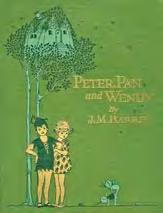
This was my grandmother’s favourite. She’d say “I do believe in fairies!” and the book has taken on an almost mythical status in our family. I remember reading it on my own as a child and getting lost in the fantasy. How I adored Peter and how I longed to be Wendy!
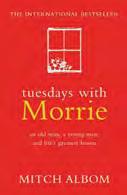
I’ve given this beautiful book to so many friends and told them, “Please read this. It will change your life.” Mitch Alborn’s true story of a young man (himself) interviewing an older man and learning from his philosophy of life is the most thoughtprovoking book I’ve read as an adult. It made me look at the world differently—with more appreciation of how lucky I am. It also reinforced my belief that you should never take people at face value, but look beneath the surface. It’s about the importance of listening, and learning from others.
Reading it as an adult is a different experience: the concept of never growing up, which seems so far off for a child, is such a wonderful idea and reminds us not to take life too seriously. All my family are great believers in holding onto childlike qualities and it’s something I’ve tried to impart to my own daughters.
I have a beautiful first edition, with the stunning illustrations by Arthur Rackham, which I hold very dear. ■







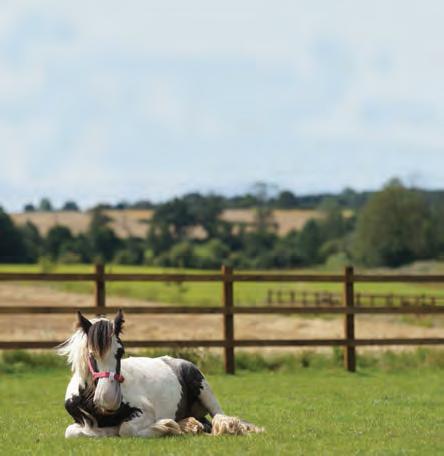












win £50 for every reader’s joke we publish. Email excerpts@ readersdigest.co.uk or go to facebook.com/readersdigestuk
¶ Sherlock Holmes and Dr Watson go on a camping trip. After a good dinner and a bottle of wine, they retire for the night and go to sleep.
Some hours later, Holmes wakes up and nudges his faithful friend. “Watson, look up at the sky and tell me what you see.”
“I see millions and millions of stars, Holmes,” replies Watson.
“And what do you deduce from that?” says Holmes.
Watson ponders for a minute. “Well, astronomically, it tells me that there are millions of galaxies and potentially billions of planets. Astrologically, I observe that Saturn is in Leo. Horologically, I deduce that the time is about 3.15am. Meteorologically, I suspect that we’ll have a beautiful day tomorrow. Theologically, I can see that God is all powerful and that we’re only a small and insignificant part of the universe. But what does it tell you, Holmes?”
Holmes is silent for a moment. “Watson, you idiot!” he says. “Someone has stolen our tent!” Seen at Reddit.com
¶ I used to work in a shoerecycling shop.
It was sole-destroying. Comedian Alex Horne

“ever since he gave up cigarettes he’s been barbecuing 20 times a day…”
¶ a cowboy comes out of the local saloon to find that someone has painted his horse bright yellow. He stands tall, pulls out his six-shooter and kicks open the swing doors.
“OK,” he shouts out, “which one of you stupid cowhands painted my horse?”
An enormous cowhand stands up and fixes the cowboy with glaring eyes.
“Me, and why do you want to know?” he snarls.
“Oh,” said the now-timid cowboy. “I just thought I’d let you know the first coat is dry.”
Joseph William Stokoe, Durham¶ A penguin walks into a bar and asks, “Has my brother been in here?”
“I don’t know,” the bartender replies. “What does he look like?” Seen on the internet
¶ A man finds his seat in the theatre, but it’s a long way back from the stage.
“This is a mystery and I have to watch it close up,” he whispers to the usher. “Get me a better seat and I’ll give you a handsome tip.”
The usher moves him to the
double take


I can’t believe people used to think the earth was flat. Morons! There are hills on it and everything. Craig Scott, West Lothian
I loved the new Richard curtis film called About Time. I hope there’s a sequel so they can call it About Time 2
Comedian Tim Vine ►
Believe it or not, some of these individuals (as pictured at studentbeans.com) actually get work as lookalikes. How many can you identify?*





Twitter feed @Bored_Ghost chronicles the pranks of a middle-class spook with time to kill. (Those of a nervous disposition should turn away now…)
A boy is doing his homework. It’s an essay called, “Do ghosts exist?” He went to the toilet and I wrote, “Yes we do!” I love being helpful.
A man was singing, “I ain’t afraid of no ghost,” so I floated the cat in front of him. Turns out he is afraid.
Just made the man and woman a cup of tea. The woman thinks the man made it and the man thinks the women made it. I never get gratitude. The woman is using the bathroom scales. I’ve pushed down on them so they read 16 stone.
I’m rolling around in a hamster ball I found in the garage. The lady thinks it’s the ghost of their old hamster. Idiot.
The family sat down for dinner. I tried to do that trick where you pull the tablecloth and everything stays still. Turns out I can’t do it.

“If a stick’s got your name on it, there’s nothing you can do…”
oh, the irony! Some of the best examples from heavy.com:




front row and the man hands him 50p.
The usher looks at the 50p, leans over and whispers, “The wife did it.”
Hope Bryan-Lewis, Liverpool
¶ My best friend is smitten by his ophthalmologist girlfriend. She can do nothing wrong in his eyes
Seen at 9GAG.com
¶ A couple are out driving when they see an injured skunk lying on the roadside. They decide to take it to a vet, but they don’t have anything to carry it in.
“I know,” says the husband. “Wrap it up in your skirt.”
“What about the stink?” asks his wife.
“Well, it’ll just have to get used to it,” the husband replies.
Tracy Davidson, Warwickshire
¶ What’s the difference between a well-dressed man and a tired dog? The man wears a full suit, the dog just pants. Seen on the internet
ladies and gentlemen, please welcome seann walsh
favourite one-liner?
“Me and my girlfriend aren’t ready for kids. Which really upsets our kids”—Julian Deane
what’s your favourite part of your routine?
Probably when I’m talking about going upstairs on a bus to find a seat, and there isn’t one. Then looking around and having to go back downstairs. Or you think you’ve seen a free seat and walk down the aisle, but a kid’s sitting there.

seann walsh is currently touring the uK with his critically acclaimed show. for full details, visit seannwalsh.com
what’s your best heckler experience?
I remember a woman who brought a five-month-old baby to a gig in York. I asked her, “Why have you brought a baby to the show?” and a voice from the other side of the room shouted out, “Maybe she was having trouble getting it to sleep, so she brought it out to see you.” Everyone clapped.
favourite tv show?
The Thick of It. I think the number of jokes per episode is just unmatchable. It’s like a top drama that’s absolutely hilarious, which is the perfect package for me.

funniest thing that’s ever happened to you? It doesn’t sound funny, but the time I’ve laughed the most in my life was when I was doing a few shows in Australia with my friend [the comedian] Carl Donnelly. We were looking to buy some temporary pay-as-you-go phones while jetlagged and hungover, and when Carl bought his, he shook the hand of the guy who sold it to him. I was choking with laughter for about 20 minutes. I just thought, Why have you shaken his hand?
finally, who’s your comedy inspiration?
Jim Carrey had a big influence when I was a kid. As for standups, probably Jack Dee, Lee Evans and Stewart Lee. n
Grab a cup of tea and a biscuit and bend your mind to these puzzles, ranging from the mildly puzzling to the pen-chewingly fiendish
number roulette
A number, represented by x, is missing from the outer rim of this wheel of fortune. Which number is x? (Start at the arrow.)
cut from the Same cloth
By using just one cut, divide this fabric into two identical shapes.

Sudoku To win, you have to put a number from 1 to 9 in each outlined section so that:
• every horizontal row and vertical column contains all nine numerals (1–9) without repeating any of them.
• each of the outlined sections has all nine numerals, none repeated.
If you want even more of a challenge, try timing yourself too. difficulty HHH
* Entry is open only to residents of the UK, Channel Islands, Isle of Man and Republic of Ireland aged 18 or over. It is not open to employees of Vivat Direct Limited (t/a Reader’s Digest), its subsidiary companies and all other persons associated with the competition.
A piece is placed on all the numbered squares except for 8. Pieces can be removed only by jumping backward or forward along the connecting lines and you must jump over one piece only, including unoccupied spaces. For example, 3 can jump over 5 and land in 8, thereby removing 5; or 6 can jump over 7 to land on 8. The objective is to remove every piece from the board except for one, which
must finish in the central position, 8. What sequence of moves will achieve this goal?
(Write down your work.)
4 to 13 and, finally, 16 to 8.
10 to 16, 15 to 6, 1 to 3, 3 to 8, 13 to 4, 6 to 8,
continue 4 to 13, 6 to 8, 9 to 7, 3 to 8, 12 to 5,
16 over 13 into 8 (thereby removing 13), then
(the numbers refer to the 16 numbered squares):
of eliminating all the pieces except one, in the central position. Here’s one way to get there
You’ve succeeded when you reach the objective
neo player only:
Sudoku: If you solved it within: 15 minutes, you’re a true expert; 30 minutes, you’re no slouch either; 60 minutes or more, maybe numbers aren’t your thing.

utc from the same cloth:
116 - 6 + 10 = 120, 64 - 10 + 1 = 55.
X = 64. 17 - 3 + 6 = 20, 81 - 6 + 8 = 83,
umbern roulette:
FOR MORE puzzles…
(answer published in the may issue)
Which of the four boxed figures completes the set?
The first correct answer we pick on March 28 wins £50!* Email excerpts@readersdigest.co.uk
answer to february’s prize question:
A yellow square is missing. Each square group of four shapes must have at least one yellow square, one red star and one blue circle. Each of the groups of four shapes surrounding the middle gap is missing a yellow square.
and the £50 goes to… Hugh O’Rourke from Hampshire £50 prize question
go to readersdigest.co.uk/ fun-games


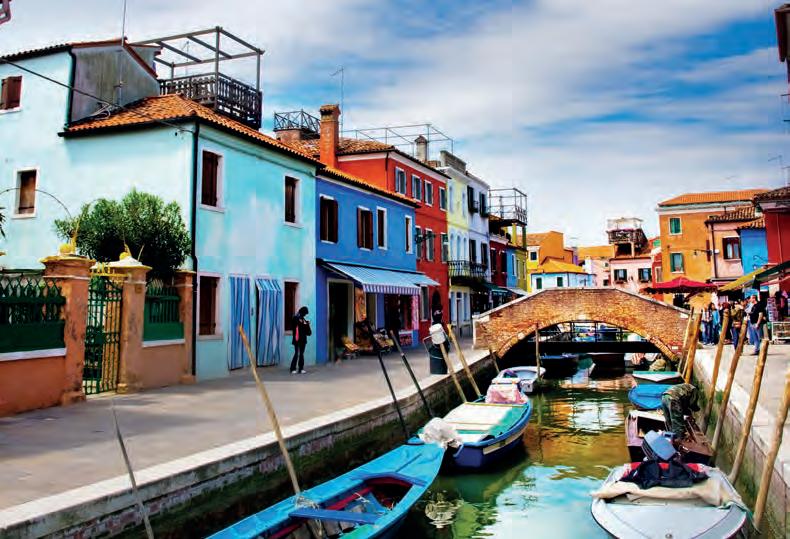



w
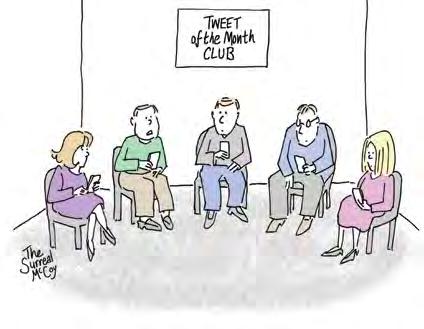
Think of a witty caption for this picture and you could beat the experts at their own game. The three best suggestions will be posted on our website in mid-April alongside an anonymous caption from our professional cartoonist. Visitors can choose their favourite—and if your entry gets the most votes, you’ll receive £100 and a framed copy of the drawing. Submit to captions @readersdigest.co.uk or readersdigest.co.uk/ caption by April 4. Vote online at readersdigest. co.uk/caption. We’ll announce the winner in our June issue. n
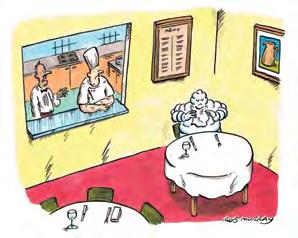
This year is already looking bleak for the professionals. Cartoonist Rob Murray’s “I just thought their inspectors would look more anonymous” was obliterated in the popularity stakes by reader Bryan Ingle’s contribution, “And he was complaining that our prices were inflated!” Ever thought of a career change, Bryan?
scoreboard readers 19 cartoonists 7

In next month’s issue
Laughter speciaL: Terry Jones revs up for the first Monty Python live show in 32 years
• 100-Word Story Competition—the winners!
• The easiest way to lose weight
• Frank Gardner shares his fondest memories
PLUS Check out our new look




Thousands of women worldwide have discovered that Menopace® provides comprehensive nutritional support, specially formulated by Vitabiotics’ experts for during and after the menopause.
Menopace® Original Tablets is the original combination of micronutrients including vitamin B6 which contributes to the regulation of hormonal activity.
Menopace® Plus Botanicals provides the benefits of Menopace® Original plus a botanical tablet providing soya isoflavones, sage and green tea.
Menopace® with Calcium is a convenient all-in-one formula with calcium, vitamin D and magnesium, which contribute to the maintenance of normal bones.
Menopace® Night includes all the nutritional support of Menopace® Original, plus chamomile, hops extract and 5-HTP.
Menopace® Red Clover provides 40mg of Menoflavon® isoflavones. Ideal taken alongside any other product in the Menopace® range.




